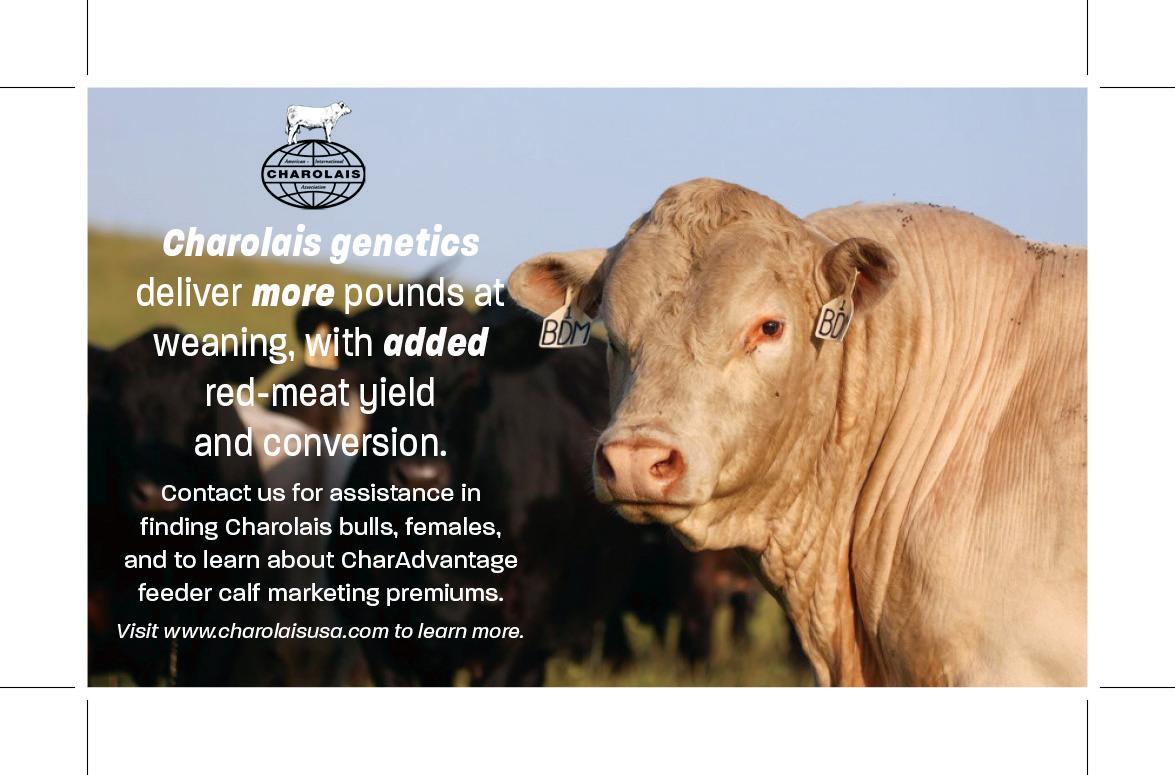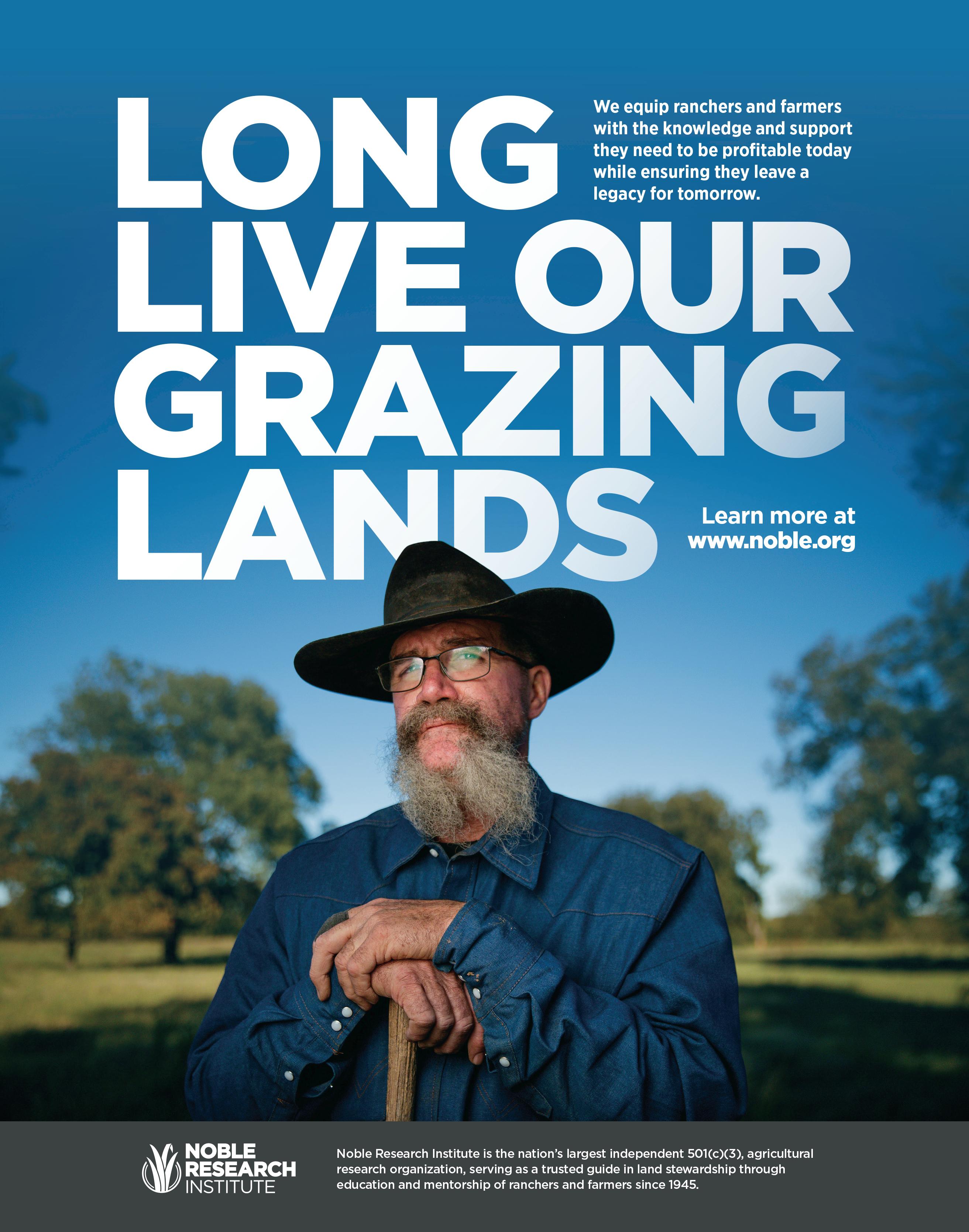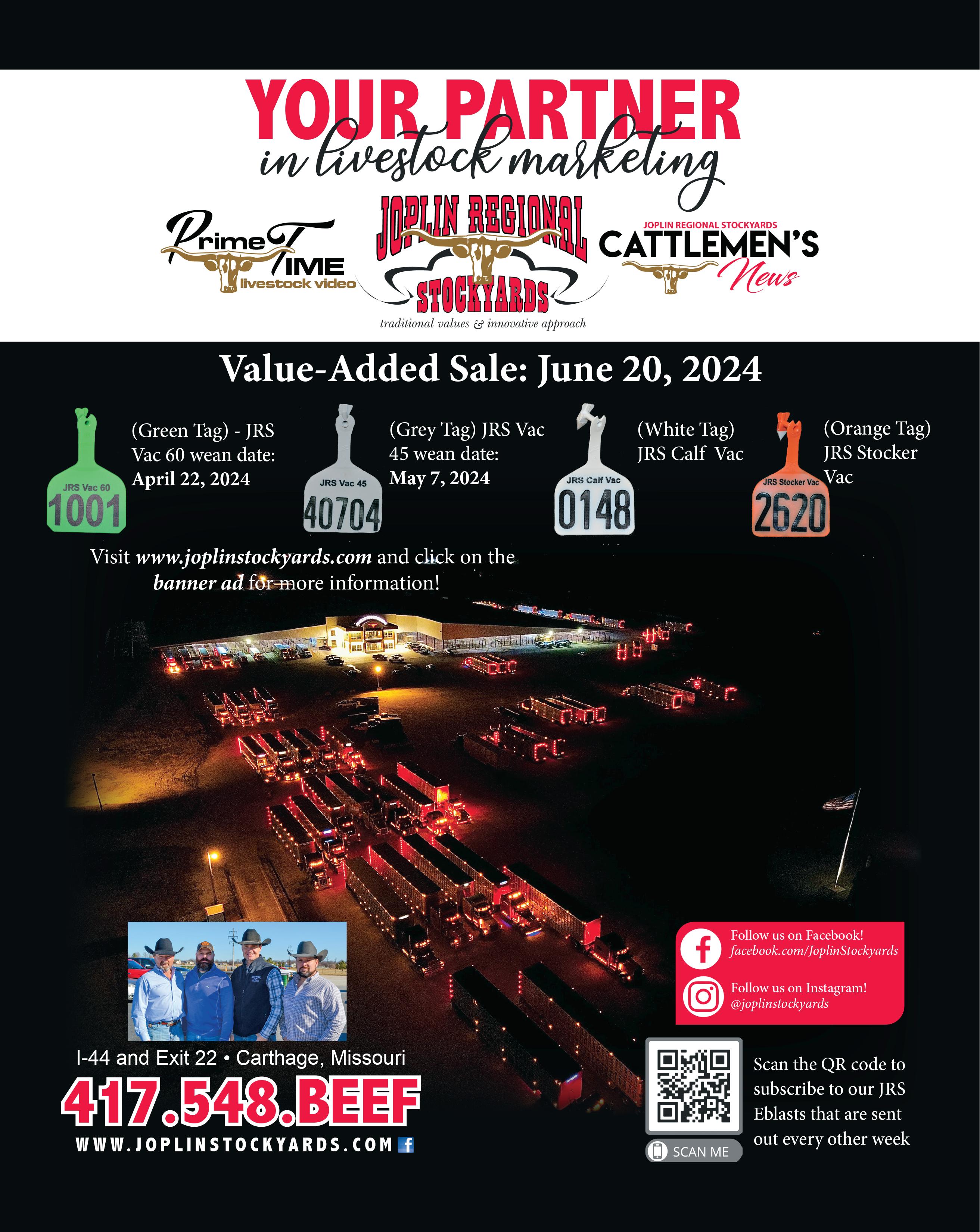
















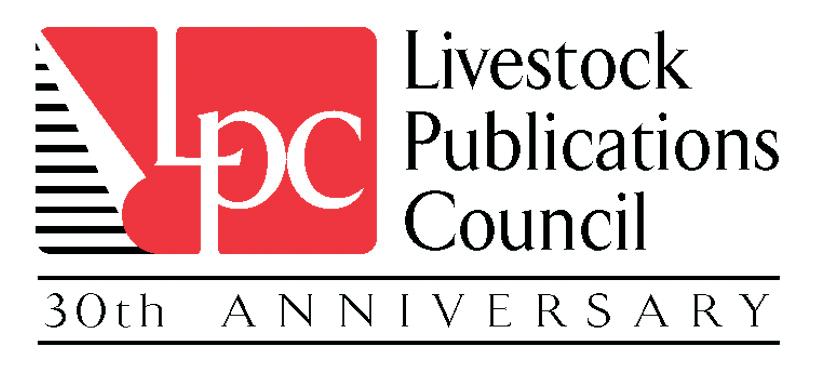
Volume 53 - Issue 4 (USPS 890-240 •
Magazine Publishing Office
2306 Bluff Creek Drive, #100, Columbia, MO 65201
Phone: 573-499-9162 • Fax: 573-499-9167
Andy Atzenweiler: Editor/Production/Ad Sales P.O. Box 480977 • Kansas City, Missouri 64148 816-210-7713 • E-mail: mobeef@sbcglobal.net
Missouri Cattlemen’s Association
MCA Website: www.mocattle.com
Mike Deering, Executive Vice President - Ext 230 Mike@mocattle.com
Courtney Collins, Manager of Membership– Ext 231
Courtney@mocattle.com
Aly Francis, Manager of Strategic Solutions – Ext 235 Aly@mocattle.com
Lisa Stockhorst, Administrative Assistant – Ext 234 Lisa@mocattle.com
Missouri’s Cattlemen Foundation
www.mocattlemenfoundation.org
Missouri’s CattleWomen http://mocattle.com/missouricattlewomen.aspx
Chuck Miller, President
573-881-3589 • 393 Spring Garden Road, Olean, MO 65064
Jeff Reed, President-Elect 903-279-8360 • P.O. Box 35, Williamsville, MO 63967
Anita Vanderwert, Vice President 573-808-3000 • 4902 Conchero Ct., Columbia, MO 65203
Marvin Dieckman, Treasurer 660-596-4163 • 28998 Hwy JJ, Cole Camp, MO 65325
Charlie Besher, Secretary 573-866-2846 • RR 5, Box 2402, Patton, MO 63662
Region 1: Ethan McNeill, 325 McMurry St. Paris, MO 65275 636-544-9943
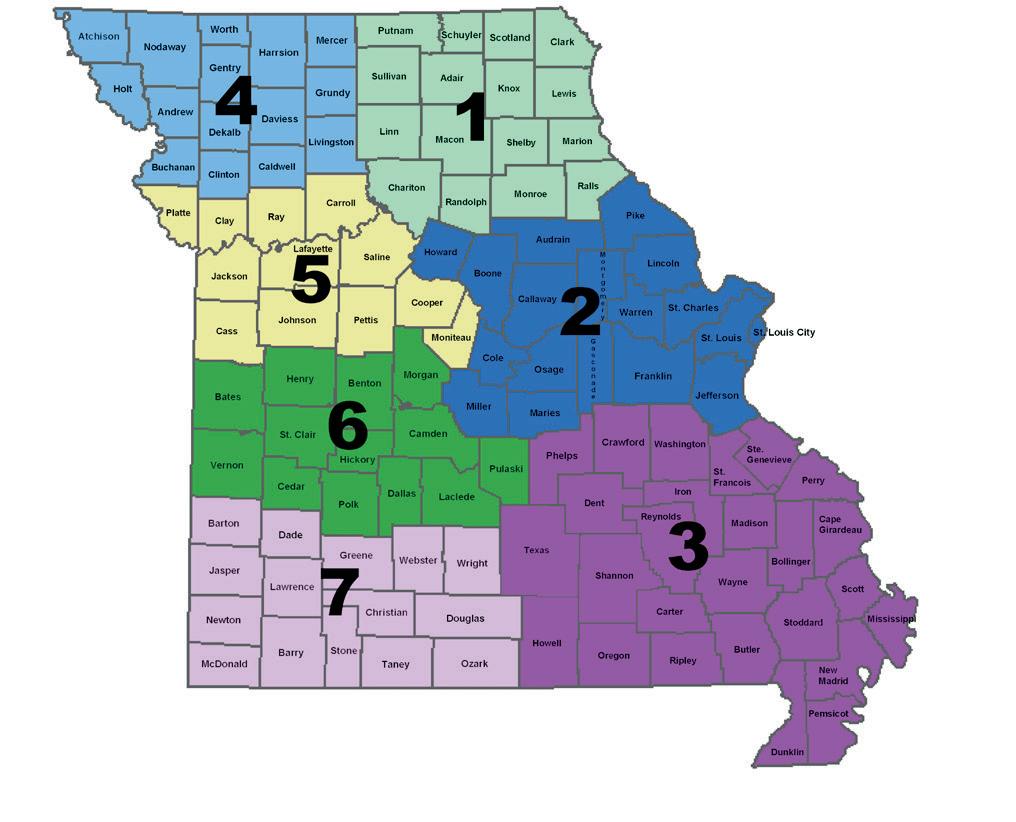
Region 2: Blake McDonald, 250 Clonts Rd. Sullivan, MO 63080 • 573-205-7914
Region 3: Blake Crow, 1910 W. Broadway St., West Plains, MO 65775 • 417-293-9525
Region 4: Deb Thummel, 12601 Hwy. 46 Sheridan, MO 64486 • 660-541-2606
Region 5: Alex Haun, 1031 SW 600 Rd Holden, MO 64040 • 816-345-0005
Region 6: Warren Love, 8381 NE Hwy ZZ Osceola, MO 64776 • 417-830-1950
Region 7: Josh Worthington, 401 N. Dade 231 Dadeville, MO 65635 • 417-844-2601
It is almost time for the “can’t miss” weekend of the summer. The weekend will include both the 41st Annual MCA All-Breeds Junior Show and the MJCA Replacement Heifer Show & Sale. The expo will feature long-held traditions such as the MJCA Photo Contest, MJCA board interviews and elections, and the MJCA annual meeting while also bringing in new opportunities for junior members to feature their hard work at the state level. To learn more about both events, please turn to PAGES 29-35 or visit mocattle.com under junior programs.
The Cattlemen’s Steak Fry will be held on Saturday, June 8. Join us for a great steak dinner, raffles, live and silent auctions, and great conversation. You’ll find the details in this month’s magazine and on our website. This event is open to the public and we welcome any and all people who wish to celebrate Missouri’s beef industry. Funds raised will benefit the MCA Political Action Committee to help elect leaders who understand and value agriculture to guide our state’s policy, now and in the future. For more information and registration instructions, see PAGE 33.
The 2023 Top Hand awards have been announced. Five levels of awards will be offered to members that have recruited 3, 5, 10, 20 and 50 new members to the association. Each of these levels is accompanied by a certificate that is good towards items in the MCA General Store, 2025 Missouri Cattle Industry Convention & Trade Show registration, or toward the purchase of steak fry silent/live auction items, and/ or convention silent/live auction items. To learn more about the 2024 Top Hand program, see PAGE 84.
We are partnering with Show-Me-Select again this year for an exclusive new member promotion drawing. All new Missouri Cattlemen’s Association member will be entered to win in a drawing for a $2,000 credit to a Show-Me-Select Replacement Heifer sale. To be considered a new member, you must not have been an MCA member within the last 12 months. Credit must be redeemed in the same calendar year at any of the spring or fall sales. Learn more on PAGE 76.
We are excited to be working with Merck Animal Health on the Cartridges for Cash program to raise funds for our association’s junior programs. We want to challenge our affiliates to a competition. The group that collects and turns in the most cartridges will win a $1,000 scholarship to award to a junior member of their choice. Each county should collect the Ralgro wheel and Revalor cartridges used by their members and bring them to either one of the Board of Director’s meeting held each quarter or to the annual convention in January. We will keep a tally of the cartridges collected from each county throughout the year and the winner will be announced at the 2025 Missouri Cattle Industry Convention & Trade Show after all cartridges are counted. To learn more about the Cartridges for Cash program, see PAGE 65.



Allison Eifert, Jackson, MO
Alyson Alcantara, Warsaw, MO
Andrew Wiskirchen, Ewing, MO
April Miller, Belzer Farms, Browning, MO
Brandon Binkley, Henley, MO
Brian Heldenbrand, Cameron, MO
Bryan & Kaci O’Kane, Linneus, MO
Cecil Cunningham, Urbana, MO
Craig Brace, Audrain County Health Department, Mexico, MO
Curtis Warfield Jr., Fulton, MO
David Martin, Kansas City, MO
David Rose, Piedmont, MO
Dawson Henke, Salisbury, MO
Dean Sayre, Purdin, MO
Don Ely, Hartville, MO
Donald & Mary Burkert, Savannah, MO
Eddie & Tammy Robinson, Wellsville, MO
Edward Cole, Houston, MO
EJ Estabrook, Braymer, MO
Emma Shouse, Weston, MO
Ethan Broshuis, Leopold, MO
Gary Veltrop, Veltrop Farms, Meta, MO
Gina Ross, Ross Cattle Company, Summersville, MO
Grady Binkley, Henley, MO
Grant Commer, Whitewater, MO
Heather Holden, VIP Properties- Double Donkey Ranch, Houston, MO
Jacob Rogers, FCS Financial, Laclede, MO
Jake Owen, Owen Farms, Maysville, MO
Jake Cussen, Maryville Livestock Auction, Maryville, MO
Jamie Salvator, Wright City, MO

Hwy 42 West • Vienna Missouri 65582
45 Miles South of Jefferson City
Selling All classes of Cattle Wednesday • 10:00 a.m.
Featuring ‘Star-Vac Program’ Cattle Weekly DVAuction Service for convenient online viewing & bidding
For More Infor mation Call…
David Patton Of fice Ross Patton Bill Patton 573-308-6655 573-422-3305 573-308-6657 573-308-6658 Visit our website: www.scrsvienna.com or E-mail us: scrsvienna@gmail.com
“Make South Central your Livestock Market”
Jan Watson, Watson Farms- VIP Properties, Houston, MO
Jeff & Kelly Smith, Running S Ranch, Licking, MO
Jess Clayton, Walnut Shade, MO
Jim Reed, Desloge, MO
Jody Ownes, King City, MO
Jon Lenz, Double L Cattle LLC, Bunceton, MO
Joseph Anderson, Smiling Bovine Ranch LLC, Cabool, MO
Josh Mack, Meadville, MO
Kayden Keller, Summersville, MO
Kevin Politte, Kevin Politte Farm Bureau Insurance, Festus, MO
Kevin Schieber, Ravenwood, MO
Lance Trankler, Trankler Acres, Burfordville, MO
Larry Stiens, L & C Stiens Farms Inc, Maryville, MO
Leah Frerking, Higginsville, MO
Lily Thiele, Cabool, MO
Louise Rackley, Mt. Grove, MO
Lucas & Kayla Wright, Marceline, MO
Maggie Wolfe, Wolfe Farms, Bucyrus, MO
Mark & Melissa Mitchell, M2 Cattle Co., Licking, MO
Mary Elizabeth Coleman, Arnold, MO
Matt Hess, Maryville, MO
McKenzie McDonald, Seneca, MO
Michael French, ML Farms LLC, Frohna, MO
Monica Escamilla, Creek House Cattle Company, Miller, MO
Natalie & Kevin Ficken, Ionia, MO
Nicole Ghirardi, Ghirardi Agency, Hillsboro, MO
Owen Pratt, Nerren Pratt, Chattanooga, TN
Randy Koch, Bucyrus, MO
Rhonda Werdehausen, NRW Farms, Holts Summit, MO
Ricky Ray, Aurora, MO
Ruth Haneline, Licking, MO
Shannon Timm, Booneville, MO
Sharon & Jeff Blackburn, Wentworth, MO
Shawn Booker, Licking, MO
Stephanie Sims, W6 Family Farms, Willard, MO
Steve Leonard, Conway, MO
Sydeny Becker, Cumberland, IA
Tanna Binkley, Henley, MO
Tim Jackson, Jackson Farm, Piedmont, MO
Travis Fenical, Blackwater Ag. Supply, Blackwater, MO
Willie & Erin Howe, Wheeling, MO
Zach & Tammy Williams, Norwood, MO
Zakary Rapp, Nevada, MO
See the MCA Membership Form on page 77

“I have lived, life in the fast lane. You’ve got to watch your back and look both ways. When it’s said and done, the time we have is borrowed. You better make real sure, you’re headed the right way.”
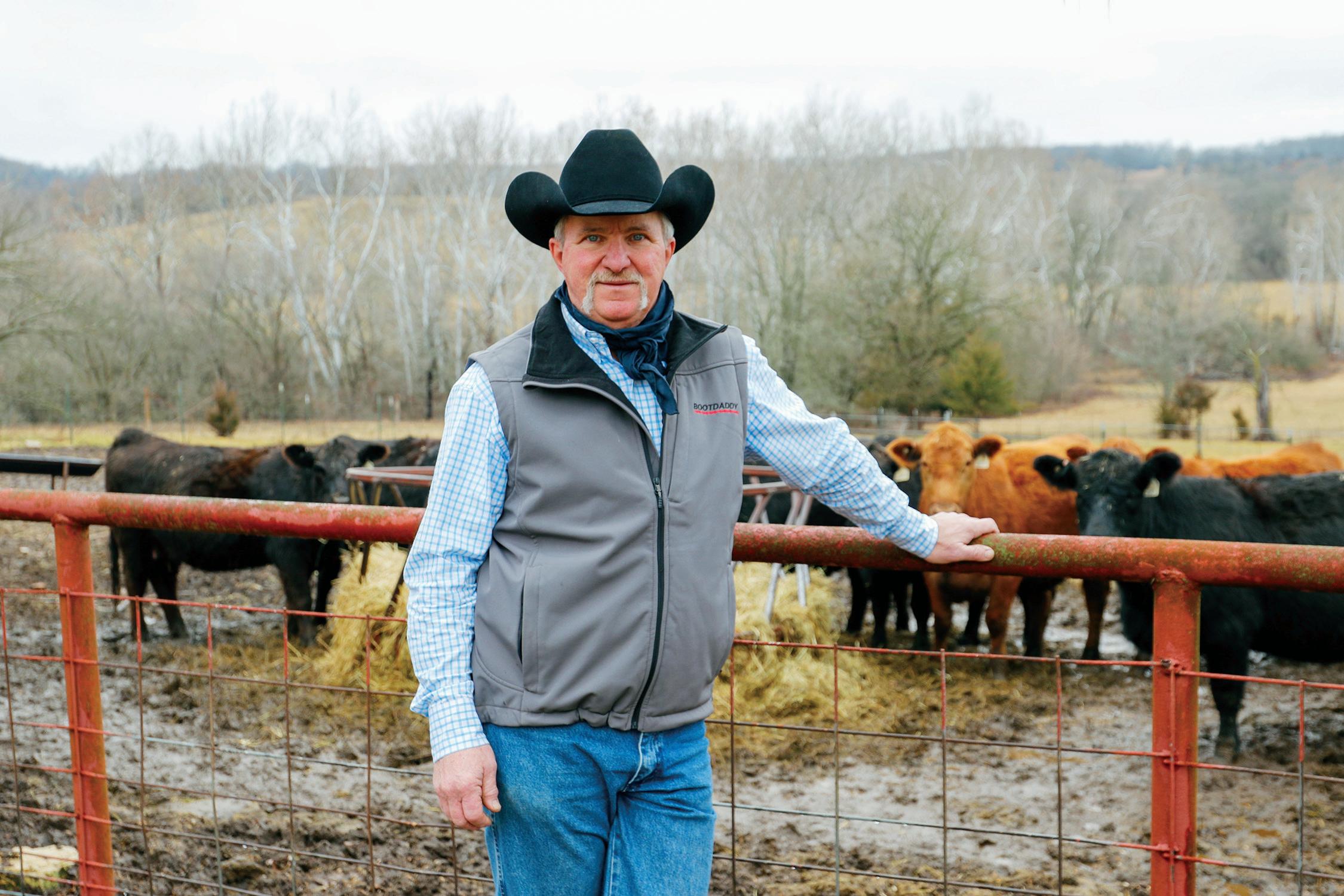
If you have not guessed, that line is borrowed from the group Sawyer Brown’s hit song, “The Dirt Road.” Please read on…
As you read this article, perhaps your grass is greening up or that small grain crop has grown enough to graze, and you are not feeding as much hay as you were a few weeks ago. Perhaps you are beginning to make serious decisions on what sires to use heavily or sample this spring for breeding season. We’ve got a few items planted in our garden already and have more things to plant as time allows. In addition, you might be preparing to plant corn. Many producers are working the ground as they prepare for the growing season.
Here at home, we are synchronizing heifers and getting fall calves weaned, vaccinated, and backgrounded. The fall-calving cows have been pregnancy checked and culled accordingly and turned out to pasture. We are preparing for our son’s high school graduation and our daughter’s study-abroad trip to New Zealand with the University of Missouri this fall. We will have an empty nest and it’s coming way too soon.
Missouri Cattlemen’s Association members worked hard all winter and spring in Jefferson City making strides to ensure that your association is in its best position moving forward. Thanks to each MCA member who has taken the time to attend Cowboys at the Capitol each Wednesday during legislative session. Your last chance is April 24. If you cannot make it, please look forward to next year and choose to be as engaged as possible as we will have a new administration in the Governor’s office. We will be closely watching and engaging on the national stage as we elect a president and see whom will represent our interests in the U.S. Congress and Senate for the next session. Our 21st Annual Cattlemen’s Steak Fry is June 8 at the Missouri
State Fairgrounds Agriculture Building beginning at 5:30 pm. We’d love to have a huge turnout of members and legislators.
MCA is hard at work in the discussions concerning animal identification. At the National Cattlemen’s Beef Association Convention in February, MCA worked to ensure the final decision was more palatable to the beef producers in our state. If our industry is faced with a crippling disease outbreak, a well thought out and user-friendly animal identification system will be a blessing to our industry.
Next month, we will be celebrating “May is Beef Month.” If you have not already done so, please contact the Missouri Beef Industry Council to discuss options on promotional activities or materials and they will be able to assist you. Please take the time during May to participate or sponsor an activity highlighting the beef industry. It always means more to consumers when they have an opportunity to speak directly to farmers and ranchers about the food they consume.
With the exception of living on campus for a couple years while attending college at MU, directions home have always included, “when you turn off the paved road.” Whether we live on dirt or paved roads, as Missouri cattlemen and cattlewomen, our rural perspectives and actions are critical to the future of the beef industry.
Until next month….
“I’ll take the dirt road, its all I know. I’ve been walking it for years. Its gone where I need to go. Oh, it ain’t easy, it ain’t supposed to be. So I’ll take my time, and life won’t pass me by ‘cause its right there to find, on the dirt road.”
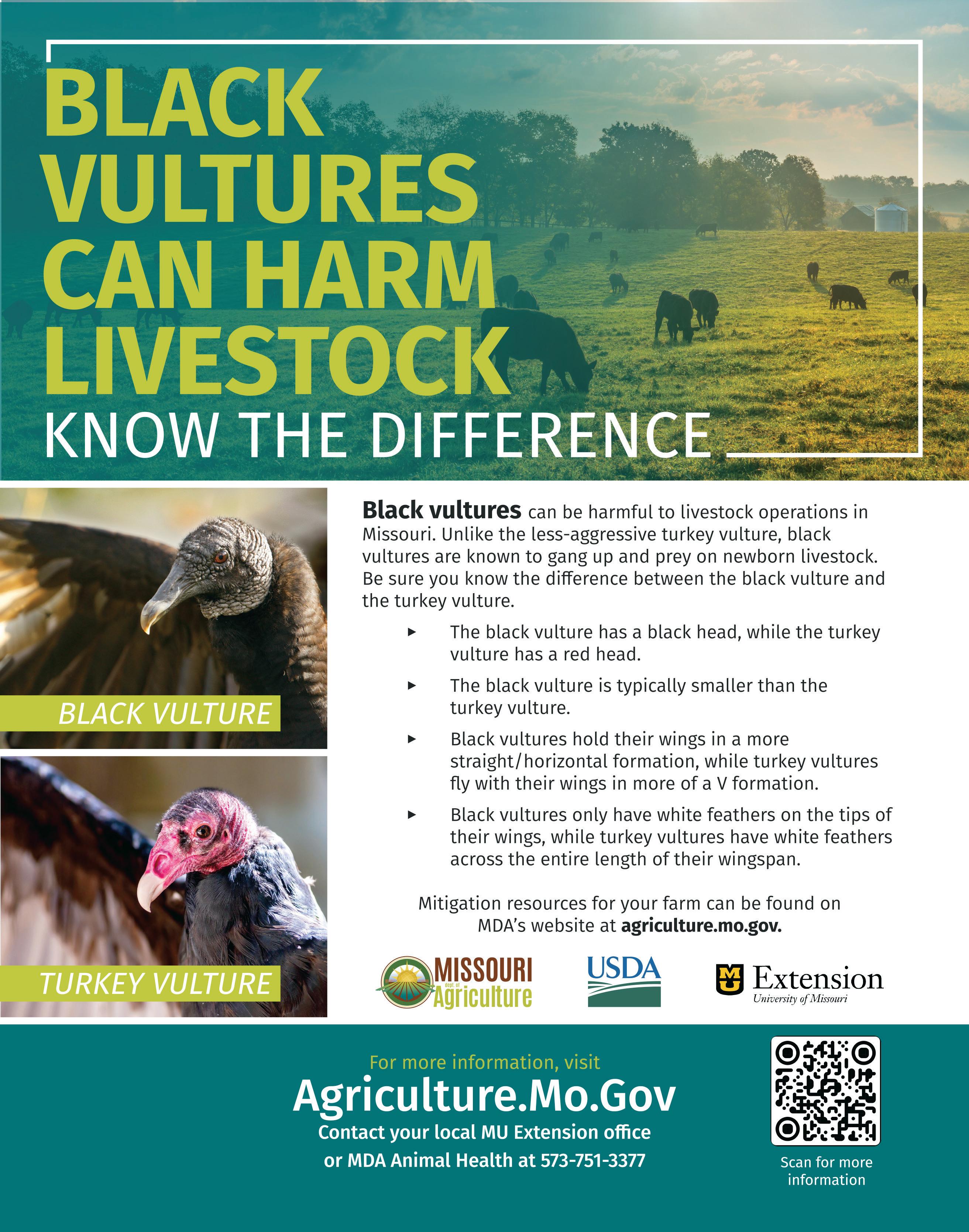


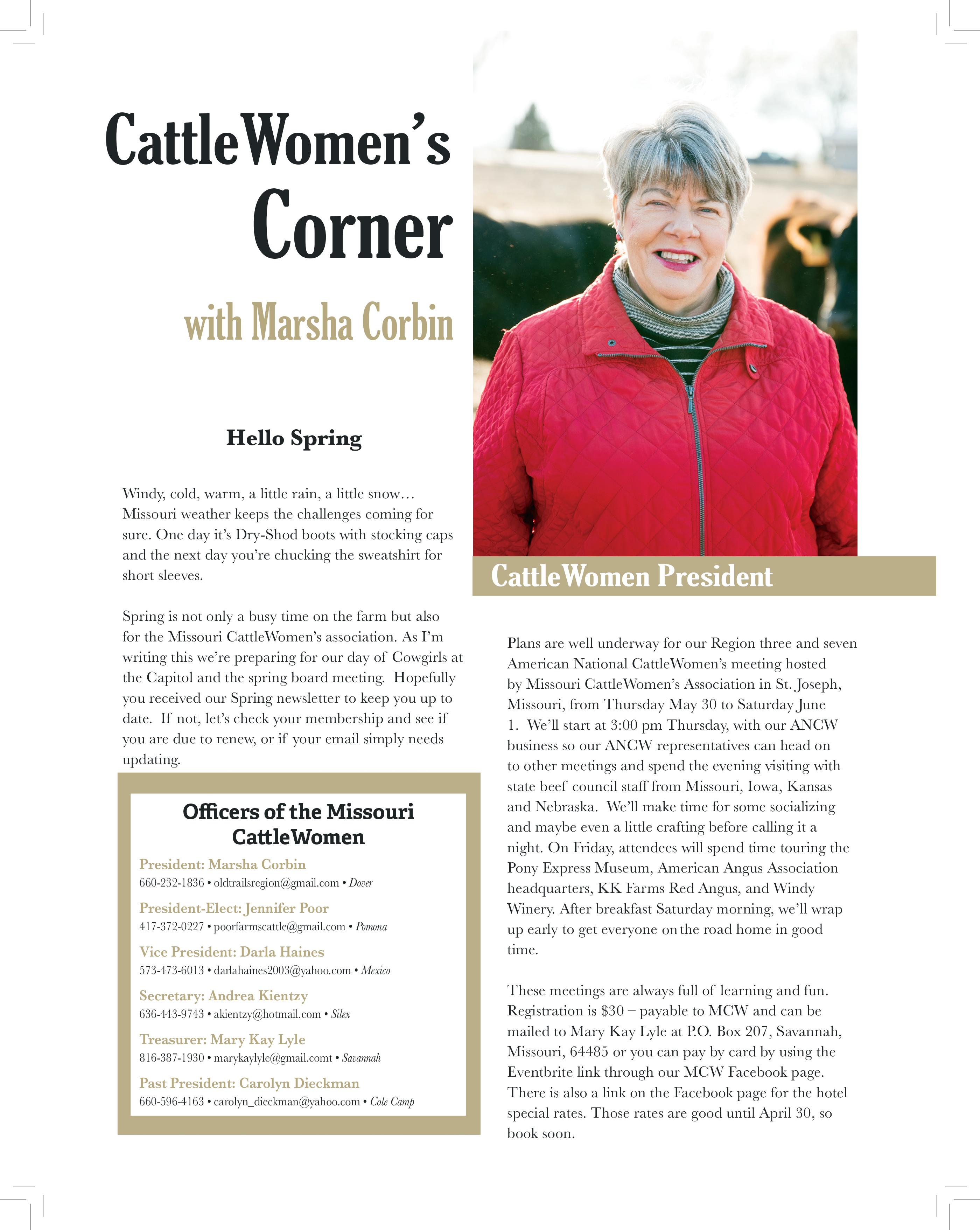
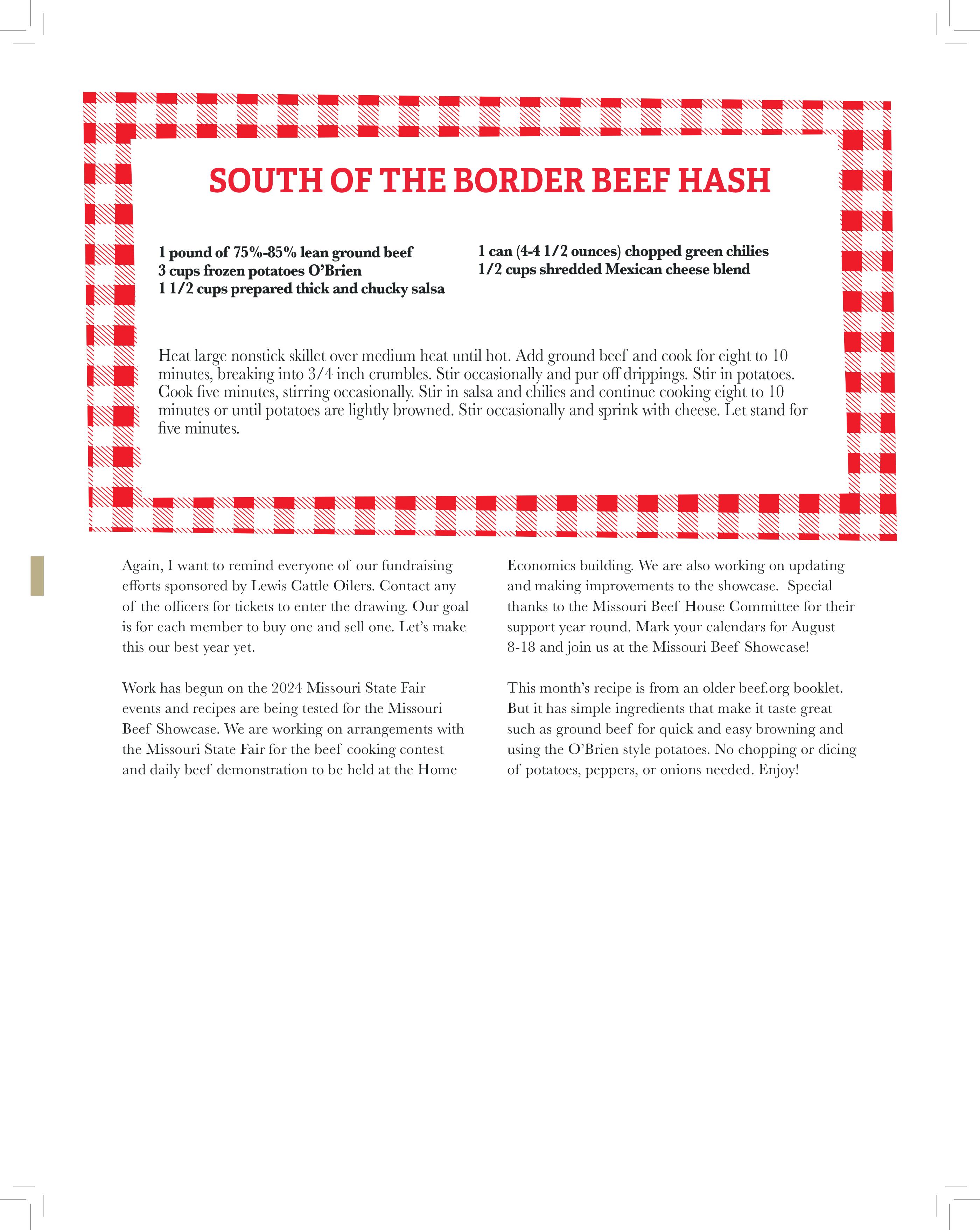








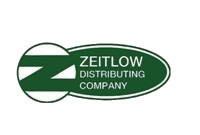




When you get an e-mail on a Saturday morning from the CEO of the National Cattlemen’s Beef Association announcing a conference call for later that day with state affiliates to discuss an “emerging animal health issue,” you get a little nervous. I remember 2003 when we had the cow in Washington State that stole Christmas as bovine spongiform encephalopathy was first detected. You never know what to expect.
The call centered on dairy cows in Texas, New Mexico and Kansas where older, lactating cows were becoming ill, reducing feed intake, and producing a thicker, colostrum like milk. On March 25, more than a week later, we learn the cows have tested positive for highly pathogenic avian influenza. That left me wondering how that’s even possible. Coincidentally, Brownfield News reported the exact same day that HPAI was discovered in U.S. livestock for the first time, but it was goats in Minnesota.
The good news was initial testing by the National Veterinary Services Laboratories found no changes to the virus that would make it more transmissible to humans and there was no risk to the commercial milk supply. USDA noted that pasteurization has continually proven to inactivate bacteria and viruses, like influenza, in milk. As some legislators in Missouri advocate for reducing restrictions on the retail sale of raw milk, this situation proved that MCA’s policy on the matter is rooted in science.
The other good news was that the virus is not transmissible from cow-to-cow. While this is still an
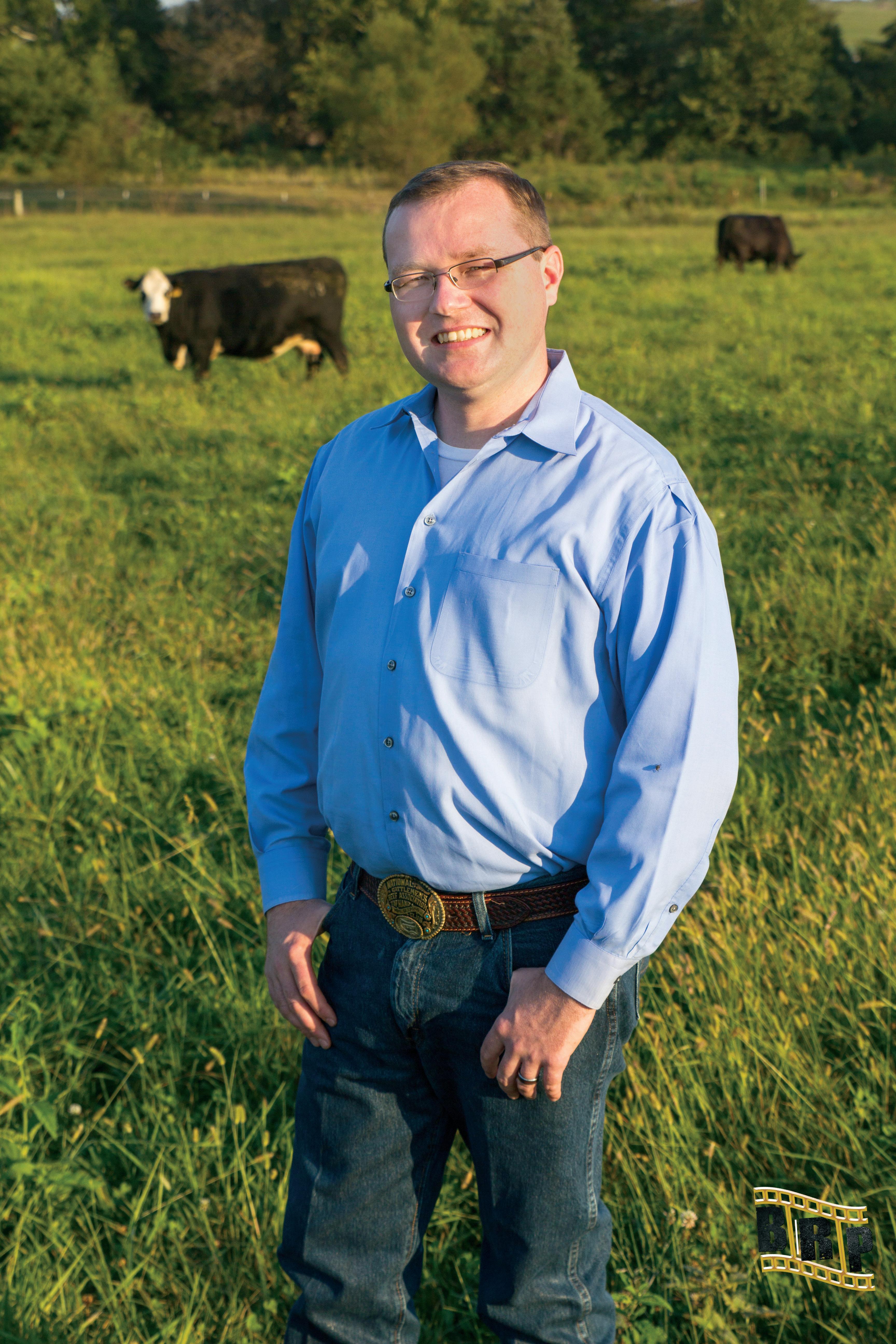
The NCBA issues management team is phenomenal at quickly tracking and addressing a slew of industry issues as they arise. There is no other national organization more on top of emerging livestock issues. Their work helps us here at the state level to better communicate with members, legislators, media, agency officials and others about what is happening, which often prevents an issue from becoming a crisis.
The other noteworthy point from all of this is the need for more rapid testing and diagnostics. This issue made clear to me that MCA made a sound decision last year in securing significant state funding for a diagnostics laboratory at the University of Missouri to put our state on the forefront of preventing and managing an animal disease outbreak. I am convinced a strong emphasis on quickly testing and identifying illnesses will do more to avert a crisis than any government mandate ever could.
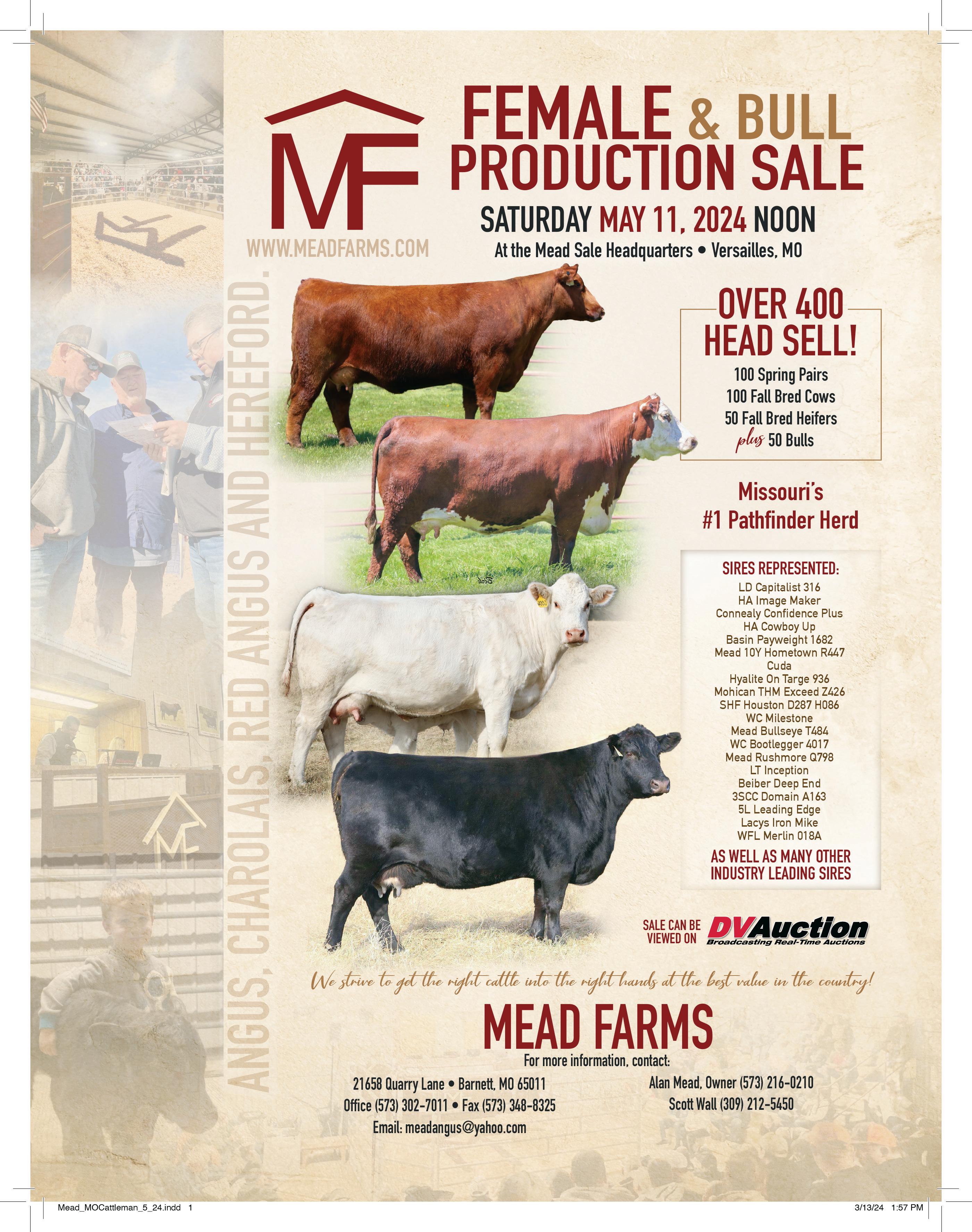


In case we haven’t met, my name is Ethan McNeill, and I am the newly elected Region 1 Vice President for the Missouri Cattlemen’s Association. I am also the secretary for my county affiliate, Monroe-Shelby County Cattlemen’s. I developed my passion for the cattle industry working on my parents’ cattle operation in O’Fallon raising and selling farm-fresh locker beef around the St. Louis area. I knew from a young age I wanted to have an operation of my own.
As I got older, I realized that between crop farmers and the urban sprawl of St. Louis, the only chance for me to run my own cattle operation would be to move away from home. After I graduated college in 2018, I started working for TPNB Bank in Paris where I am now a loan officer assisting customers with their agricultural operations. Then in 2020, I started my own herd which is where I spend most of my evenings checking cows, fixing fences, or repairing things. Most of this is done by the headlights of my four-wheeler, but thankfully the days are getting longer and I get to see my cattle during the daylight again. With all that being said, I look forward to meeting you at future events and bear with me; I’m a banker, not a writer!
Thankfulness is the main point I wanted to use this platform to talk about. Though some days it might not seem like luck, we are able to be out in God’s creation tending to his animals and helping to feed and clothe the world. We have one of the most rewarding jobs in the world. There is no industry more important to sustaining life on this planet.
Region 1 VP - Ethan McNeill
Region 2 VP - Blake McDonald
Region 3 VP - Blake Crow
It would be naive of me to think this mindset of thankfulness has not been brought out in large part due to the ebbs and flows of my last two weeks. Last Monday, I took calves to the sale barn, and I’m not sure if you have noticed, but the cattle market is doing pretty well right about now. The last four years, my least and most favorite day of the year has been sale day. A year’s worth of money, blood, sweat and tears comes down to about three minutes. While these days are rewarding, they can also be gut-wrenching. The markets current position has made the fruits of our labor more abundant.
Now, I do realize that there are still plenty of things to be concerned or cautious about, such as continued rains throughout the growing season to replenish the soil and refill ponds and the uncertainty surrounding the cattle markets. However, we sometimes need a reminder to take a step back, breathe and just look at the blessings that God has given us.
Lastly, I would like to remind you that you are a part of one of the most important grassroots organizations in the state. We are here to preserve and enhance the cattle industry, and the best way you are able to do that is by being involved. This could mean joining your county board to help plan local events, seeking out a leadership role at the state level or by participating in the weekly Cowboys at the Capitol event that happens every Wednesday during the legislative session in Jefferson City. We are here to serve you. If there is anything I can do to help, please feel free to reach me at (636) 5449943.
Region 5 VP - Alex Haun
Region 6 VP - Warren Love
Region 7 VP - Josh Worthington
Region 4 VP - Deb Thummel At-Large Rep. - Jack Davis
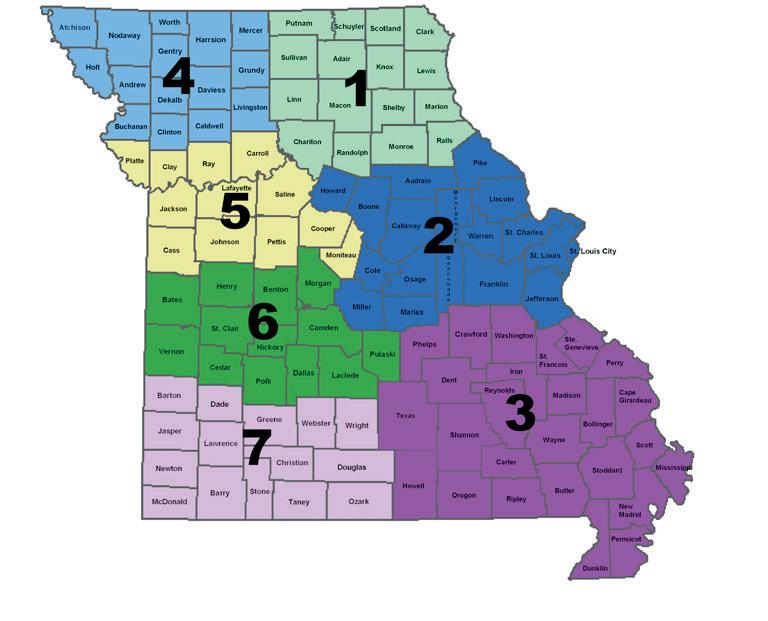
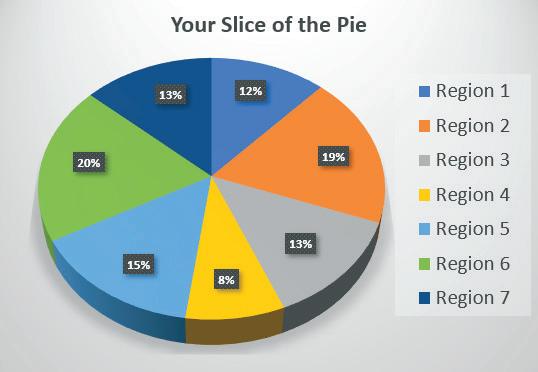
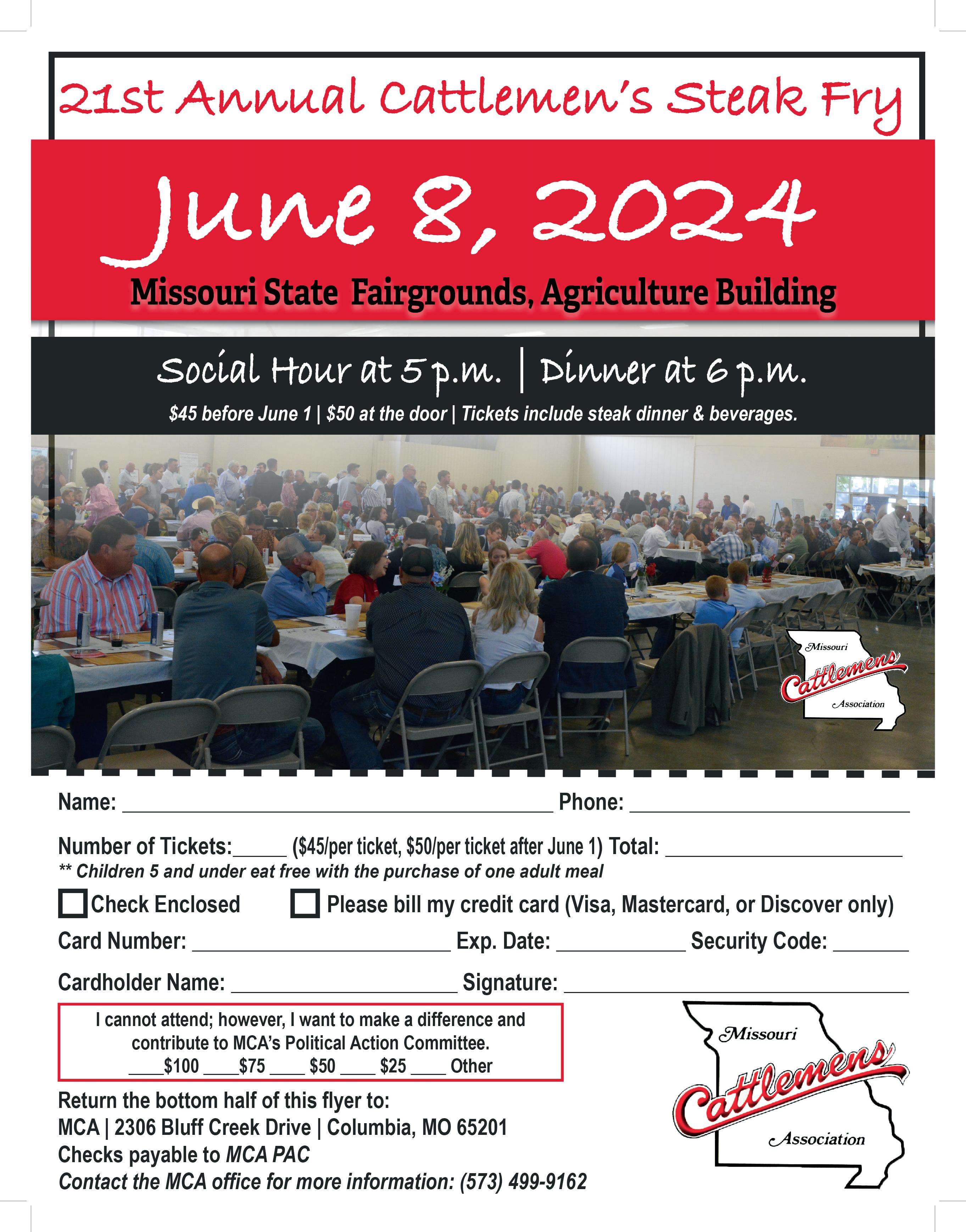
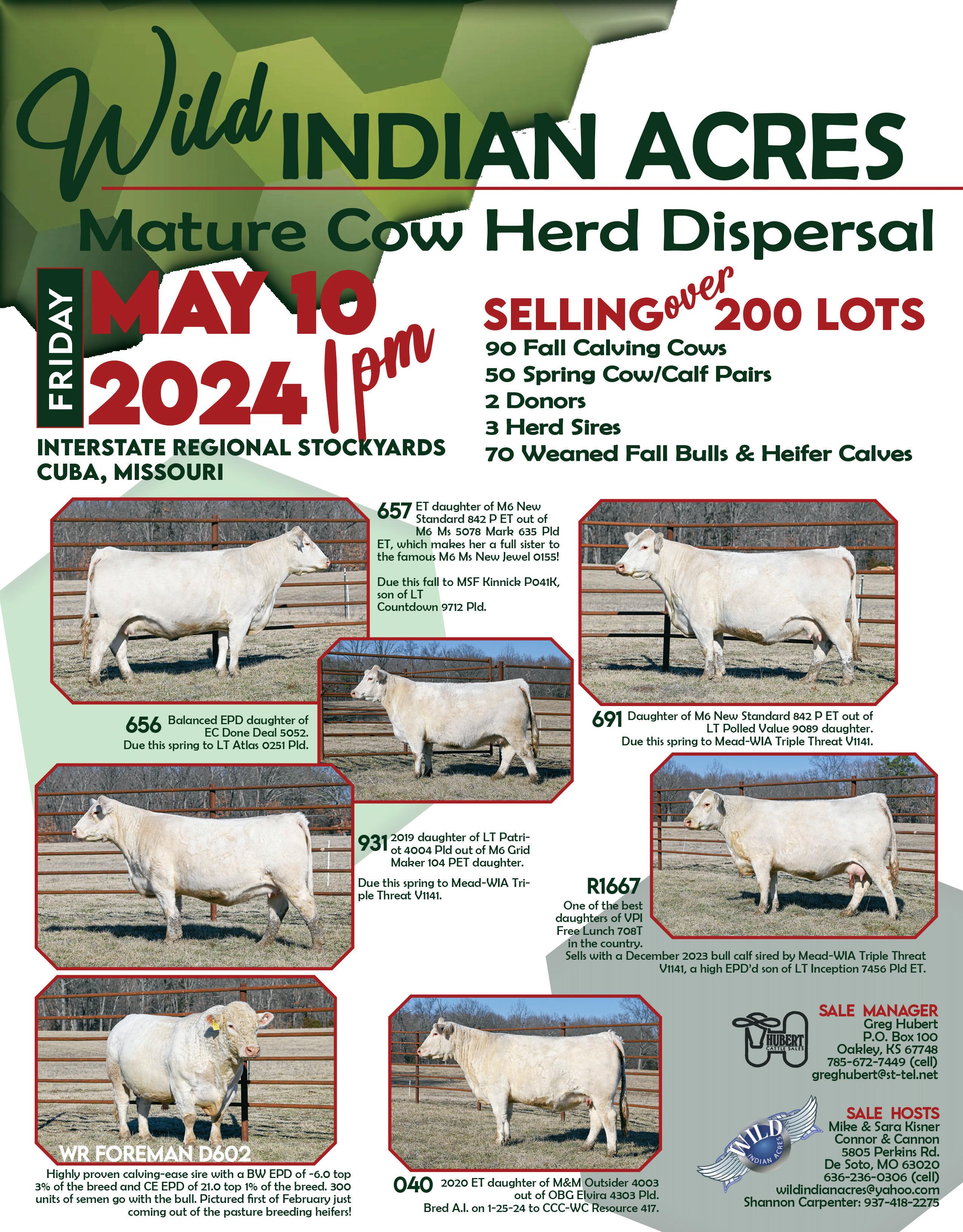

May is National Beef Month. Let’s plan ahead to promote, educate, and get involved.
As we move further into 2024, enjoying the warmer weather. Hopefully paired with some rain here and there. We are also getting closer to one of the best months of year. May is declared as “beef month” and your Missouri Beef Industry Council staff have been working hard to prepare a variety of ways to celebrate. We have included a few upcoming highlights below.
Kicking off Beef Month in St. Louis has become a bit of a tradition. In a joint effort with Missouri Farmers Care, a team of beef producers from across Missouri will be front and center in Ford Plaza at Busch Stadium before the St. Louis Cardinals game on May 3. Our “Beef Team” will be engaging with game attendees with some free, family fun. If you happen to be at the game, come find us prior to the first pitch to see your fellow producers and dollars in action!
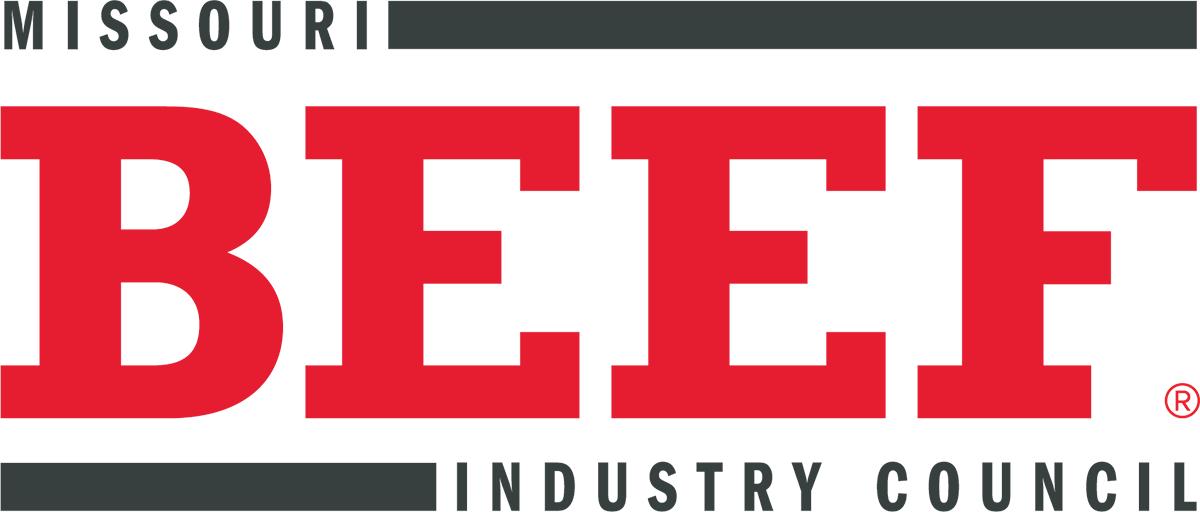
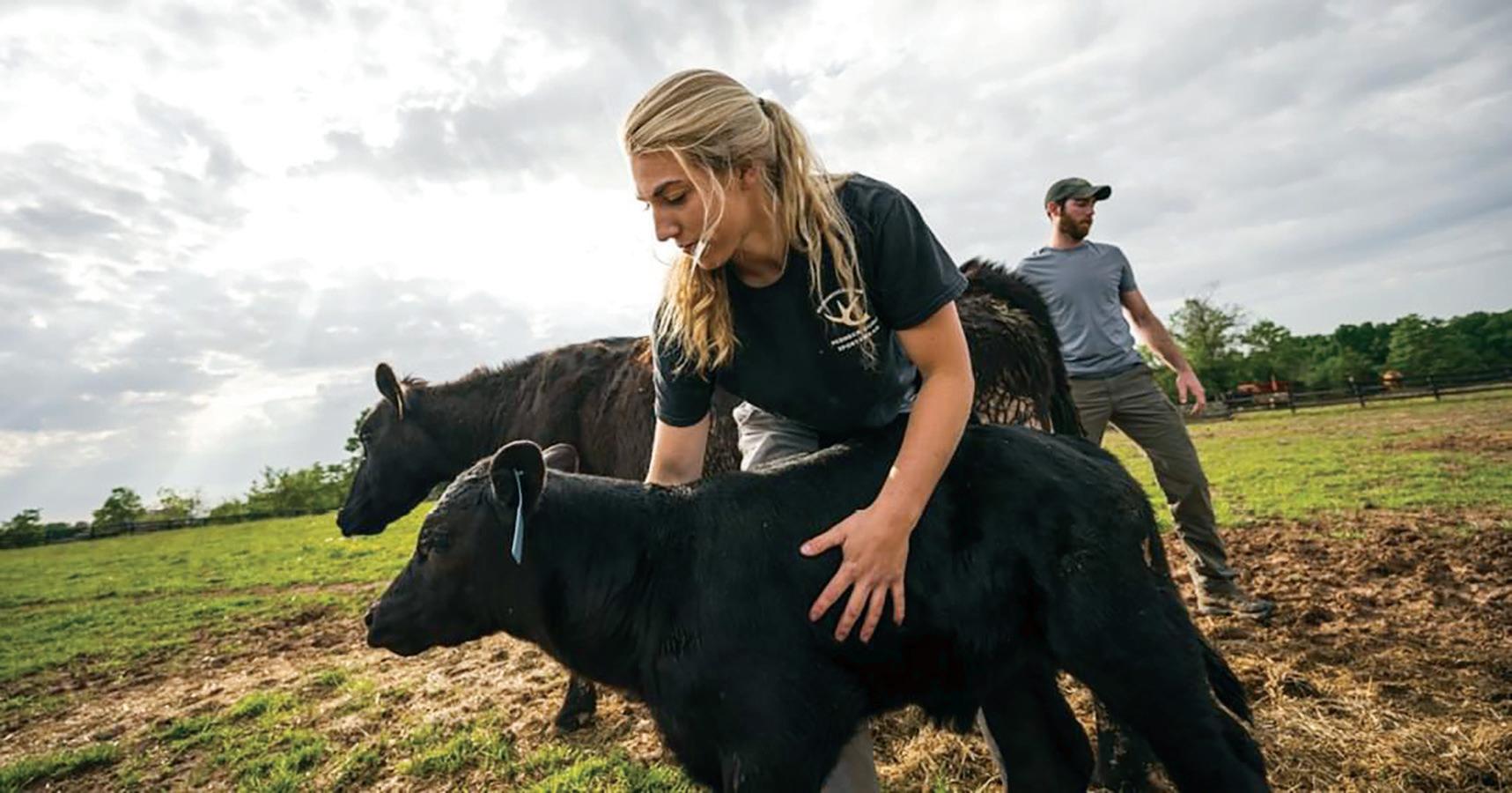
We will once again be partnering with KMIZ-ABC17 to host an online beef month contest. The contest will run through the month of May, testing consumer participants’ knowledge of beef and awarding one lucky winner with recipes, nutrition information, and, of course, beef!
Notice is hereby given the Director of Agriculture will be conducting an election to fill three positions on the Missouri Beef Industry Council Board of Directors. One regional council member is to be elected in each of Regions 1, 2 and 3. Position terms are three years.
Any cattle producer within the specified regions of Missouri who is producing cattle for market and the legal owner of one or more head of cattle becomes eligible to vote in the election by registering at his/her respective Farm Service Agency office, or electronically at http://mda.mo.gov/councils/ prior to July 20, 2024. Cattle producers who have voted in any of the previous three (3) elections are not required to register unless their address has changed.
The Missouri Department of Agriculture will mail ballots to registered producers on August 12, 2024. Ballots must be postmarked no later than August 31, 2024 to be valid.
Any qualified producer may be nominated and have his/ her name placed on the ballot provided the independent nomination is accompanied by petition of not fewer than 100 producers in the nominee’s region and written permission of the candidate. Petitions must be delivered to the Director of Agriculture on or before July 20, 2024. Petition forms are available from the Missouri Department of Agriculture by calling (573) 751-5611.
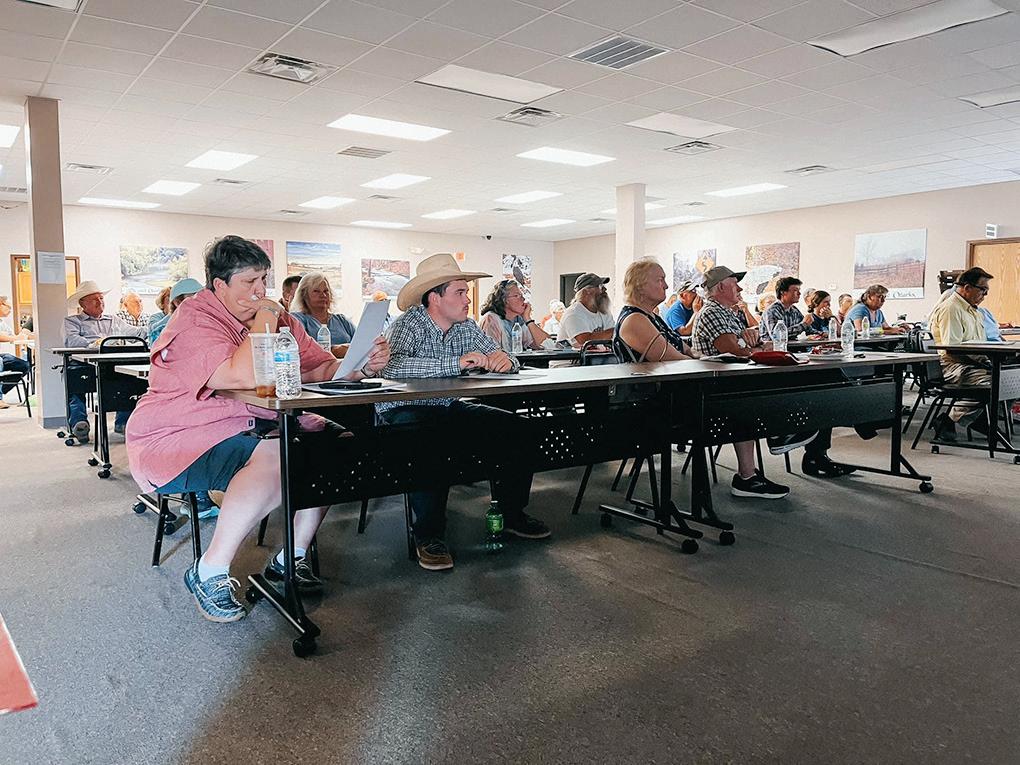
Consumer trust is always kept front-of-mind and there’s no better way to highlight the work we do in this area than through the BQA program. Missouri Beef Industry Council is excited to be partnering with Joplin Regional Stockyards, Certified Angus Beef, Sysco and the Livestock Marketing Association to bring a special, hands-on BQA training session to Missouri. The event will be held on Saturday, May 18, and attendance is free. If you’re interested in joining, please RSVP to the JRS office by calling (417) 548-2333.
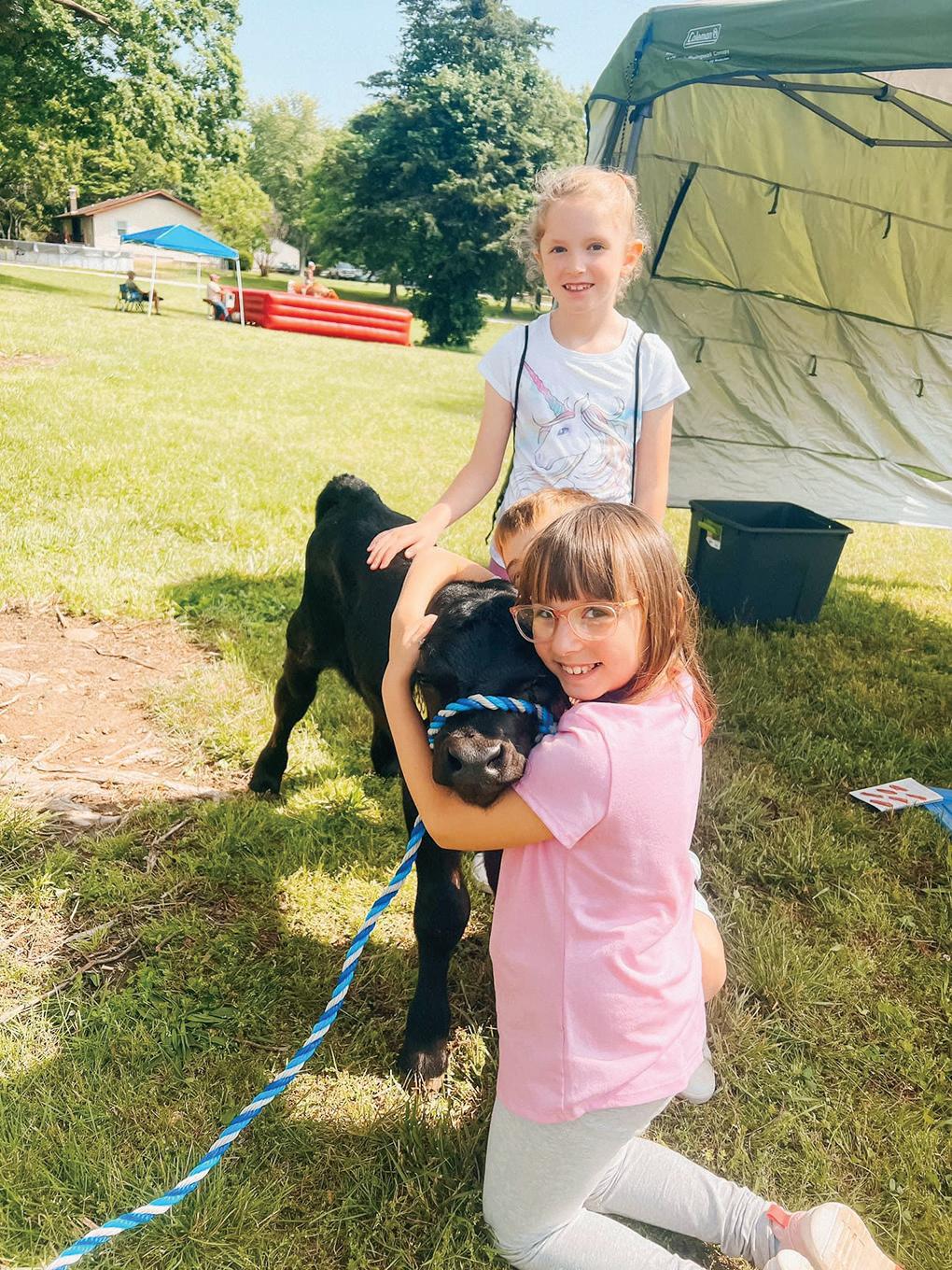
educational events or dinners where beef nutrition, health and wellness are highlighted, as well as procuring educational brochures and handouts. Grant applications can be found under at mobeef.org under cattlemen’s corner.
If you have any questions or have an event you’d like to
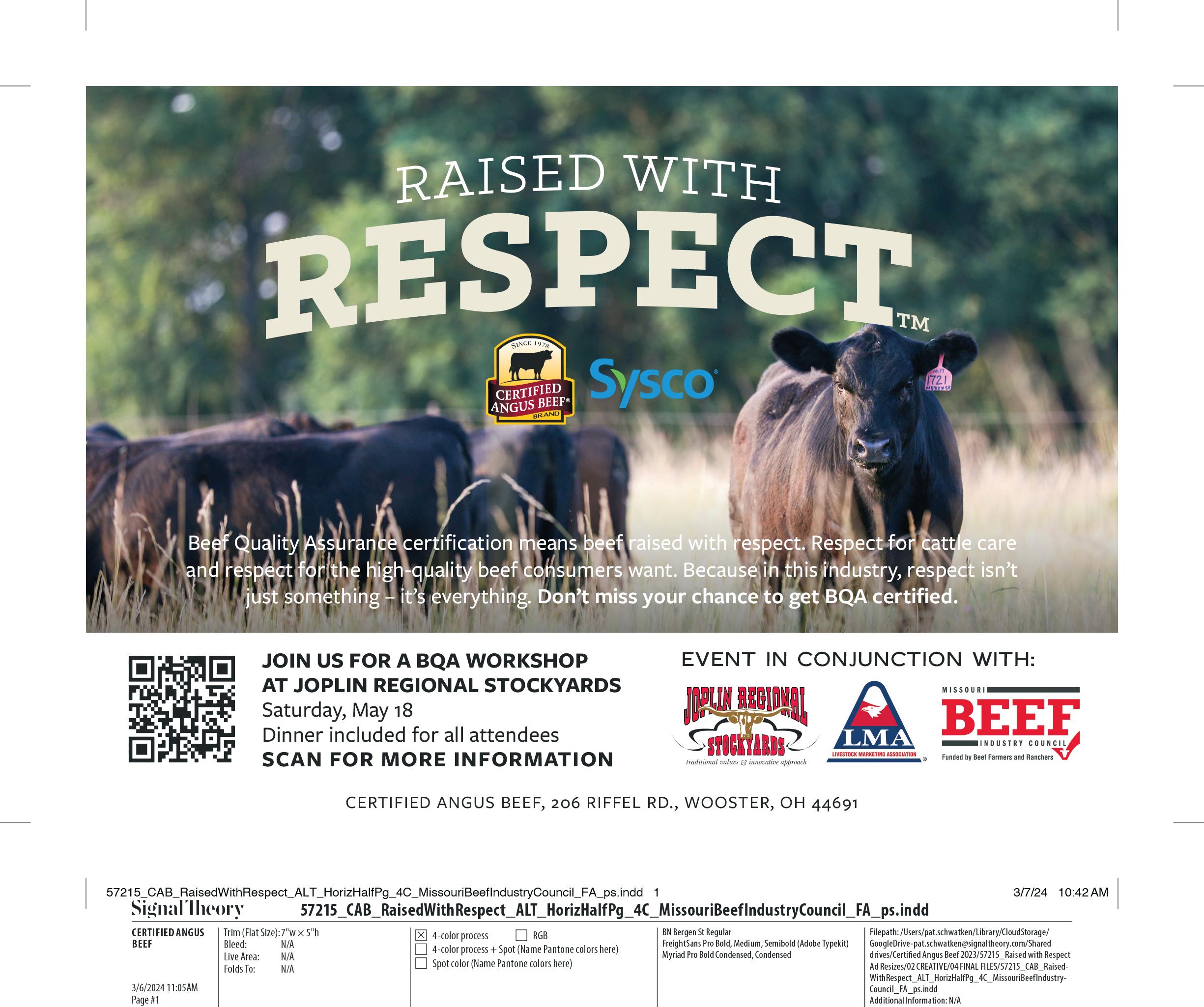
Wild migratory birds believed to be source of infection; viral testing and epidemiologic efforts continue
Commercial milk supply remains safe due to both federal animal health requirements and pasteurization
Source: USDA
WASHINGTON, March 25, 2024 – The U.S. Department of Agriculture (USDA), Food and Drug Administration (FDA) and Centers for Disease Control and Prevention (CDC), as well as state veterinary and public health officials, are investigating an illness among primarily older dairy cows in Texas, Kansas, and New Mexico that is causing decreased lactation, low appetite, and other symptoms.
As of Monday, March 25, unpasteurized, clinical samples of milk from sick cattle collected from two dairy farms in Kansas and one in Texas, as well as an oropharyngeal swab from another dairy in Texas, have tested positive for highly pathogenic avian influenza (HPAI). Additional testing was initiated on Friday, March 22, and over the weekend because farms have also reported finding deceased wild birds on their properties. Based on findings from Texas, the detections appear to have been introduced by wild birds. Initial testing by the National Veterinary Services Laboratories has not found changes to the virus that would make it more transmissible to humans, which would indicate that the current risk to the public remains low.
Federal and state agencies are moving quickly to conduct additional testing for HPAI, as well as viral
genome sequencing, so that we can better understand the situation, including characterization of the HPAI strain or strains associated with these detections.
At this stage, there is no concern about the safety of the commercial milk supply or that this circumstance poses a risk to consumer health. Dairies are required to send only milk from healthy animals into processing for human consumption; milk from impacted animals is being diverted or destroyed so that it does not enter the food supply. In addition, pasteurization has continually proven to inactivate bacteria and viruses, like influenza, in milk. Pasteurization is required for any milk entering interstate commerce.
Federal agencies are also working with state and industry partners to encourage farmers and veterinarians to report cattle illnesses quickly so that we can monitor potential additional cases and minimize the impact to farmers, consumers and other animals. For the dairies whose herds are exhibiting symptoms, on average about ten percent of each affected herd appears to be impacted, with little to no associated mortality reported among the animals. Milk loss resulting from symptomatic cattle to date is too limited to have a major impact on supply and there should be no impact on the price of milk or other dairy products.
This is a rapidly evolving situation, and USDA and federal and state partners will continue to share additional updates as soon as information becomes available.
More information on biosecurity measures can be found at: https://www.aphis.usda.gov/aphis/ourfocus/ animalhealth/animal-disease-information/avian/avianinfluenza/ai-wild-birds
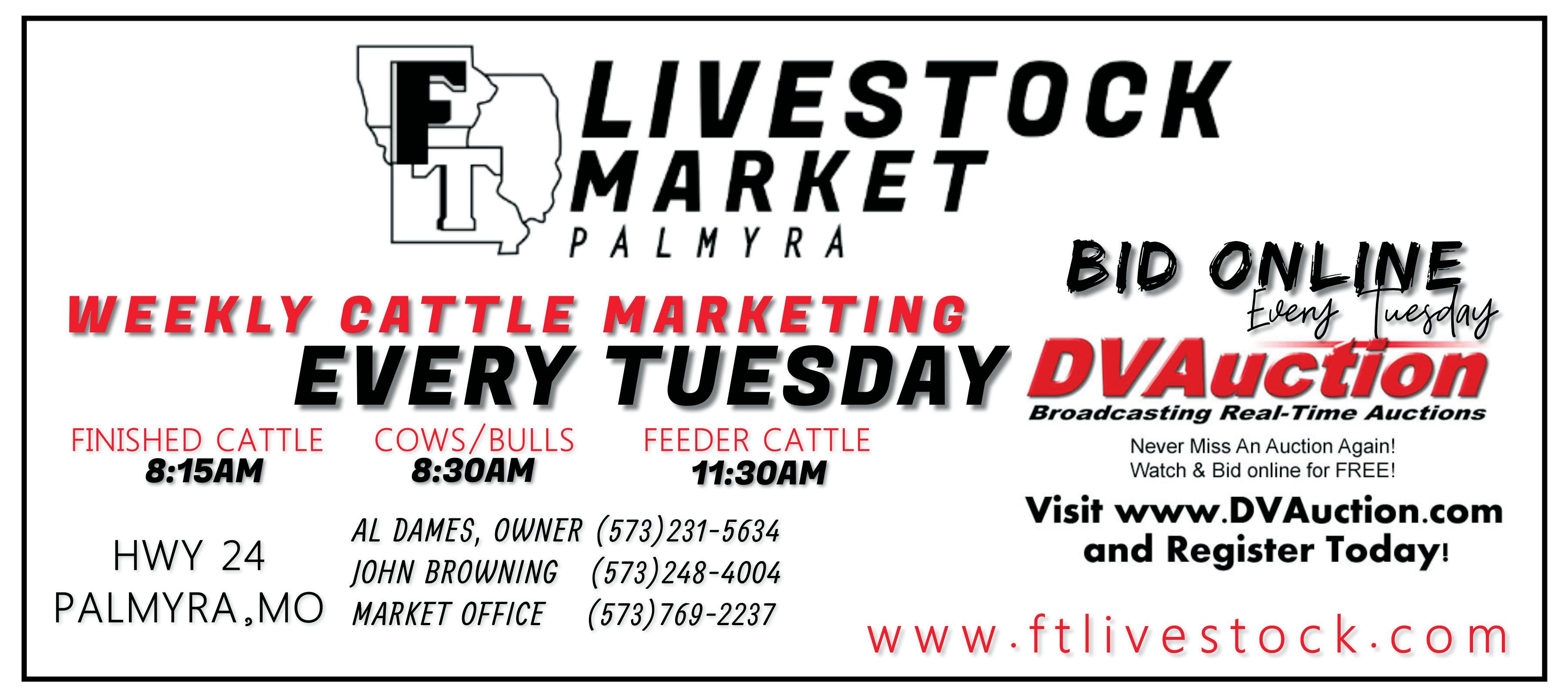
WASHINGTON (Mar. 5, 2024) – Today, National Cattlemen’s Beef Association (NCBA) Vice President of Government Affairs Ethan Lane issued a statement following the release of the U.S. Department of Agriculture’s (USDA) latest Packers and Stockyards rule:
“NCBA’s concern with this regulation has always been based in the rule’s unforeseen impacts to standard business practices. We have remained consistently
opposed to any discriminatory practices in the marketplace. While we still have concerns about the unintended consequences of the rule, we are pleased that USDA has addressed most of our significant concerns between the proposed and final rules. We continue to urge USDA to ensure this rule remains focused on its stated objective—with which we wholeheartedly agree— and does not stray into extraneous, unrelated subject matter discussed in the proposal’s preamble.”
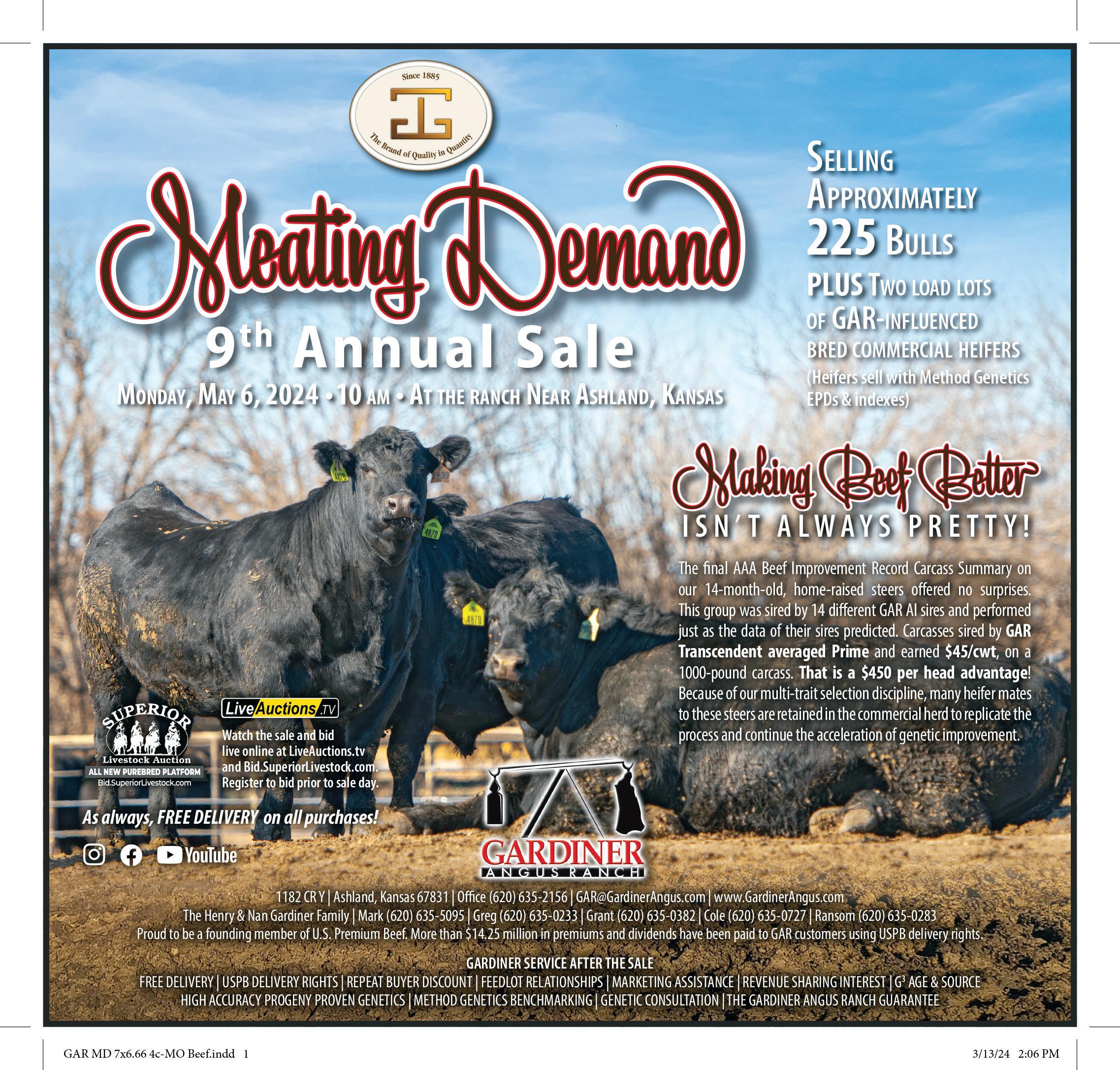
U.S. pork exports raced to a great start in 2024, according to January data released by USDA and compiled by the U.S. Meat Export Federation. While January beef exports were slightly below last year’s volume, export value trended significantly higher. Lamb exports were also strong in January, posting the highest value in more than four years.
Strong gains for U.S. pork in Mexico, Korea, Central and South America, Australia Although January pork exports were led by another powerful performance in leading market Mexico, U.S. pork continued to make gains in a wide range of Western Hemisphere and Asia-Pacific destinations. With momentum continuing to grow in South Korea, Central and South America, Australia and Malaysia, pork exports totaled 251,424 metric tons in January, up 6% from a year ago. Export value also increased 6% to $682.1 million.
“Mexico’s demand for U.S. pork is so spectacular that it tends to overshadow other great success stories,” said USMEF President and CEO Dan Halstrom. “It is especially gratifying to see other markets following the trail blazed by Mexico, as purchases expand beyond raw material for further processing to include center-of-theplate cuts, including loins, which are gaining popularity at retail and foodservice.”
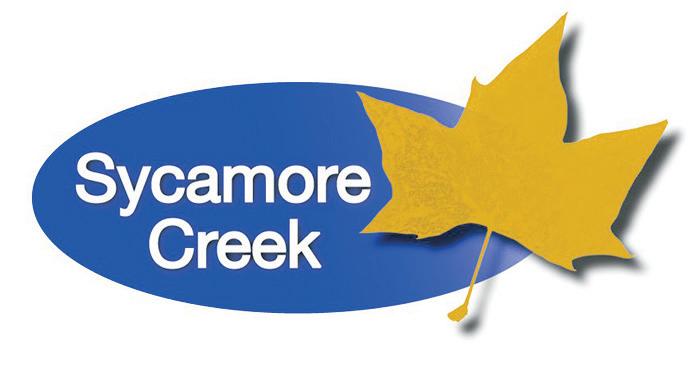
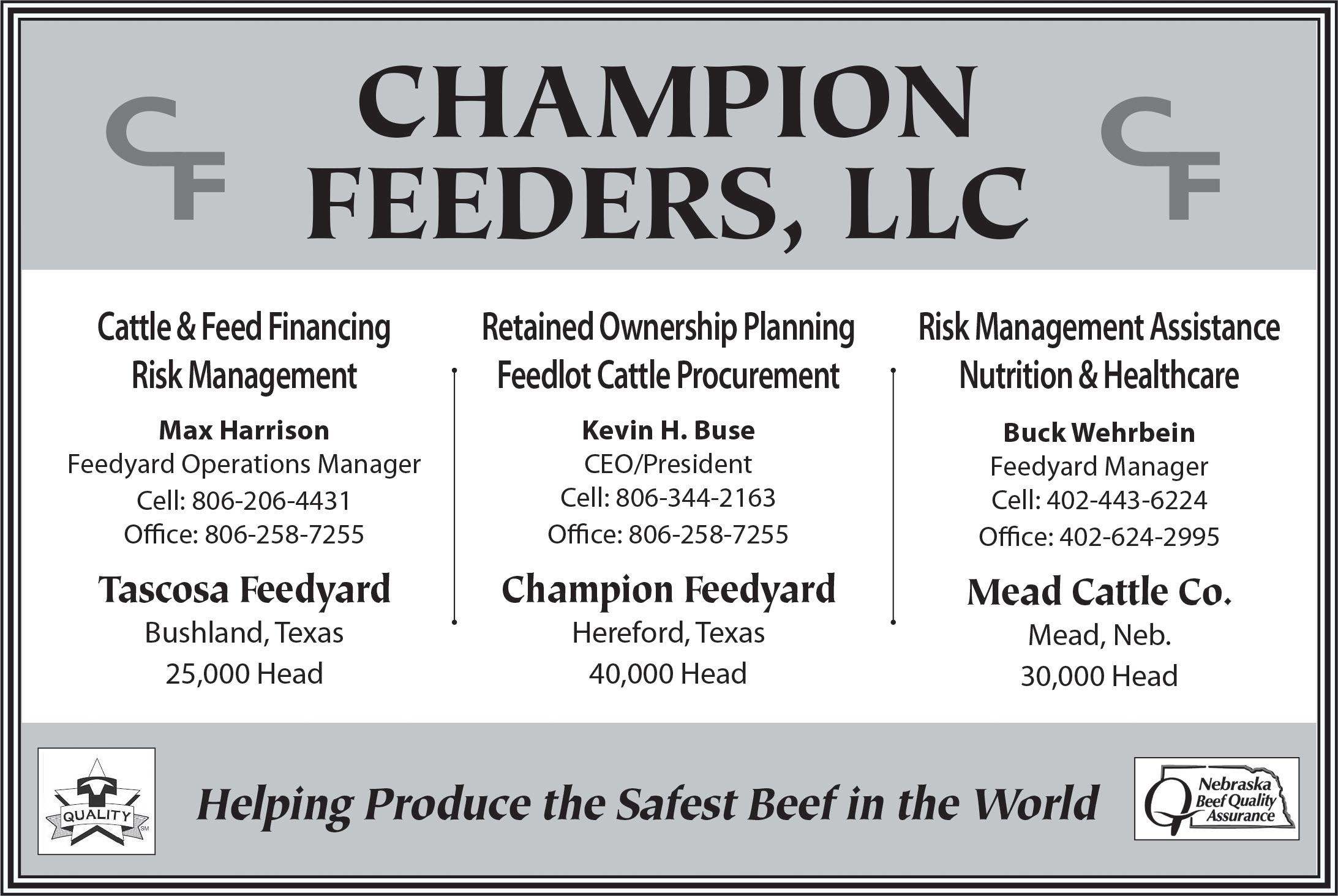
Beef export value higher than a year ago, led by strong variety meat results
January beef exports totaled 99,764 metric tons, down 1% from a year ago. But export value climbed 9% to $763.8 million, as value trended higher year-over-year to South Korea, Japan, Mexico, Canada, Central America, the Caribbean and Hong Kong. Beef variety meat exports increased 12% from a year ago to 23,138 metric tons, while value climbed 16% to $89 million, led by growth in Japan, Egypt, Mexico, Korea, Peru and China/Hong Kong.
“While USMEF expects 2024 to be another challenging year in terms of beef supply availability, the upward trend in export value is a positive sign,” Halstrom said. “The inventory has been cleared and customers in Asia are reloading on U.S. beef. There is also more optimism in Asia’s foodservice sector, especially in Korea. Combined with the recent strength we’ve seen in the Western Hemisphere, this bodes well for beef demand in the coming year. January was also an excellent month for beef variety meat exports, which are especially important for maximizing the value of every animal.”
Lamb exports largest in 10 months; value highest since 2019
January exports of U.S. lamb totaled 303 metric tons, up 28% from a year ago and the largest since March.
Export value increased 53% to $1.7 million, the highest monthly value since December 2019. Export growth was led by the Caribbean and Canada, while exports to Mexico also increased year-over-year in value.
A detailed summary of the January export results for U.S. beef, pork and lamb, including market-specific highlights, is available from the USMEF website.
On I-70, 4 miles east of Kingdom City, MO on outer road 573-642-7486
Every Monday:
Slaughter Cattle 12:00 p.m.
Selling All Classes of Cattle 12:30 p.m.
1st Thursday Nite of Each Month: 6:00 p.m. Bred Cows and Breeding Bull Sale
Jack Harrison 573-999-7197 (owner)
John P Harrison 573-220-1482
Claude Niemeyer 573-470-1017
Roger Temmen 573-680-4538
Justin Oberling .................. 217-440-7724
Glenn Stegman 573-619-8495

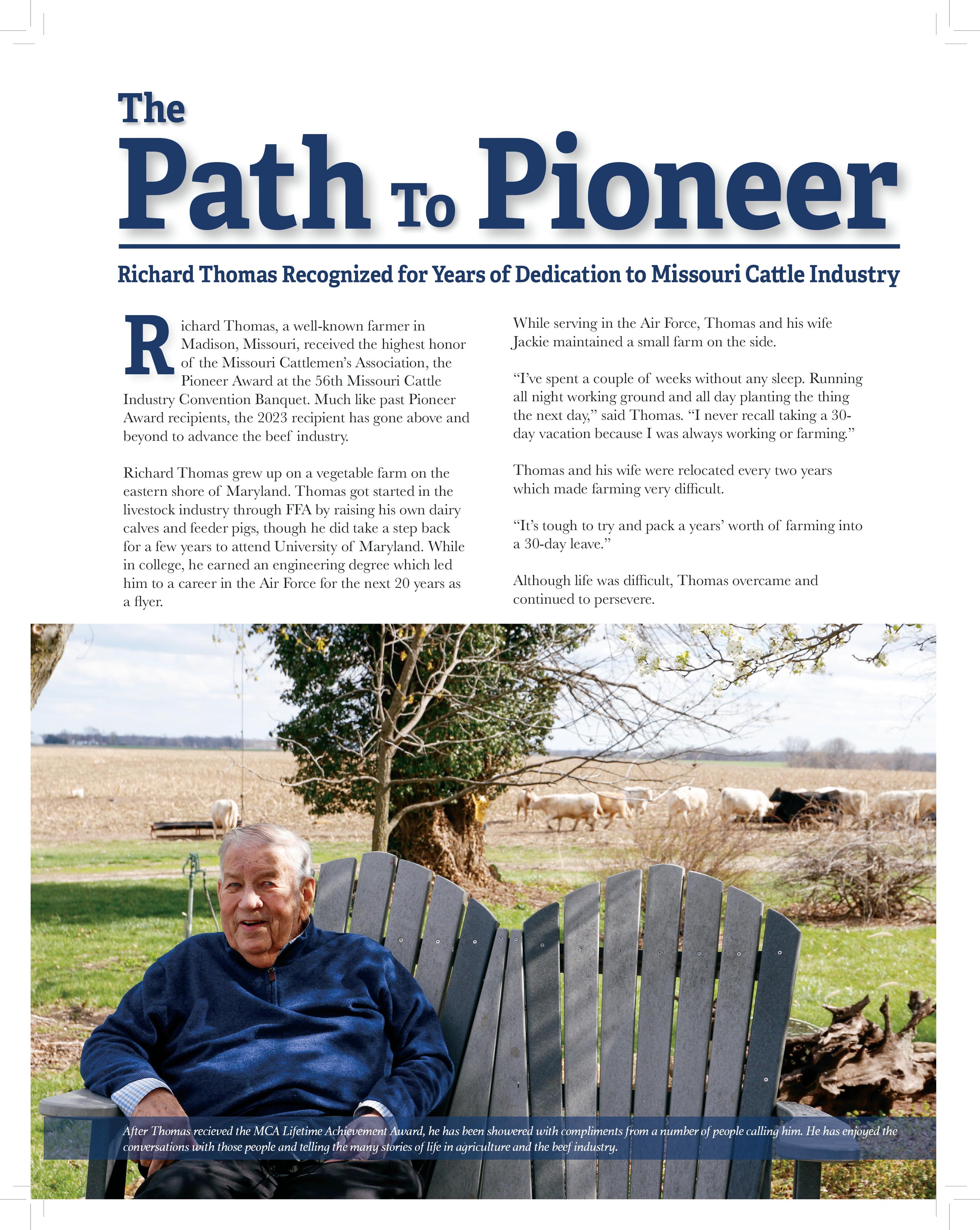
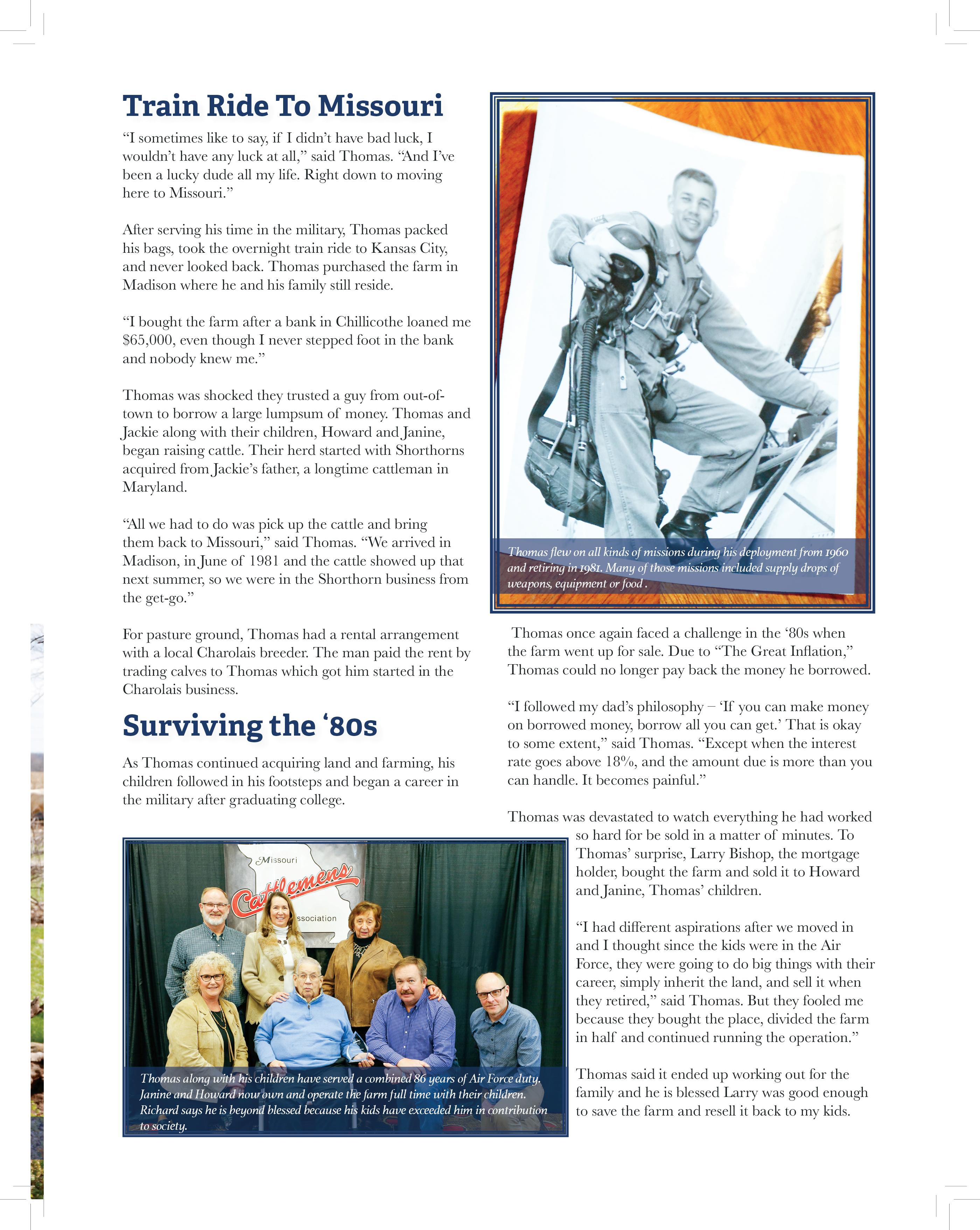


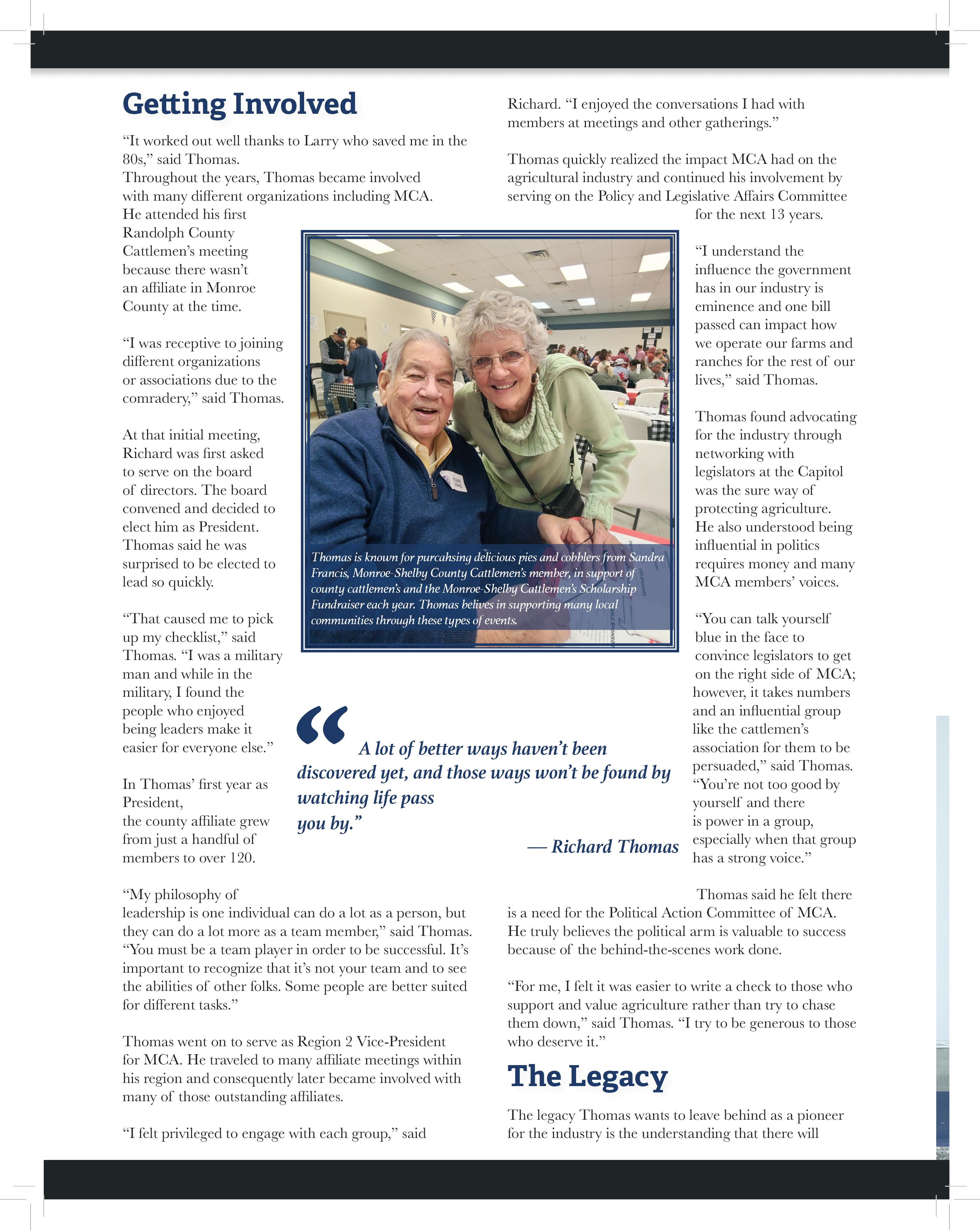
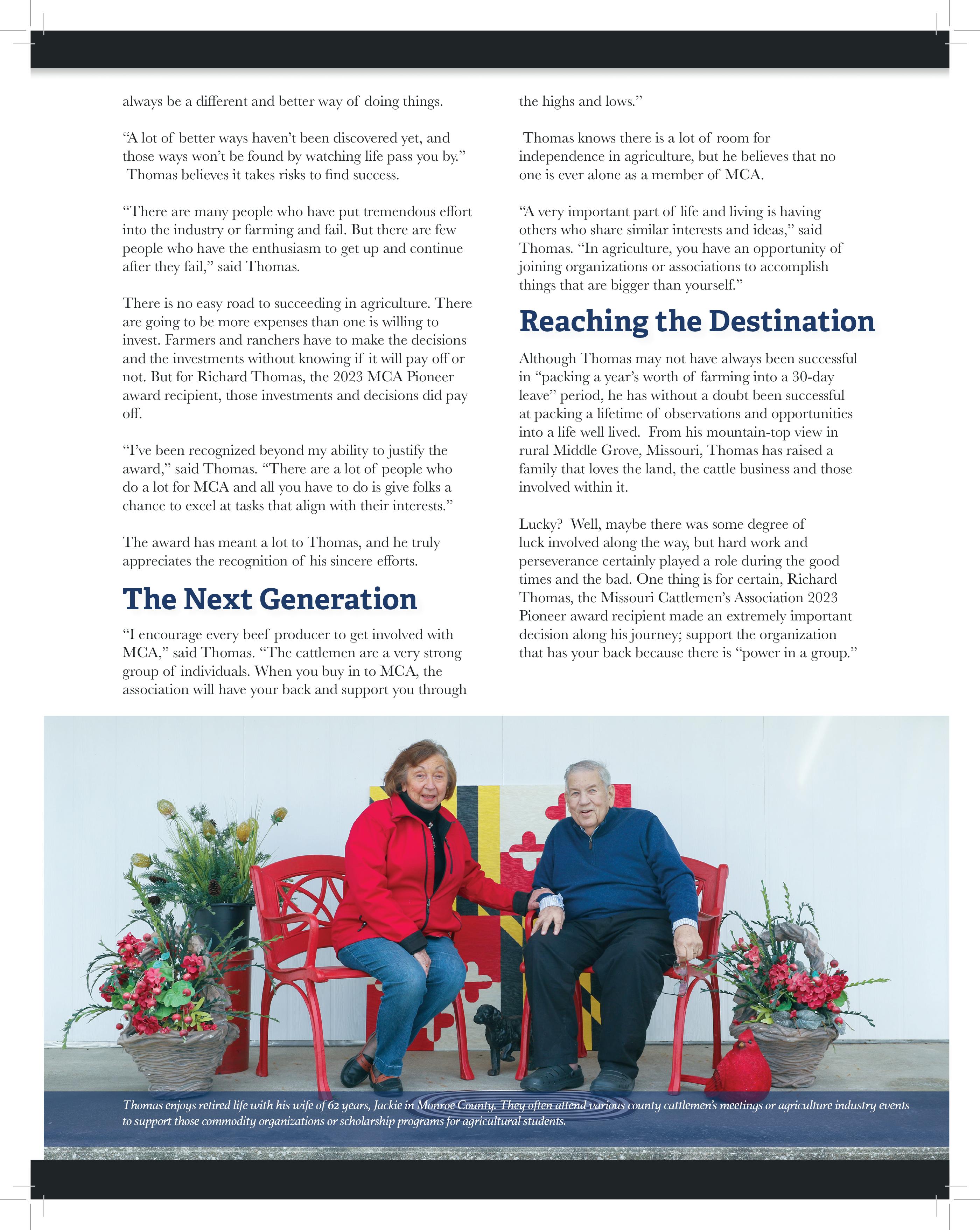


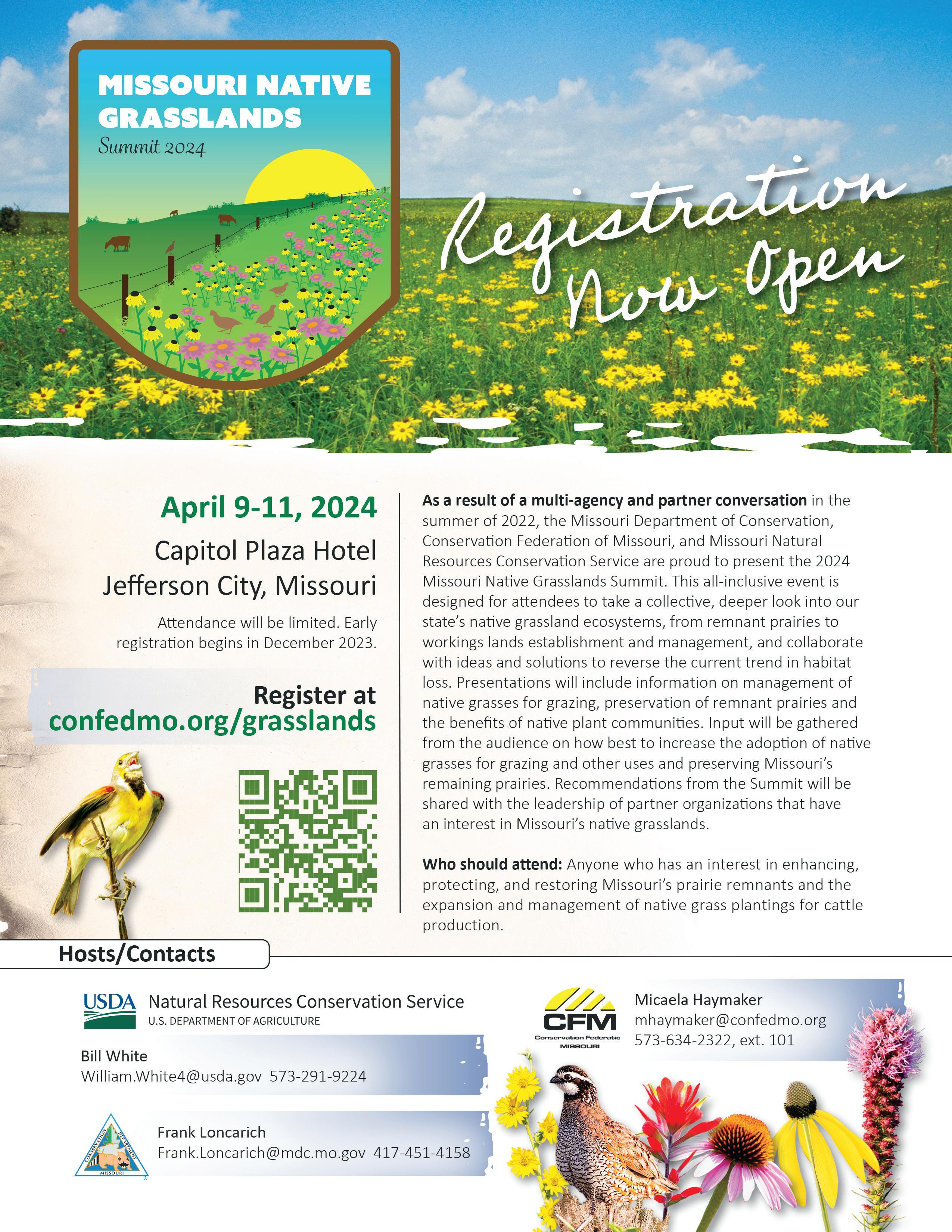




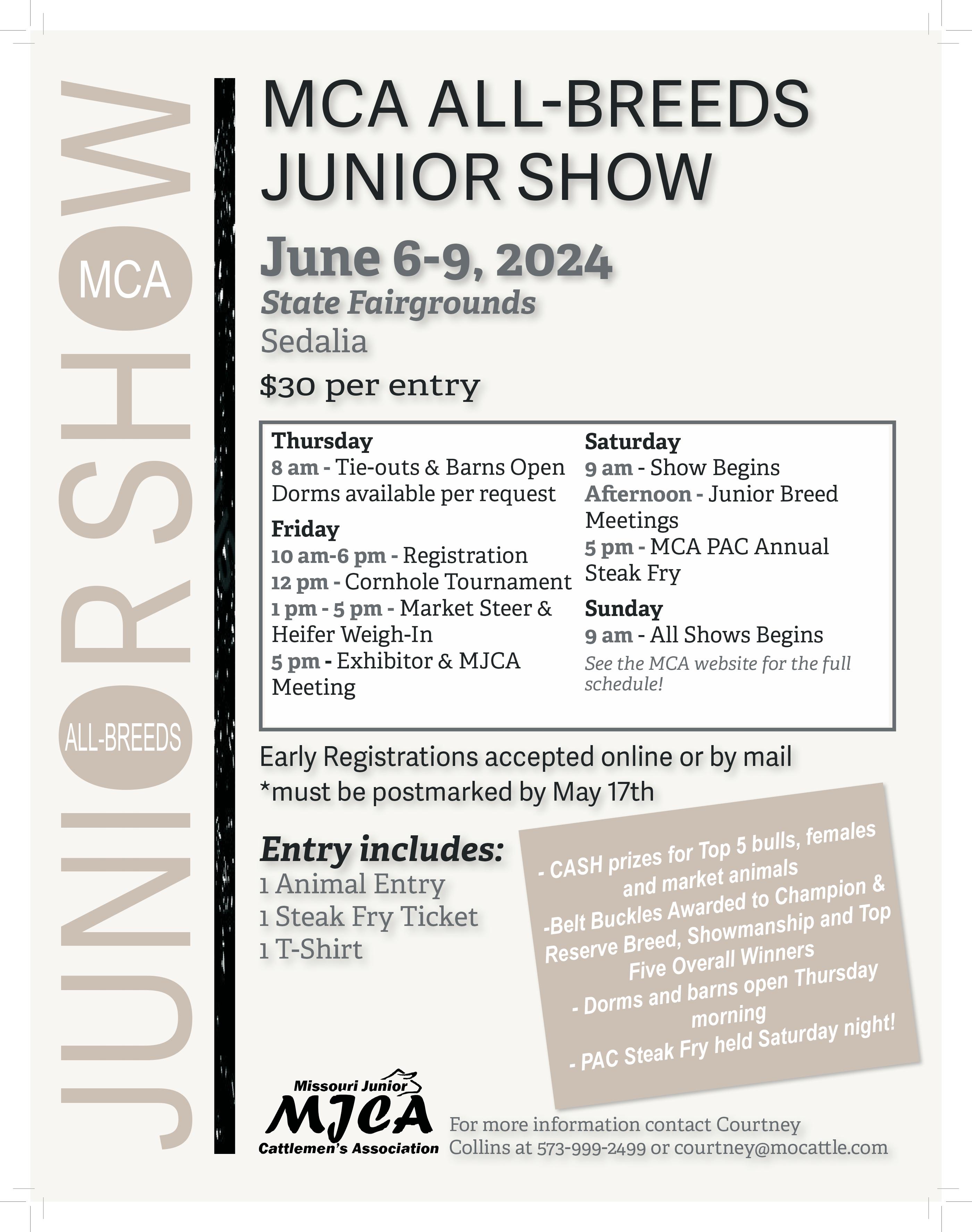


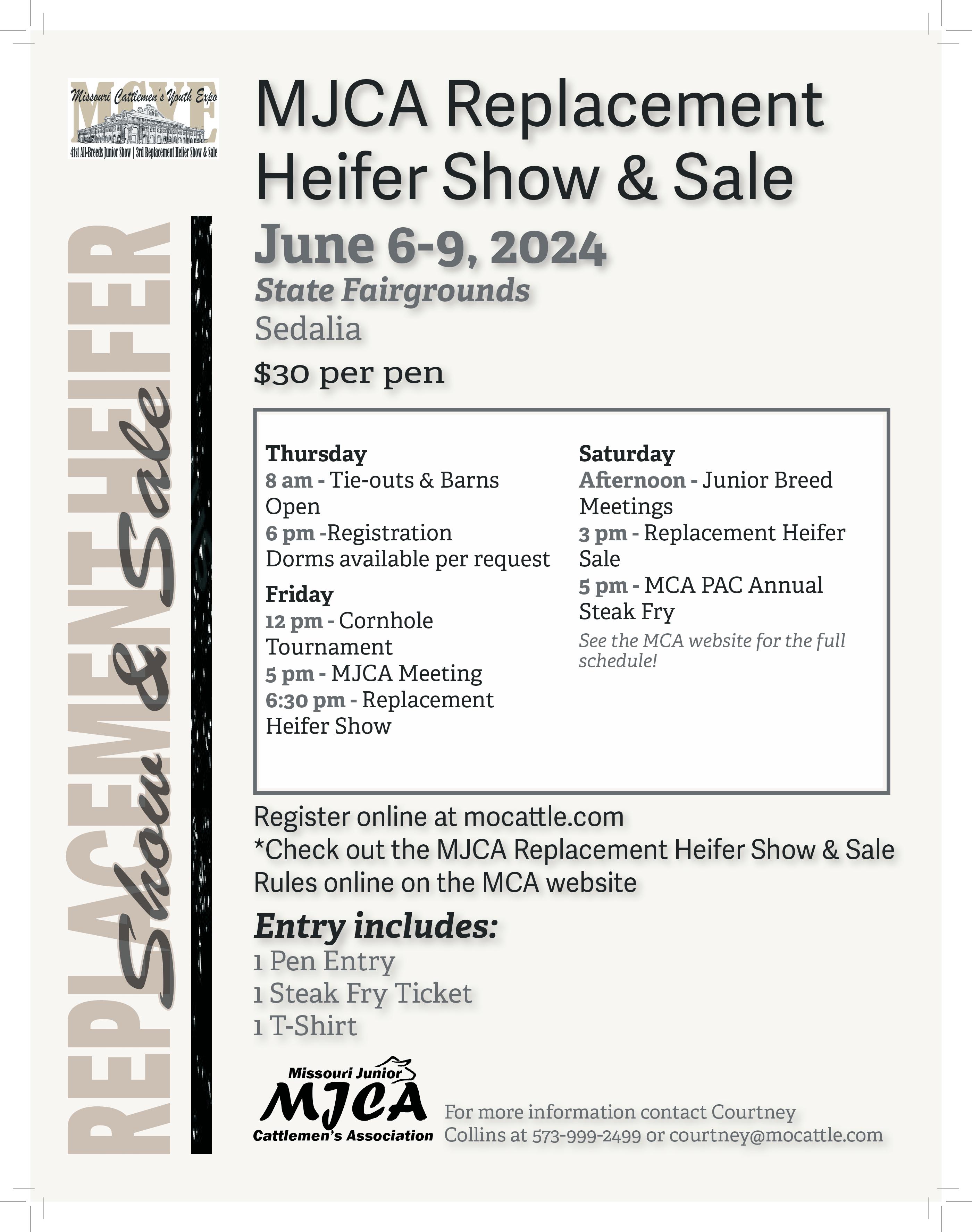
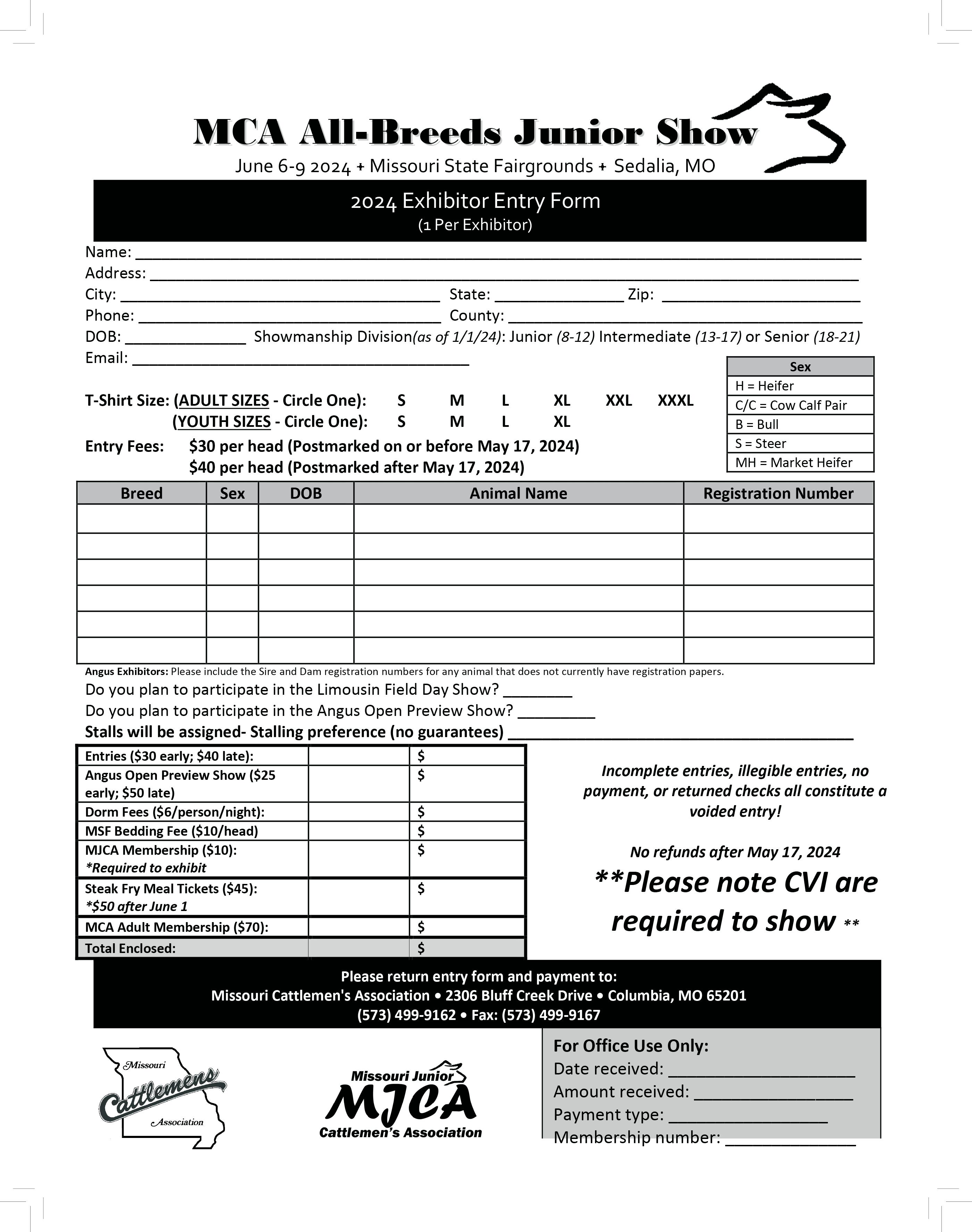






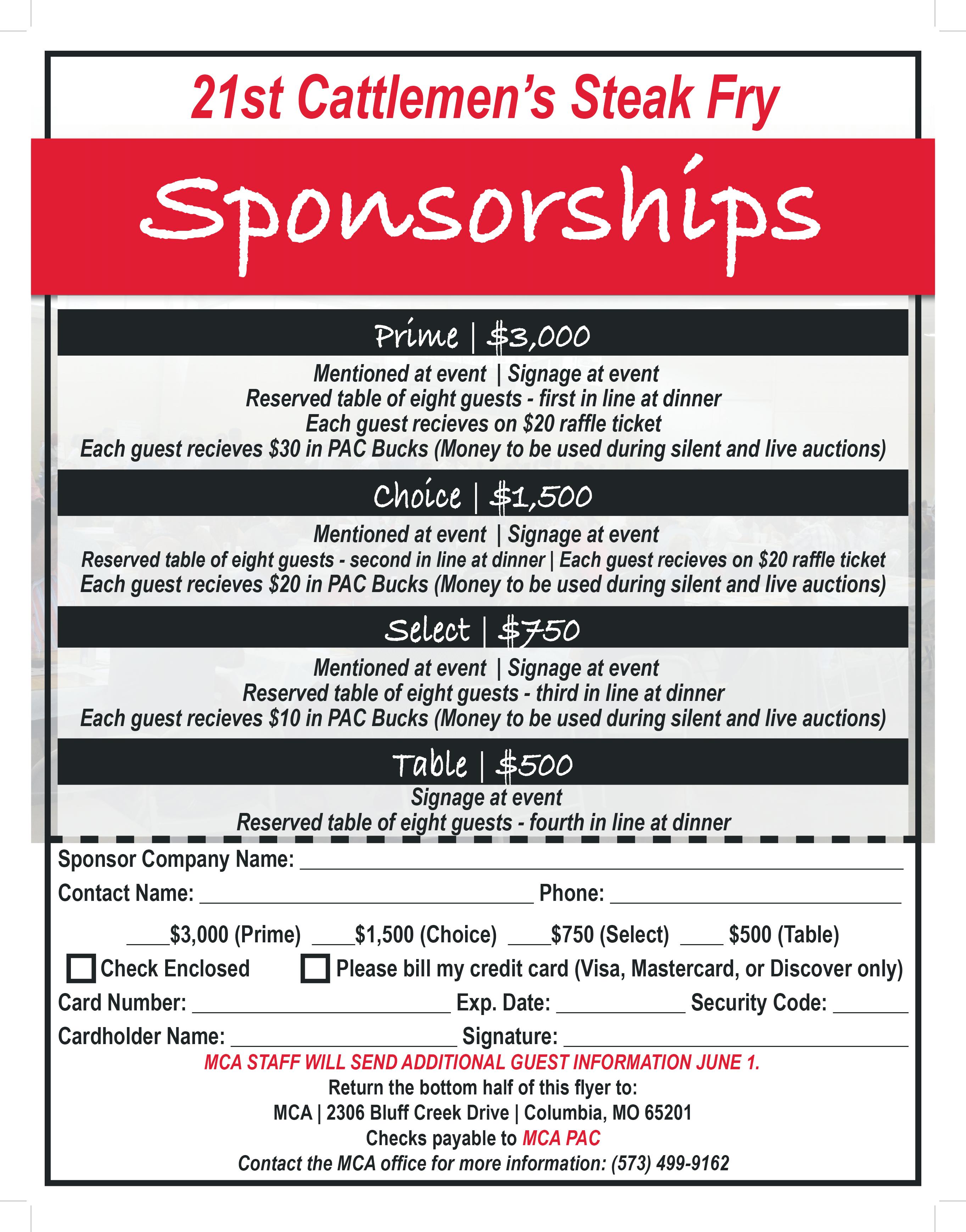

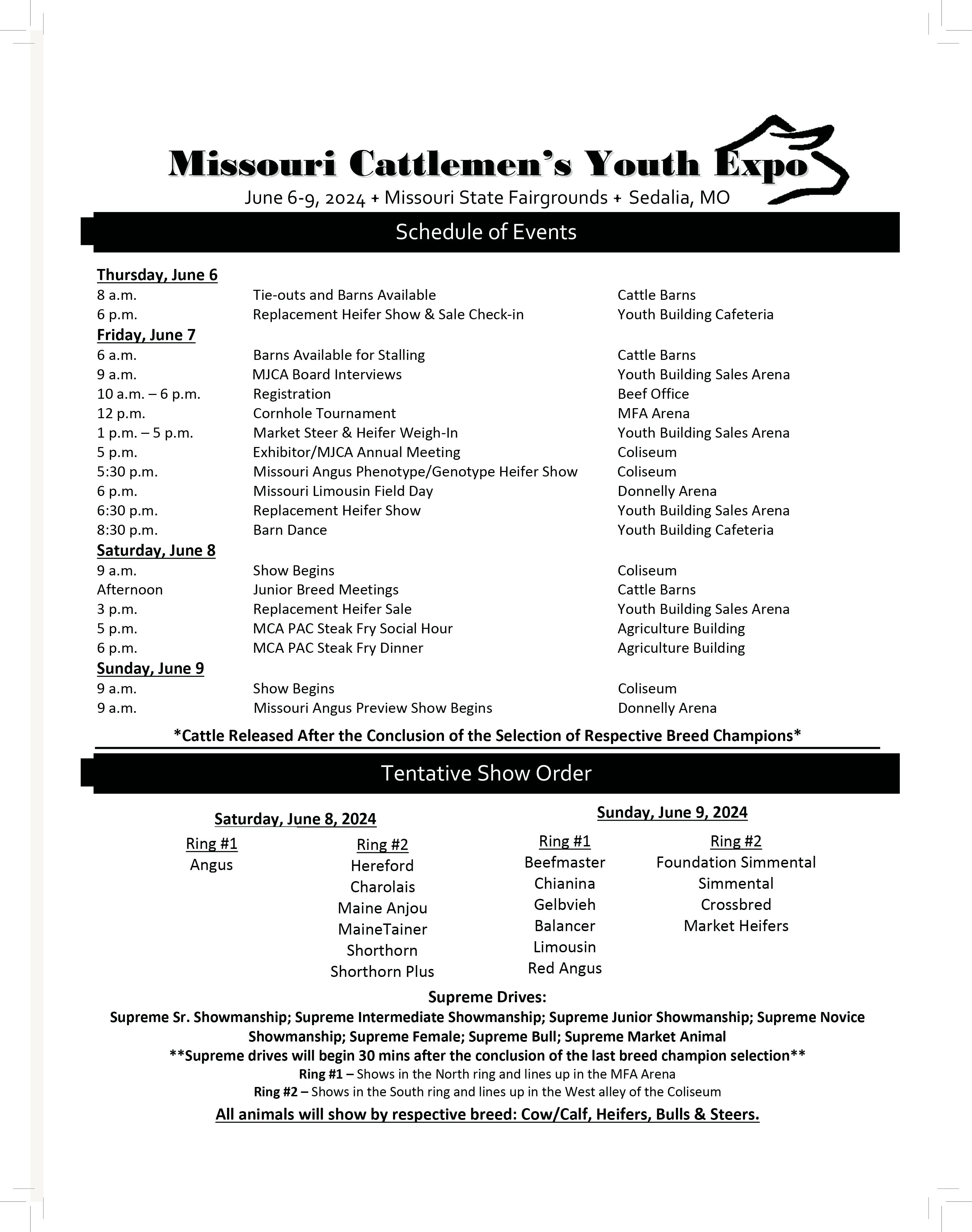


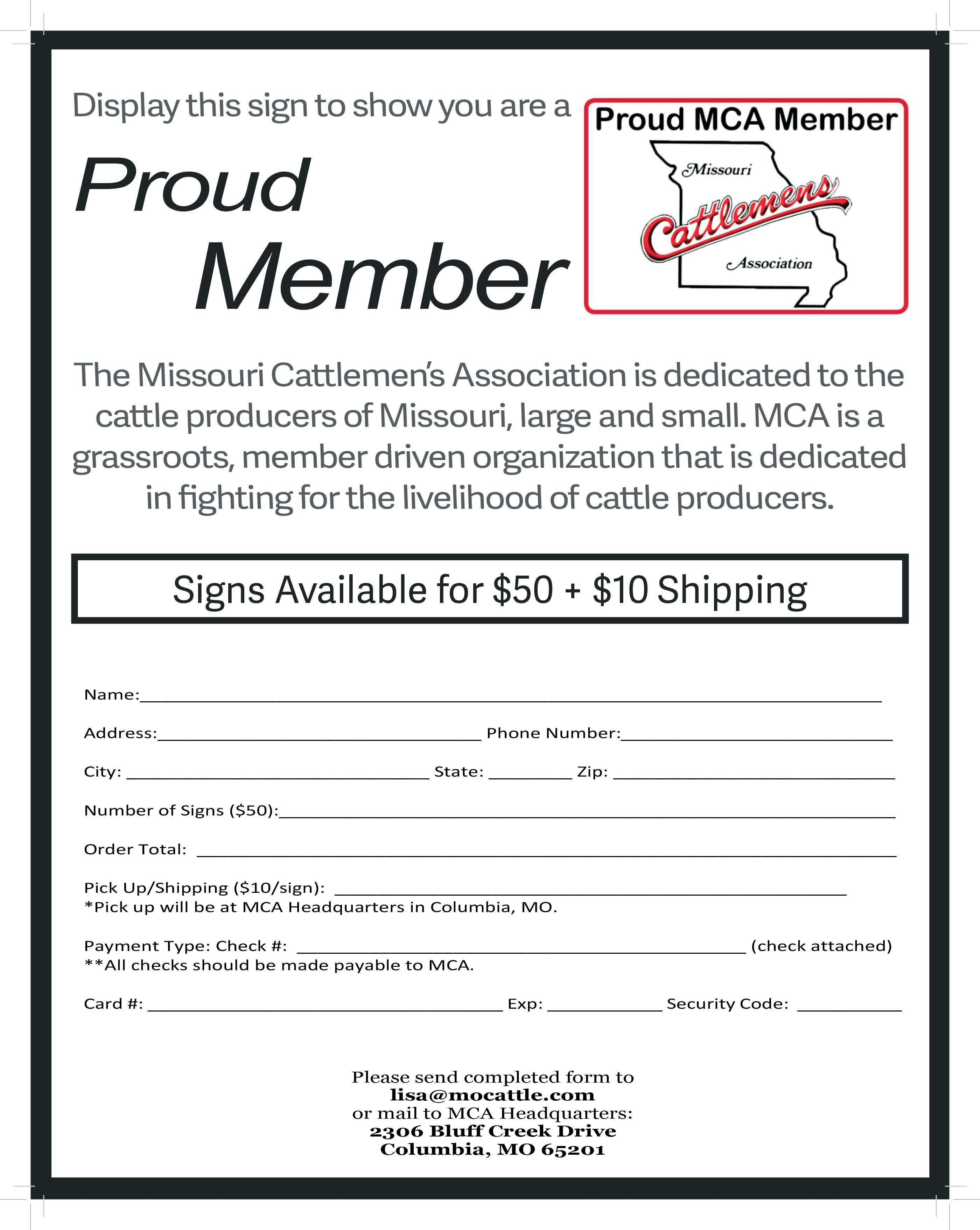
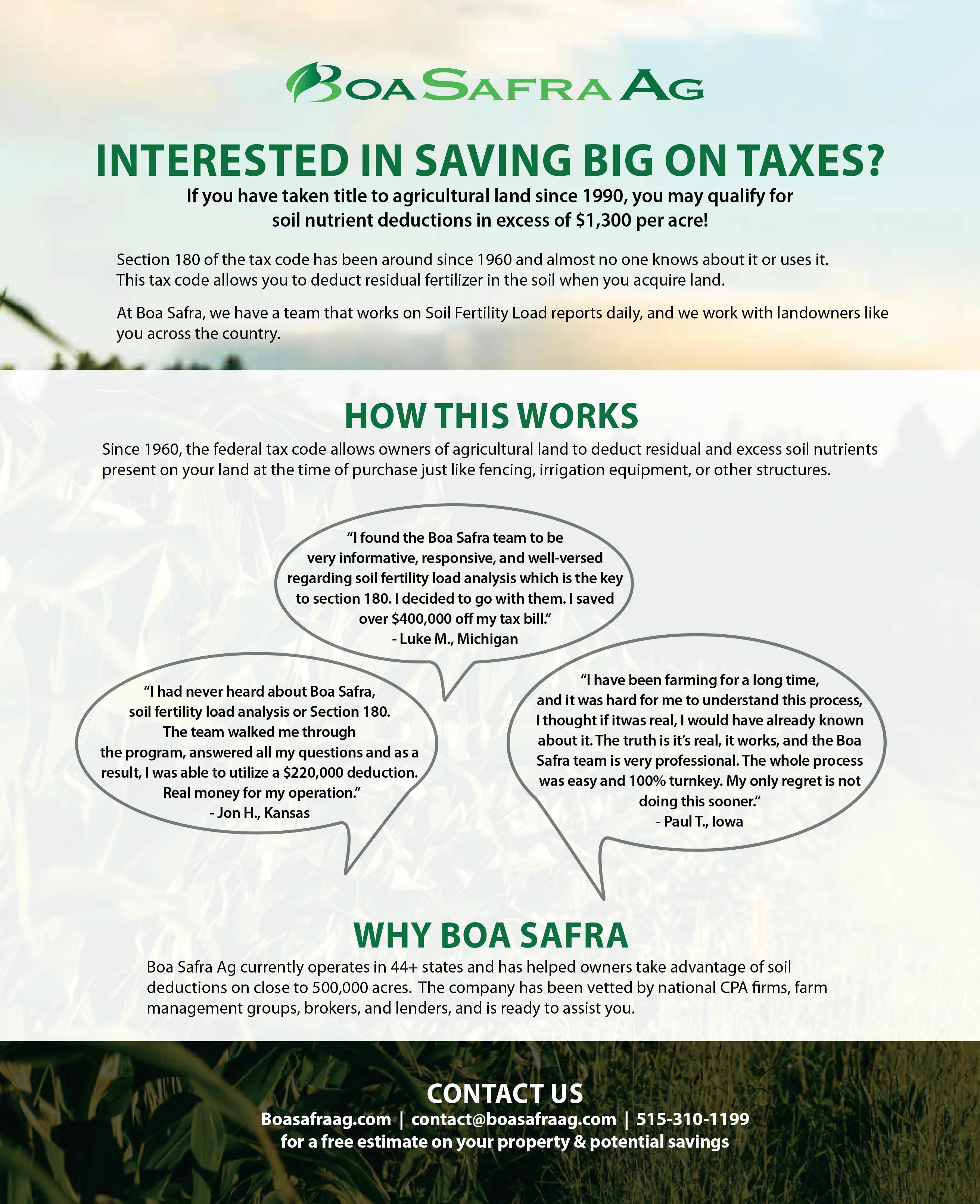


The February educational series meeting was held February 27, with Hannah Copehhaver of CIS Insurance Solutions presenting on Livestock Risk Insurance. After her slide presentation, attendees took part in two simulated policy scenarios to further understand how the policies perform under different market situations.
On February 29, LCCA grilled for the MFA Agri Service open house held at the American Legion Building in Higginsville. The crew prepared 300 ribeyes for those attending to enjoy.
The annual meeting was held March 2 at the Mayview School Community Center. A smoked roast beef dinner by Moose’s Market was served to the 110 members and

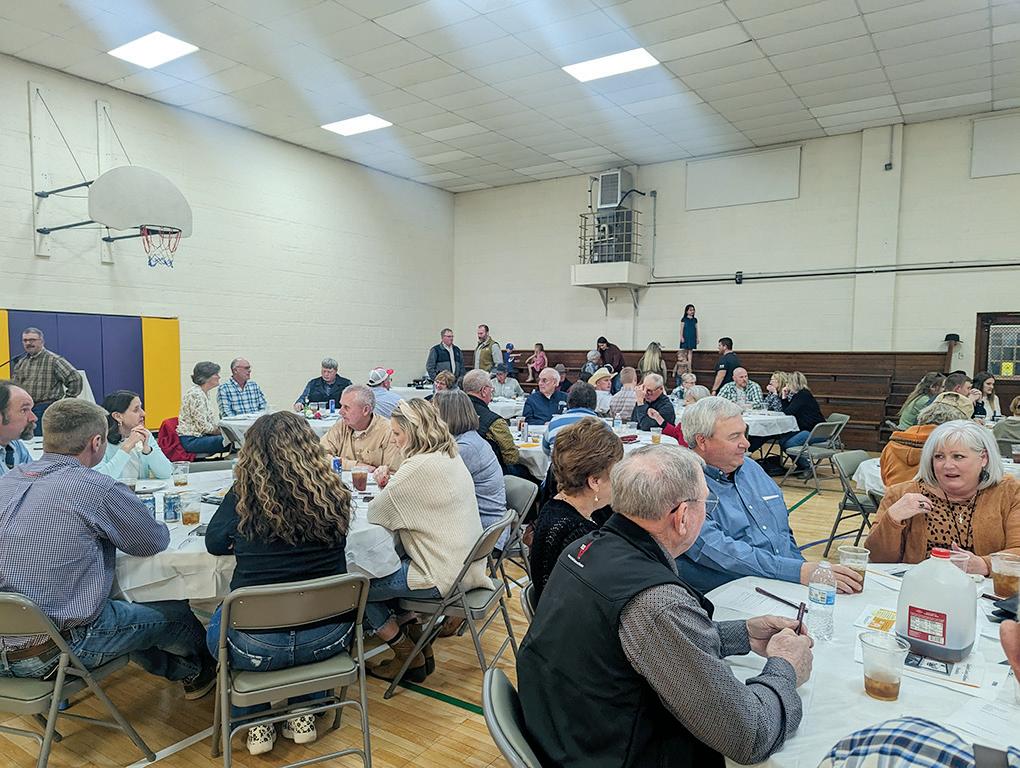
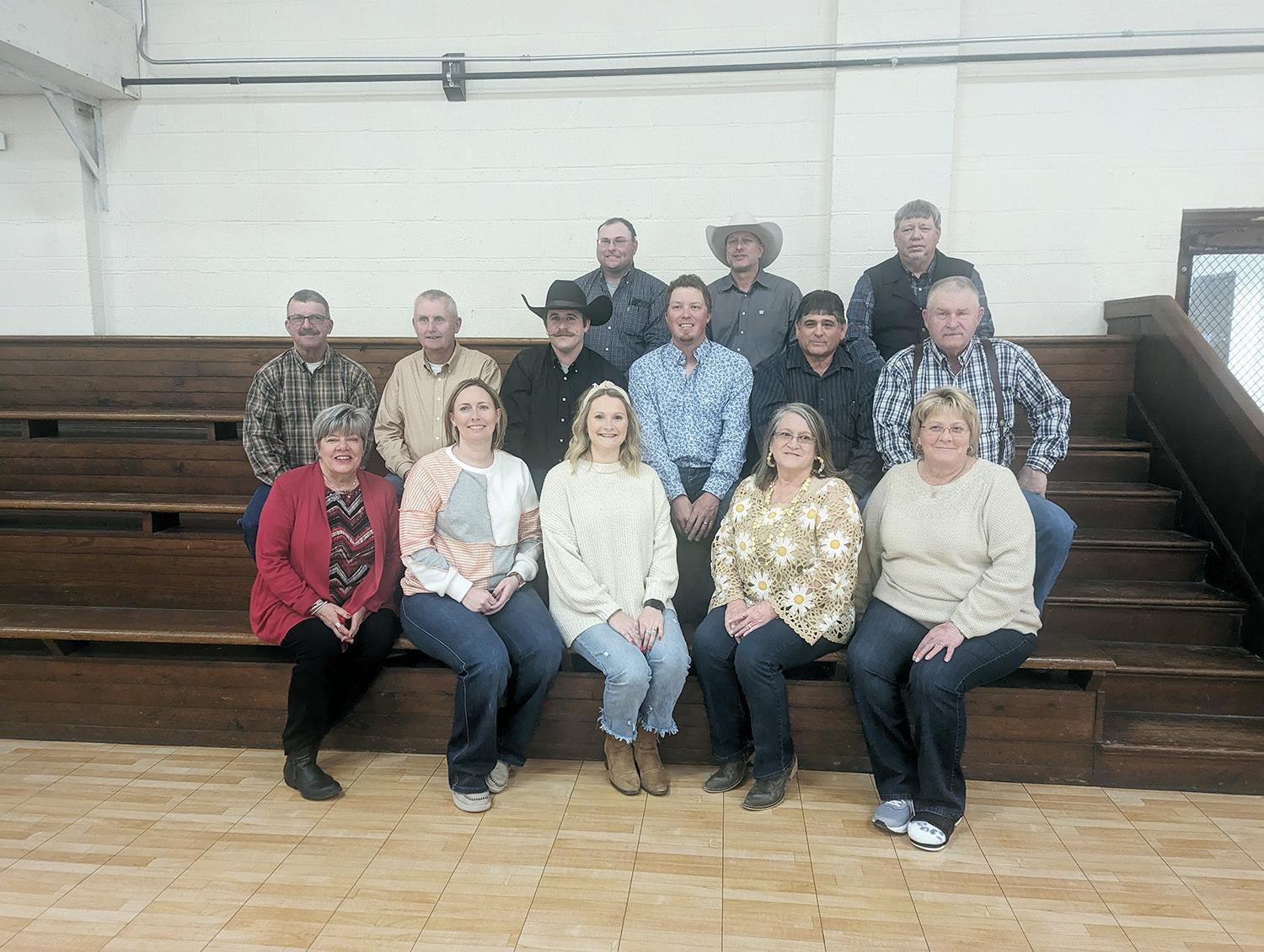
guests attending. Special guests included MCA President Chuck Miller, MCA Beef House chair Patty Wood and State Representative Kurtis Gregory.

Gelbvieh and Balancer® Bulls & Females
Specializing in Balancers® for the Modern Rancher Ertel Cattle Company • 660.234.2654 26694 Anchor Way • Greentop, MO 63546 www.ertelcattle.com • gertel@ertelcattle.com
Sponsors for social hour were Assured Partners, Eric Lockard, and Thad Madsen State Farm Insurance provided music by Emmitt Rickey. Ryun Morris of River Valley MFA sponsored the event space and set up/ take down by the Odessa FFA chapter.
President Darrell Neuner conducted the business meeting. Marsha Corbin reported on behalf of the Cattlemen’s Beef Board and Missouri CattleWomen. Barbara Copenhaver, a member of the Missouri Beef Industry Council shared on work going on with checkoff dollars in Missouri.
Meeting awards continued in next month’s issue.
The South Central Cattlemen met for their annual meeting on Thursday, January 11, at the Extension Office in West Plains. Members and guests dined on ribeye steaks, potatoes, green beans, salad, and cobbler provided by Bootleggers. The meal was generously sponsored by John & Dixie Williams of Hirsch Feed and Farm Supply of West Plains and was served by Hirsch’s staff. We had approximately 100 members present.
President Dan Corman welcomed all members and guests to the meeting and our sponsor, John Williams, asked for the blessing on the meal. After we dined on our meal, Dan opened the meeting by encouraging guests to become members. Dan also encouraged the group to attend the Missouri Cattle Industry Covention at Margaritaville and the NCBA Convention in Orlando, Florida. Secretary Elizabeth Picking then recapped the previous month’s meeting minutes. Elizabeth also mentioned the extension offices direct marketing beef school that was coming up March 14-15. Treasurer Jenny Poor presented the financials. Janet Crow discussed with the group the Missouri Tax Commissions recently held Agricultural Land Productivity Hearing for 2025-2026 and how MCA President, Chuck Miller, spoke on behalf of landowners at the hearing. It was made clear to the Commission that any increases would
be “reckless and ill-advised”.
The meeting was then turned over to Wayne Nichols, chairman of the Nominating Committee. Barry Slayton read the minutes of the Nominating Committee with the following nominations for the 2024 officers: President, Tyler Osborn; Vice President, Jordan Kinder; Secretary, Elizabeth Picking, Treasurer, Jenny Poor; Board of Directors 2nd Term, Tom Asher and Jason Poor; and Board of Directors 1st Term: Jared Barr and John Plummer. The new slate of officers was approved.
Dan then turned the meeting over to our guest speaker Jerry Crownover. Jerry entertained the crowd with farm tales, jokes, and stories about growing up in agriculture.
The meeting was then turned over to incoming President Tyler Osborn and Vice-President Jordan Kinder who both handed out door prizes from Hirsch’s. Dan and Tyler both closed the meeting with a heartfelt thank you to the Williams family and Hirsch crew for their sponsorship of the meal.
The next meeting of the SCCA will be on Thursday, February 22, at 6 p.m., at the Extension Office in West Plains. All are welcome to attend.

Atomic: an extremely small amount of a thing; the single irreducible unit of a larger system.’
Everything that we do is connected. From the nutrition we provide throughout each season to the breeding management decisions we make; impact the length of our calving season; the days needed for breed-back; the amount of opens we uncover during pregnancy checks; and ultimately the uniformity or lack thereof within our weaned calf pen. The list goes on. The same can be said for forage and soil fertility management, machine maintenance, etc; the falling dominoes never end!
The results of small decisions, or their absence, often expands to a greater magnitude. Remember the last time you forgot to close the gate? That small, short-term lack of attention, likely led to a larger-than-life response, or at least, elevated blood pressure.
The bite-sized education and networking that happens at our monthly meetings is second to none. We have the opportunity to focus on small areas within our operations that have great impact on our businesses.
Our March meeting featured 108 individuals eager to learn from our friends at Joplin Regional Stockyards and Worthington Angus. Missouri Cattlemen’s Region 7 Vice-President, Josh Worthington, led the evening’s invocation, prior to a Certified Angus Beef centerpiece, prepared by our dedicated grill team. Mr. Jackie Moore spoke about the importance of advocating for the cattle industry, and shared some of the efforts he and his team at JRS have made on the behalf of all cattle producers. It was fantastic to get to hear directly from Jackie about his outlook on cattle industry. Following Joplin Regional Stockyards, Mr. Worthington inquired about traits producers seek in bulls, the practicality of those traits, the role phenotype and genetic data play in a bull buying decisions, and also shared a few highlights in their upcoming sale offering.
Here’s a few notes from our business session: Our association recently paid for half of a freezer to assist Everton Schools with their MO Beef for MO Kids Program! At the state level, we have three active members attending the Missouri Cattlemen’s Leadership College inlcuding; Chase Daniel, Angela Brattin, and Taylor Isakson. They gave a brief report on their March Capitol visit this month. Our dates for Cowboys at the Capitol are April 3, the morning after our April meeting, and April 24. Please consider the impact this small investment of time can return to not only your outfit, but to the Missouri Cattle Industry. Yes, it is paramount for our legislators to know which bills
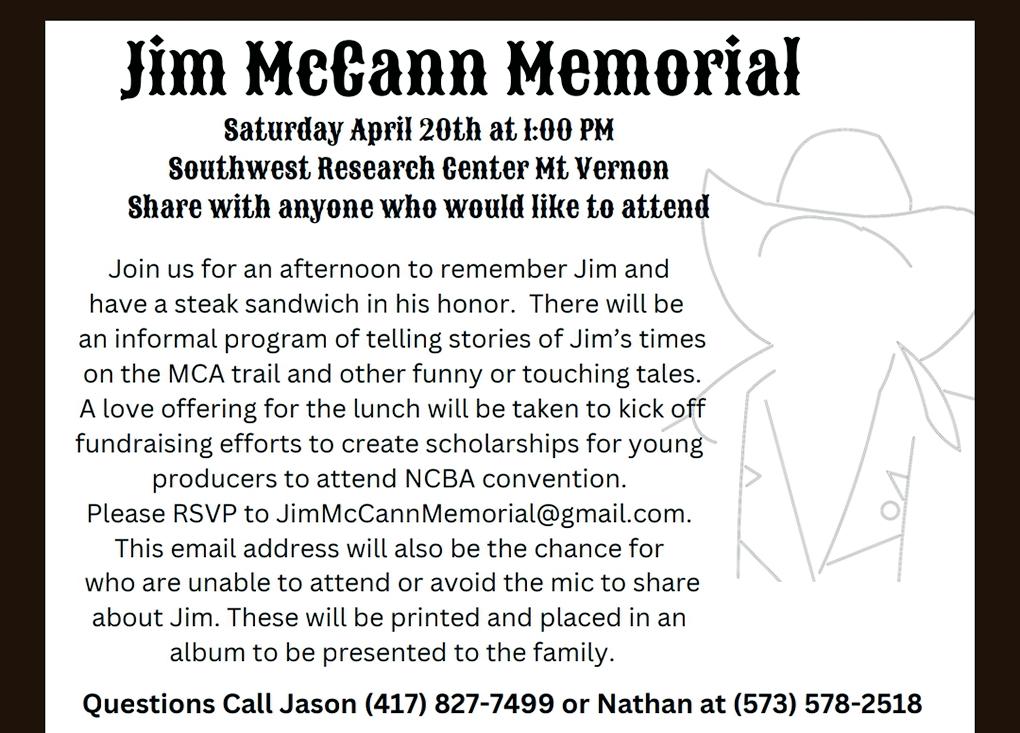
we prioritize and support; however, I’d argue the true benefit is legislators and cattlmen developing rapport and building relationships. In session and committee meetings, they may be the minority when it comes to supporting agriculture - they have to have evidence/ something to respond with in those arenas when our opponents point a finger at us. If we don’t equip these legislators with more than ‘please pass this bill’, we’re asking them to build us a house without providing any materials, much less any tools. In agriculture, we’re in the friend making business to create allies; let’s go make friends at the Capitol!
Our March meeting is always a great evening of learning; our inspiration for the month was found in Proverbs 15:22, “Plans fail for lack of counsel, but with many advisers they succeed” (Proverbs 15:22). From what I have seen recently from NCBA long range meteorologists, and recently a National Weather Service meteorologist out of Springfield - we appear to be transitioning back into a La Nina weather pattern for this summer. If possible, now is a great time to make some form of small (or larger?) preparation. It may be your grazing plan, establishing a new forage, soil fertility/organic matter testing, or even hay purchasing/ contracting. Either way, be sure to keep your eye on the weather outlook; having multiple people share various perspectives often aids to a clearer reality. Looking back, its easy to see how atomic moments in our lives shaped into greater things. If you’ve not been able to make it to one of our meetings, I’d like to invite you to join us - we have two more meetings before our summer break (April and May). I hope each of you have a Happy Easter with friends and family as we celebrate the resurrection of Jesus Christ. Remember, “Dreams don’t come true. Plans come true” (Larry Winget).
See you in April!
Nathan Isakson - President - Southwest Missouri Cattlemen’s Association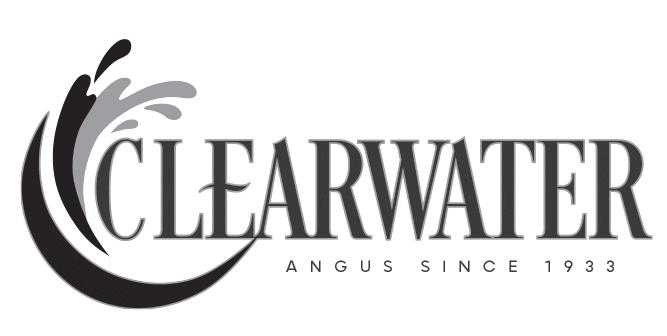
9770 W. State Hwy 266 • Springfield, MO 65802
Jim 417.827.0623 Joann 417.827.2756 clearwaterangus.com Bulls & Females | Quality Angus Beef

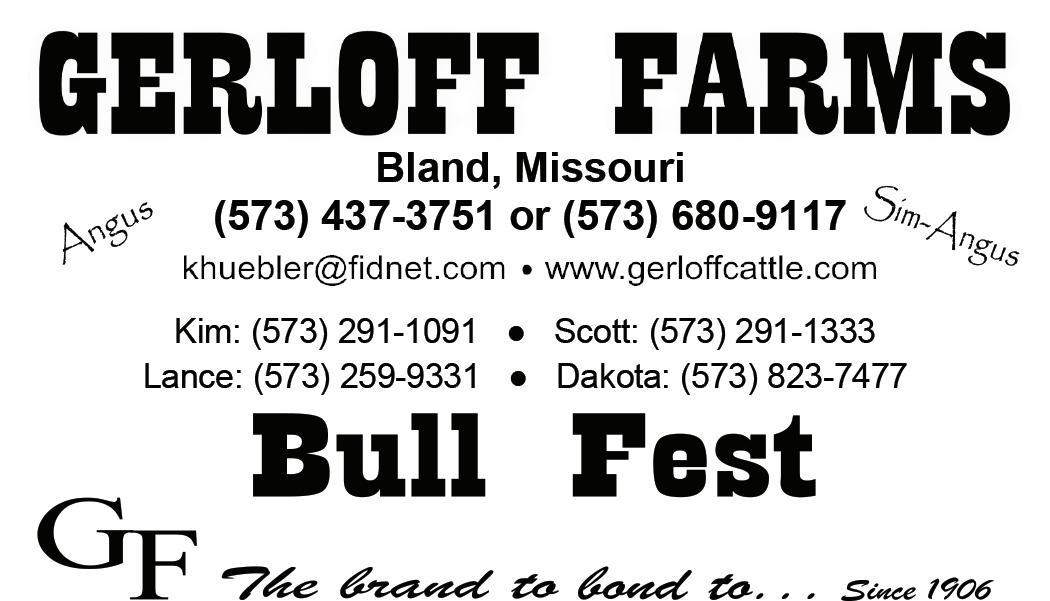
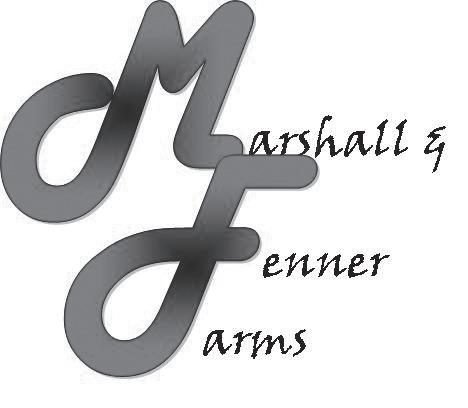
22227 Saline 127 Hwy • Malta Bend, Mo 65359 Brian Marshall • (660) 641-4522 www.marshallandfennerfarms.com

21658 Quarry Lane • Barnett, MO 65011 Office: 573-302-7011 • Fax: 573-348-8325
E-mail: meadangus@yahoo.com Website: www.meadfarms.com Alan Mead, Owner 573-216-0210
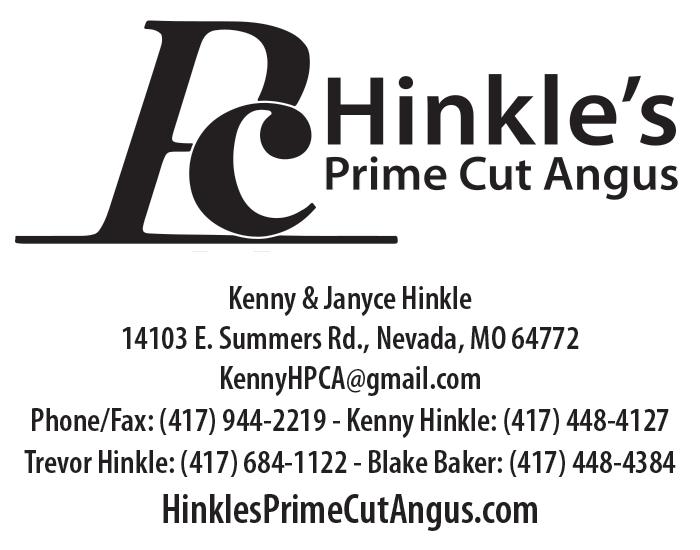
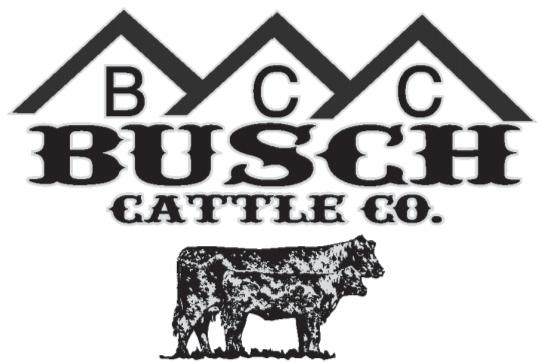
Registered Angus Cattle For Sale Drew & Tasha Busch 10761 Maries Co. Rd. 424 • St. James, Mo 65559 Office 573-699-4085 • Cell 573-864-6896
Russel and Randy Miller 21146 400th Street Graham, MO 64455 660-254-0137 • 660-415-6339
E-mail: galaxybeef@hotmail.com Bulls are our Business!
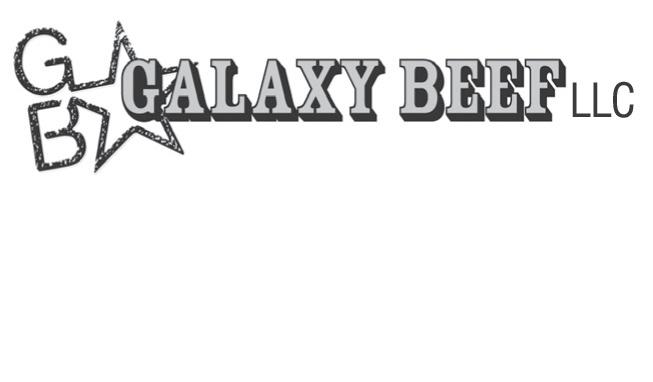
BuschCattleCo2001@gmail.com
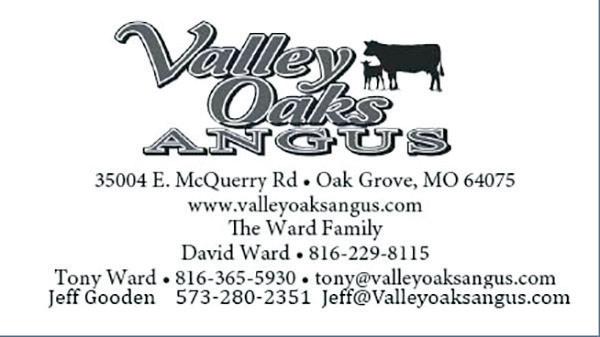
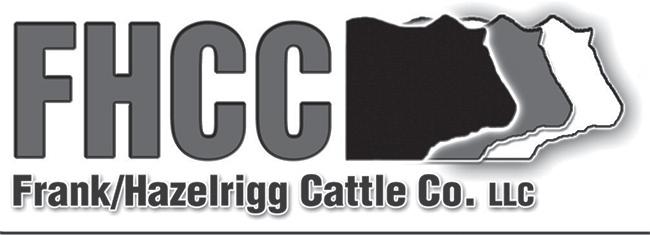
Doug & LaRee Frank 608-279-3172
Brent & Keri Hazelrigg 703-587-9959 Visit us online: FHCCbeef.com October 19, 2024
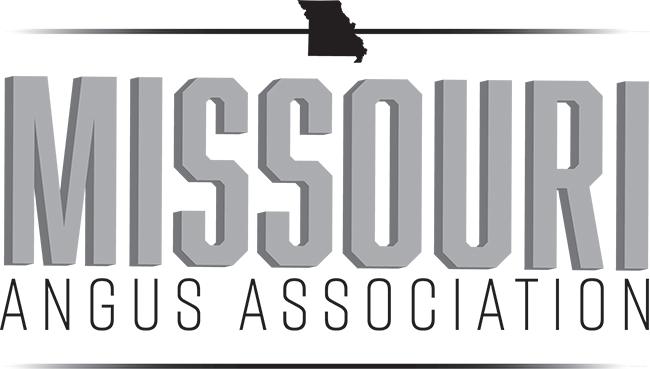
Julie Conover, Executive Director 634 S.W. 1201 Rd • Holden, MO 64040 734-260-8635
E-mail: Julie@missouriangus.org missouriangus.org
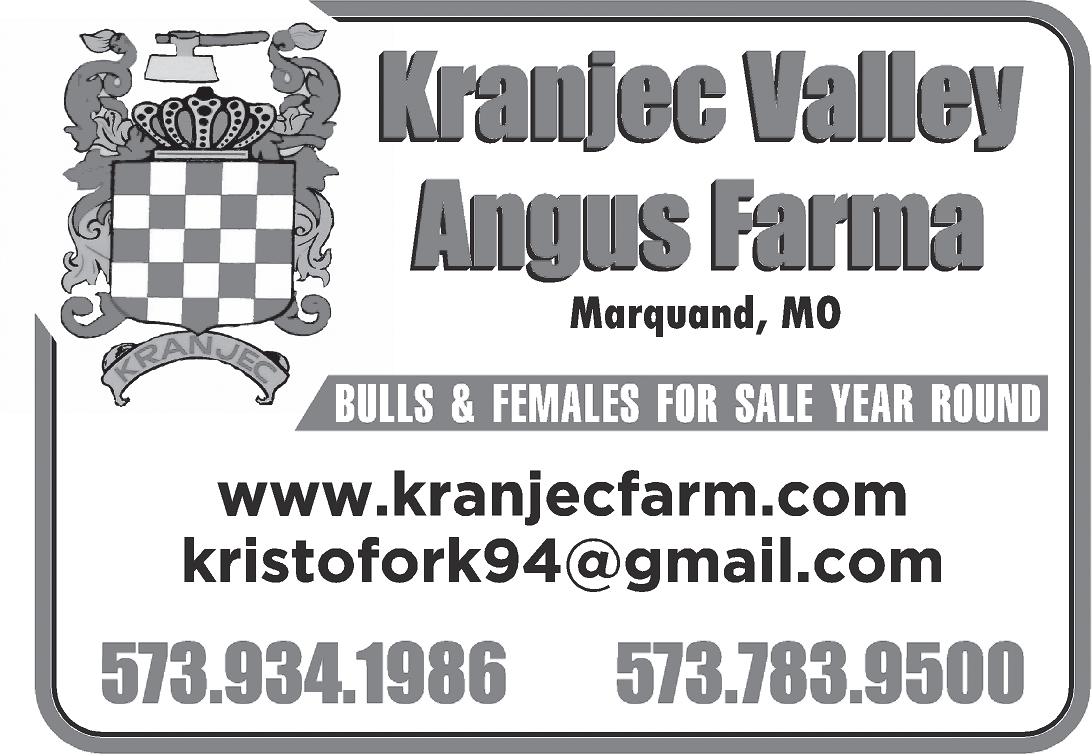
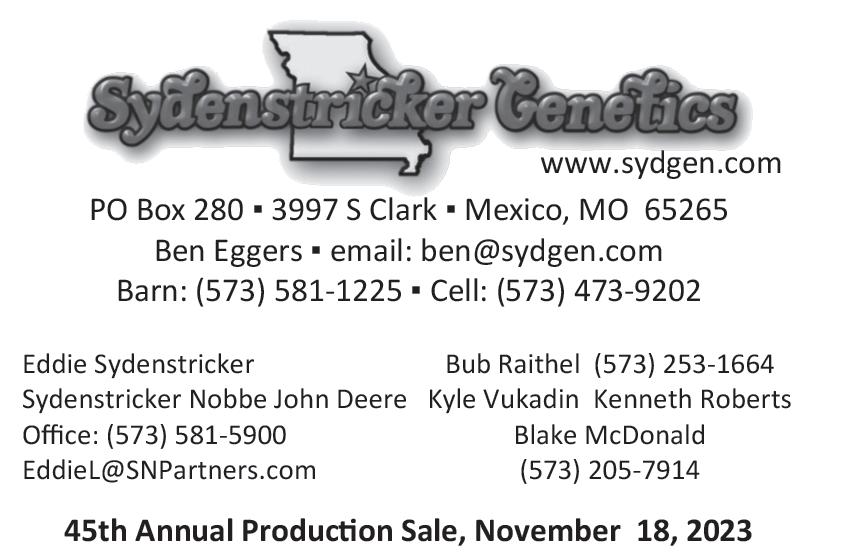
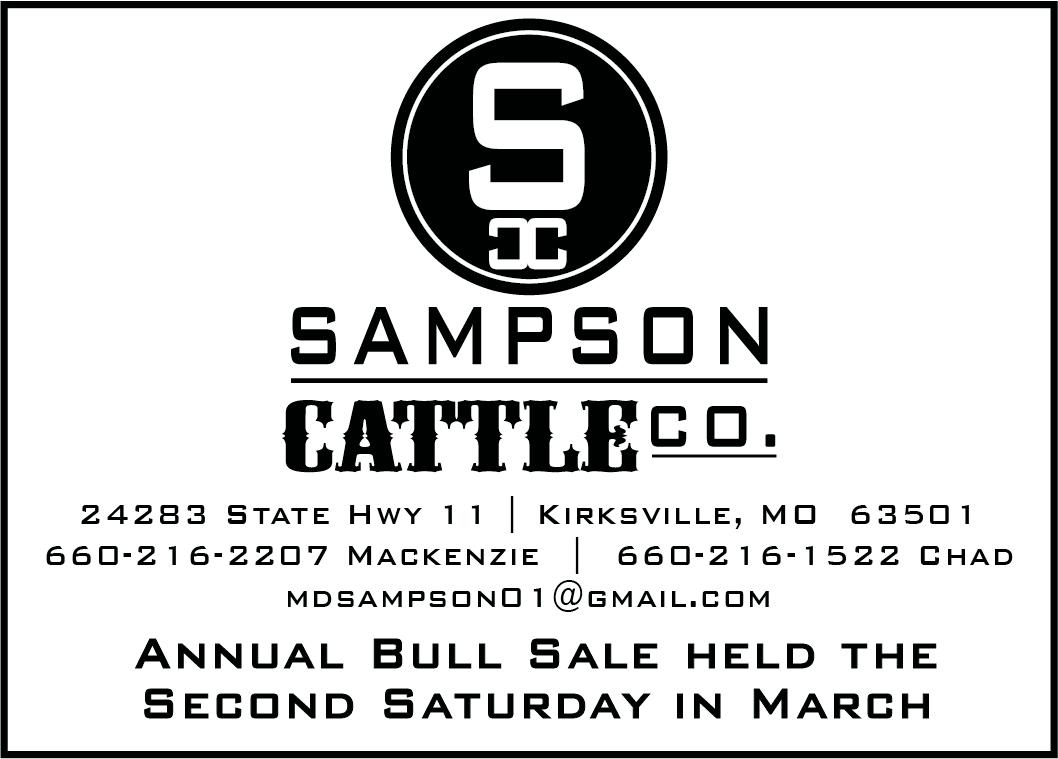
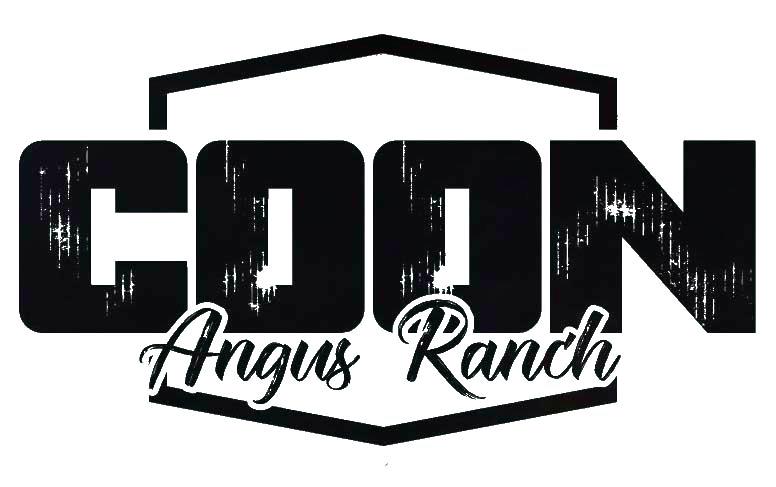
Vernon County Cattlemen held their annual banquet March 9 at the 3 Cedars Event Center. The event was well attended with approximately 150 people in attendance. Guests enjoyed a wonderful prime rib meal with all the trimmings, prepared by Kent and Kathy Abele and staff.
Special guests included Missouri State Representative, Dane Diehl, and Warren Love, Missouri Cattlmen’s Association Region 6 Vice-President. Both of these guests spoke briefly to those in attendance.
A big thank you goes to Cole Abele, Adam Ashby and Klay Beisly for conducting the live auction.
A huge thank you also goes to the many area businesses and individuals that donated silent and live auction items.
Our next meeting will be held in May, date to be
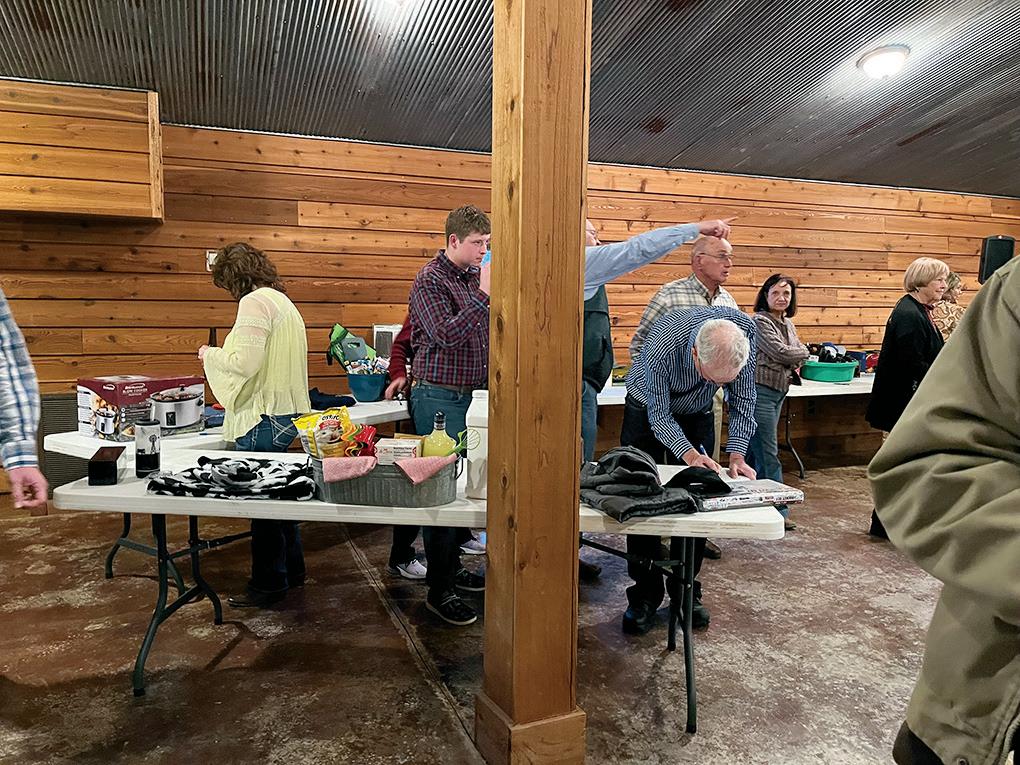
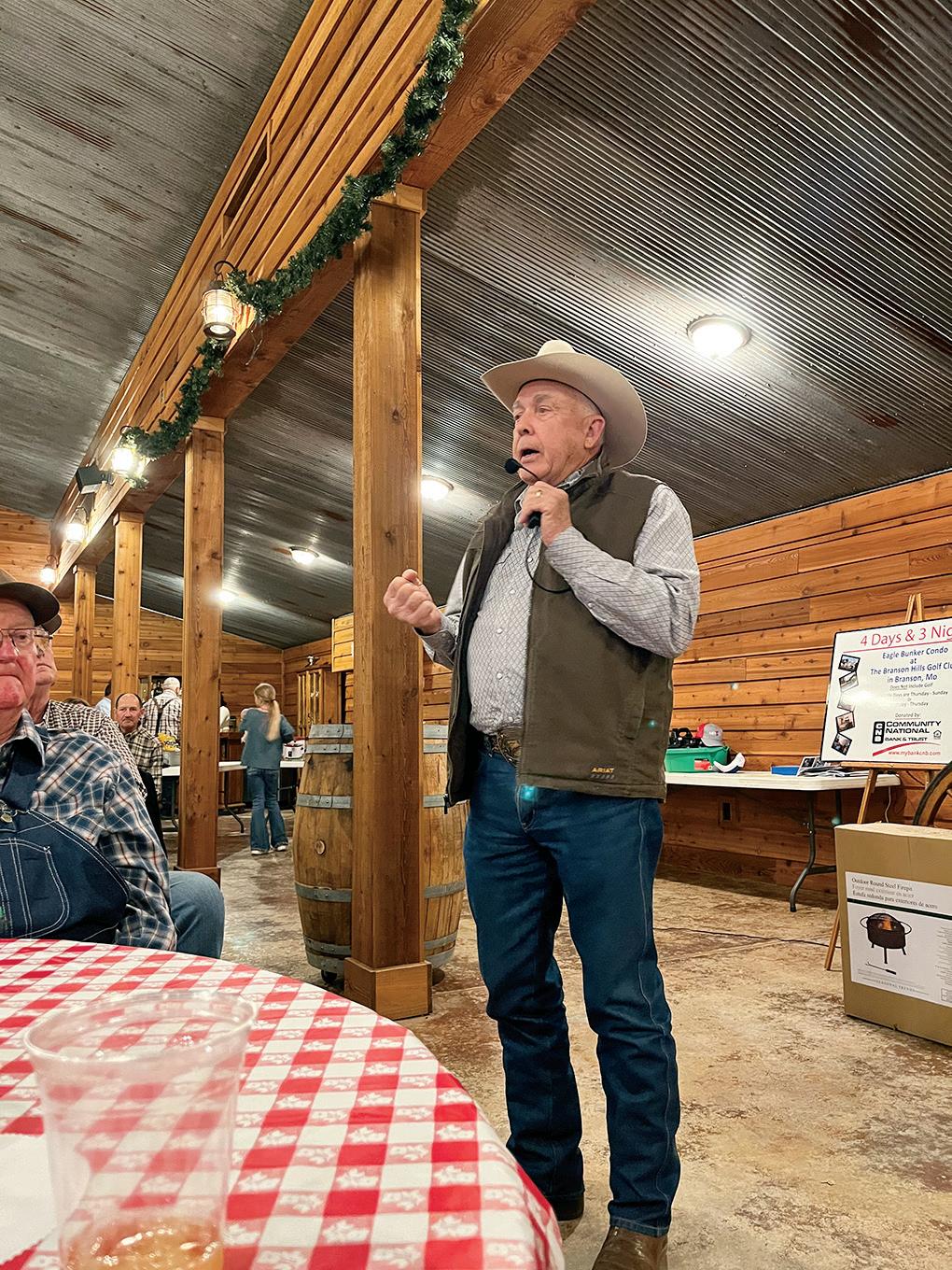
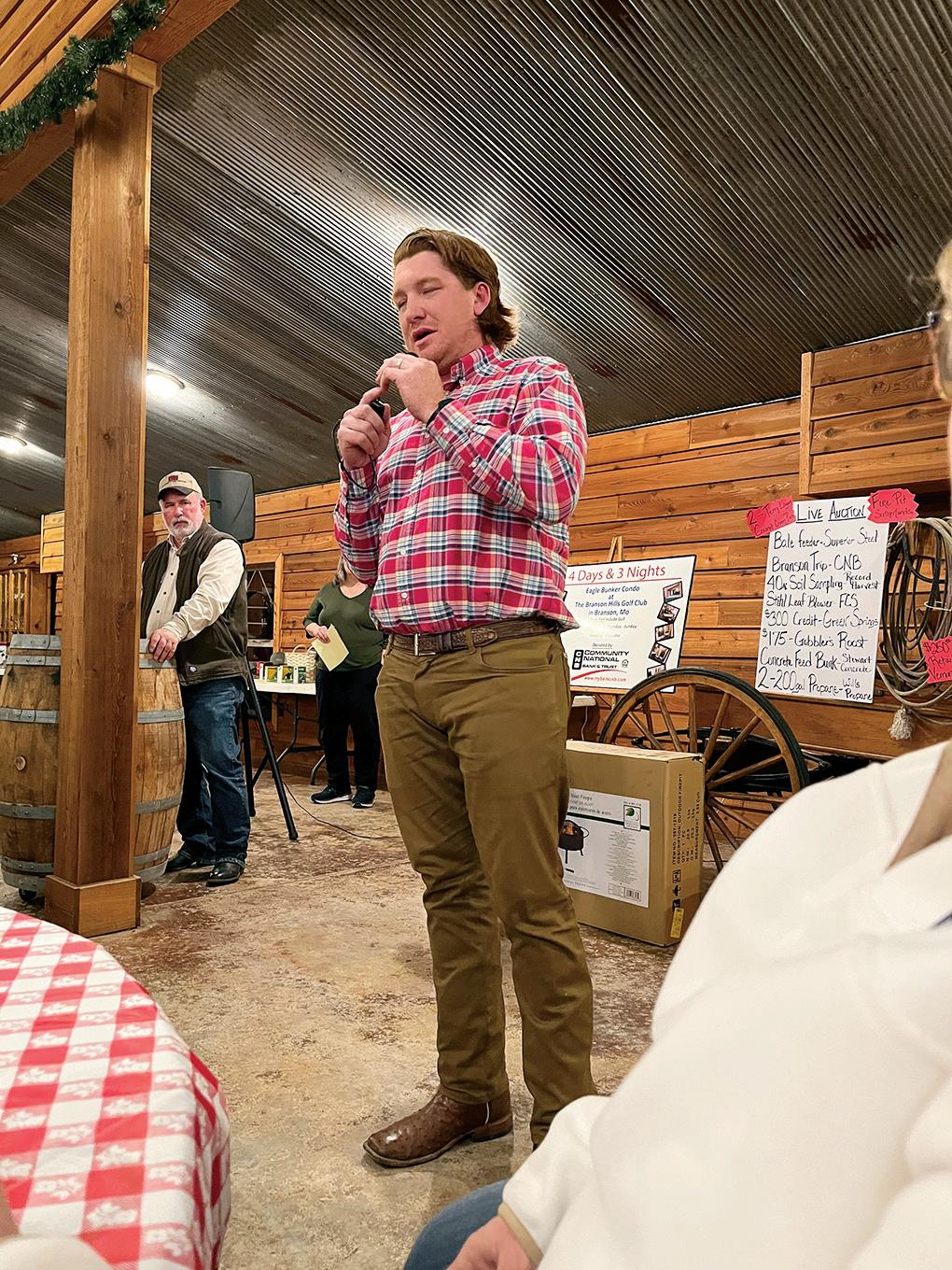
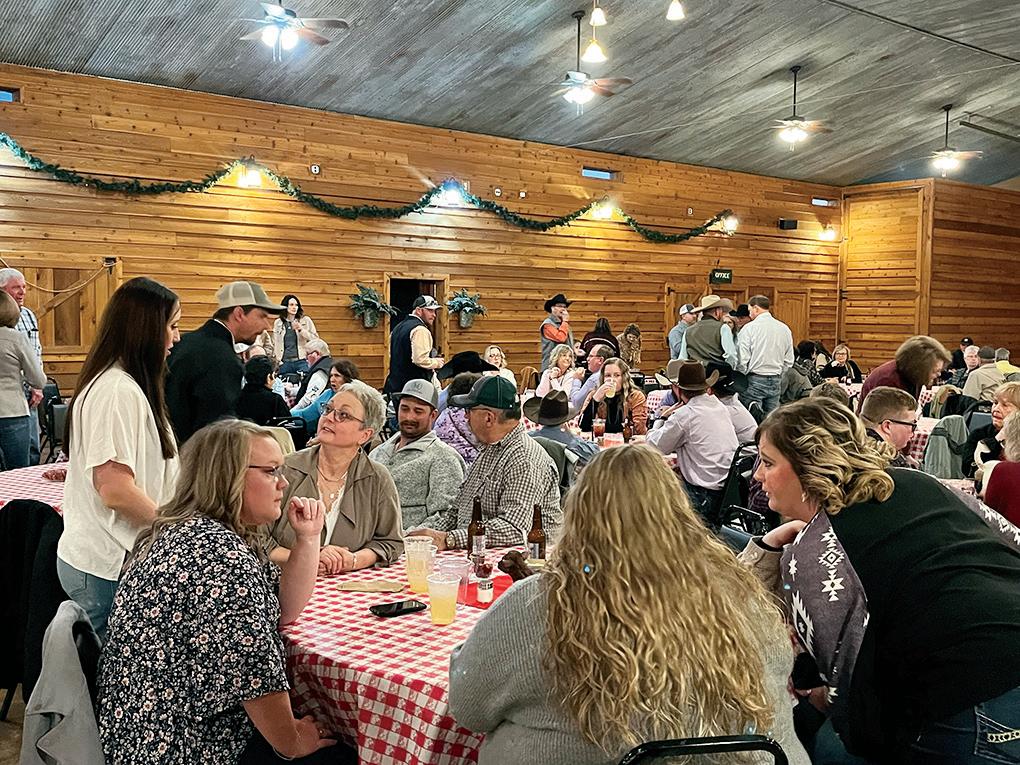
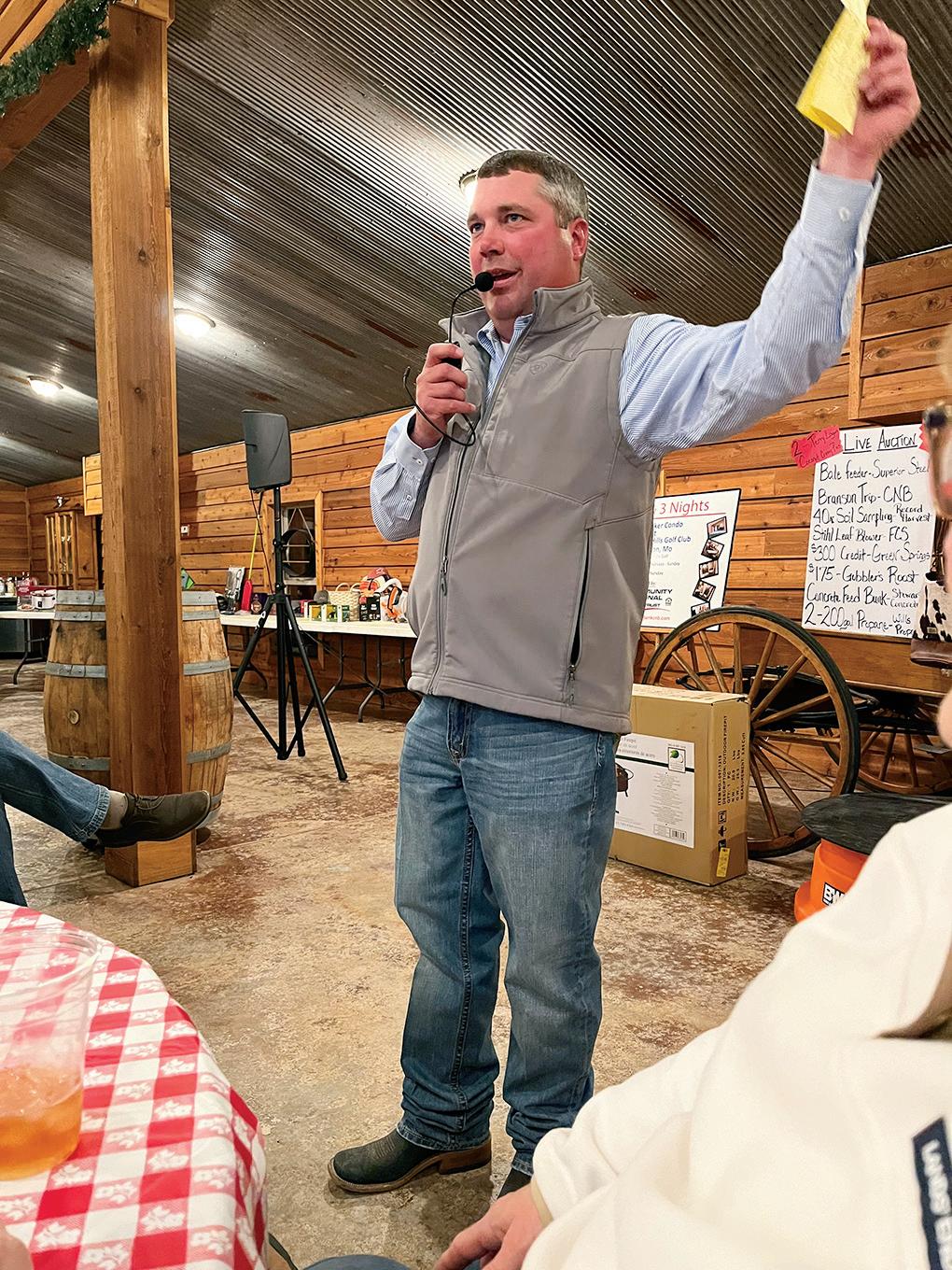
The Franklin County Cattlemen’s Association held their annual dinner meeting December 1 at the Gerald KC hall. MCA President David Dick was the guest speaker and Bill McClaren also gave an update regarding MBIC.
The membership of 110 were served 10 0z. ribeye steaks prepared by the board members. Along with the trimmings and homade Christmas cookies and ice cream. A silent auction was done on items donated by local businesses and individual members to benefit the
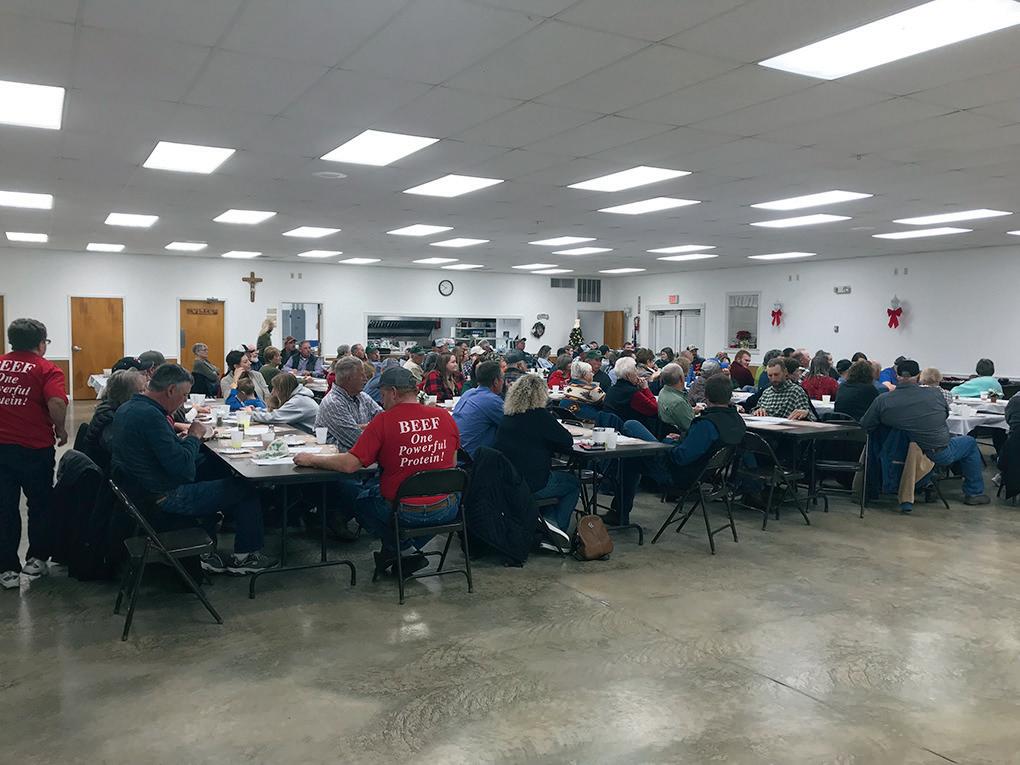
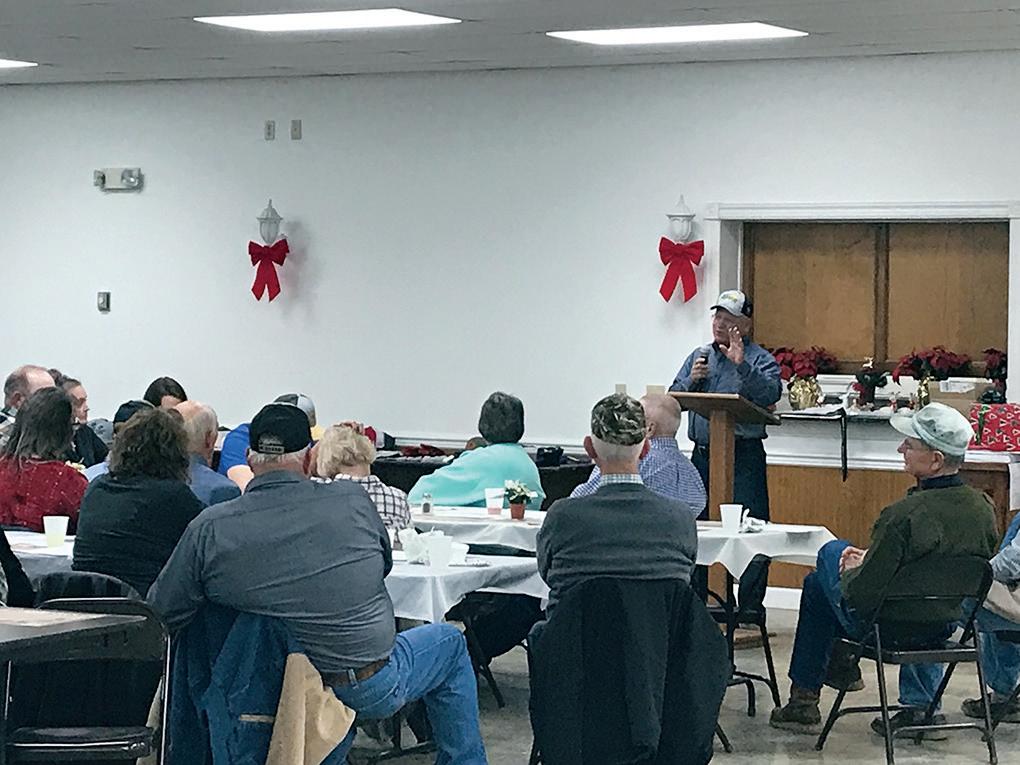
the post high school college students.
The herd health meeting was held in Union KC hall on February 10 and the BQA certification was held and done by Dr. Paigne. A roast beef dinner was served to 100 people. Our beef queen Miss Cady Koch gave her speech and sang the National Anthem prior to the certification.
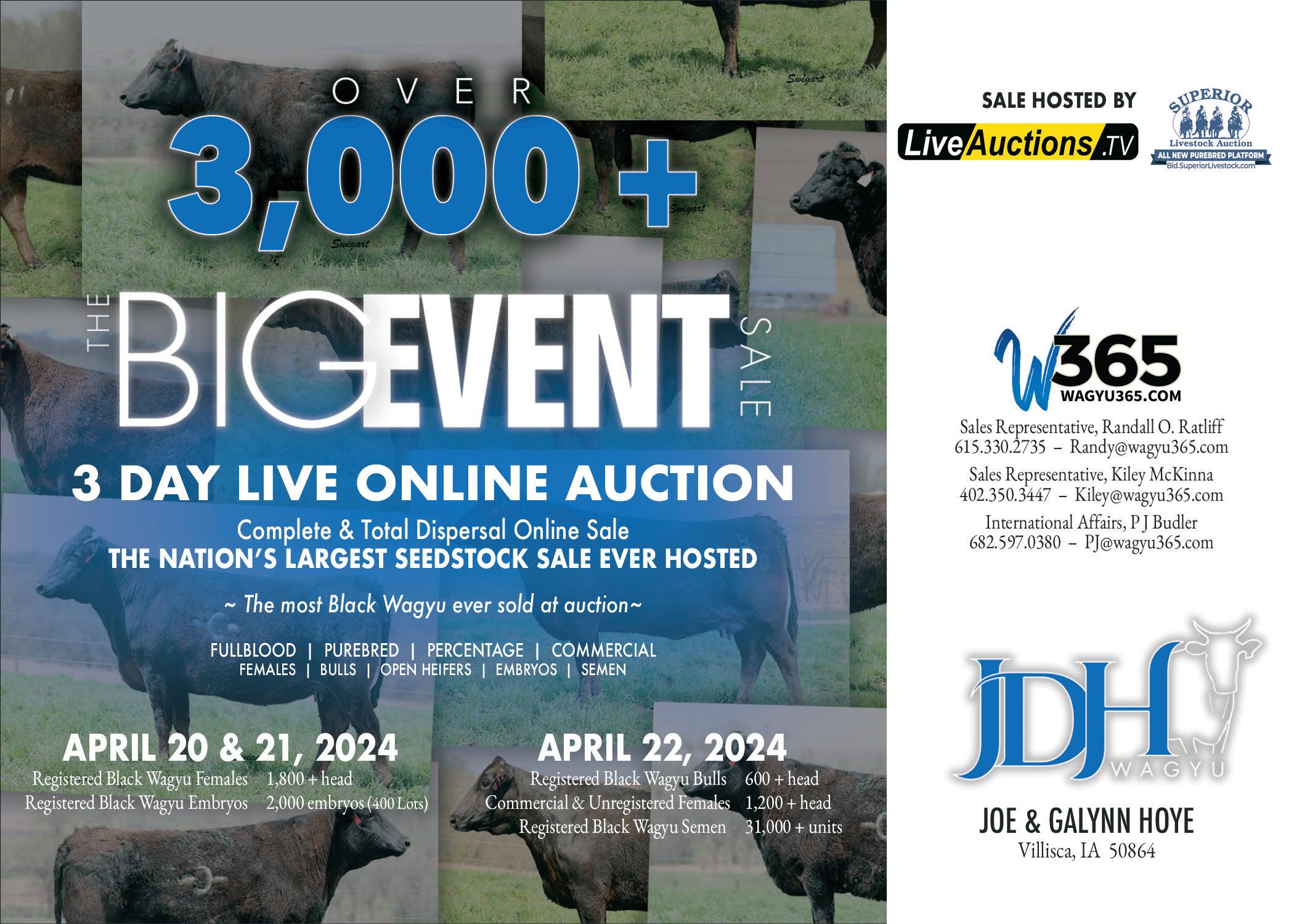
The Dallas County Cattlemen’s Association was very honored to host Lieutenant Governor Mike Kehoe at March 12 meeting held at Prairie Grove School south of Buffalo.
President James Henderson welcomed members and guests and introduced Mike Deering who thanked the group for placing trust in him as Missouri Cattlemen’s Association Executive Vice-President the last 11 years. He then introduced Kehoe and told the group if agriculture is important to us and we want to sustain our industry, then we have one choice for Governor being Mike Kehoe.
Kehoe talked about his humble beginnings as the youngest of six children growing up in inner city St. Louis. His father left home when he was only one year old. At 15 years of age he washed cars to help out his family. The owner of the car wash owned a farm-where he began working for the owner. He bought his first farm at 22 years old, and he has been in the cattle business almost 40 years.
Kehoe talked about government not being the solution to problems. He said, “They are the problem usually.” He commented that governing is not easy. Agriculture families have helped him the most, and he is proud to boast that he is endorsed by all agriculture groups in Missouri, including the Missouri Cattlemen’s Association.
He wants to make sure that young people have a future in agriculture. His goal is to make Missouri a better state. He touted his Mother telling him to Love the Lord and work hard.
Kingsville, Missouri
Hwy. 58 • 45 Miles SE of Kansas City, MO
Circle A - Closed Cow Sales
April 5 and April 19 • 6:00 p.m.
Special Cow & Bull Sale Saturday, April 26 • 5:00 p.m.
Cattle Sale Every Tuesday 10:30 a.m.
For information call Rick, Jeremy, or Jared Anstine 816-597-3331
Visit our website kingsvillelivestock.com or E-mail us at: anstineauction@gmail.com
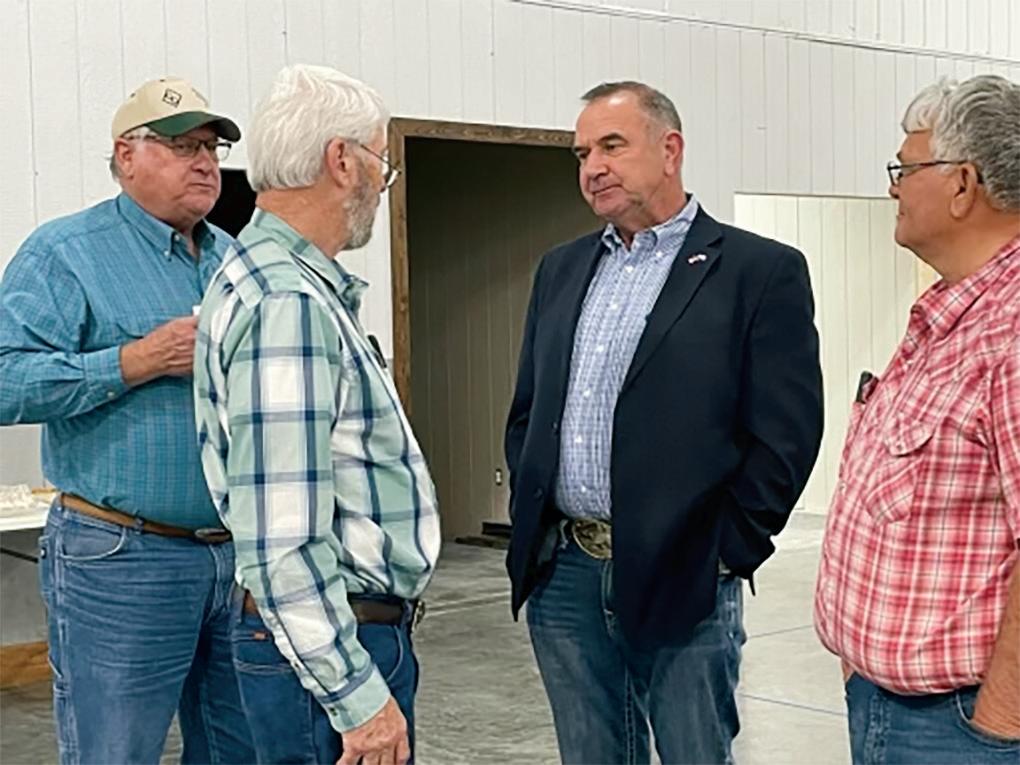
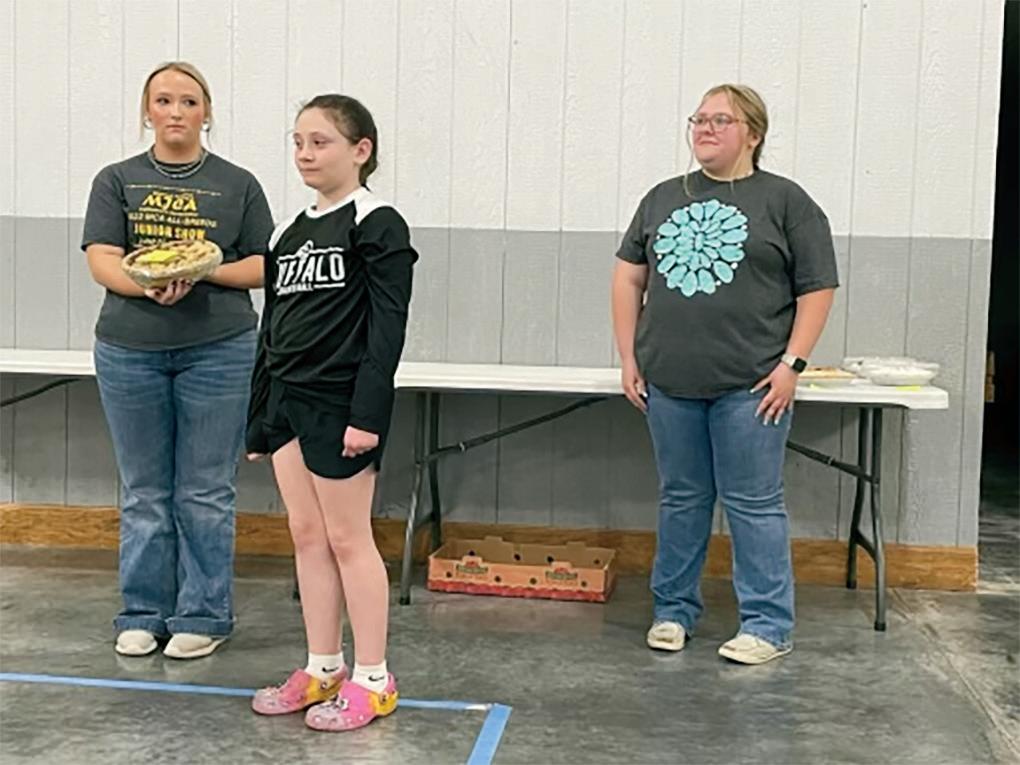
Also speaking to the group was Region 6 Vice-President Warren Love. He praised Kehoe for being a practical, hard working individual. He familiarized and cautioned the group about the Butcher Box, a company from Australia with 435,000 followers from the U.S. on Instagram who are buying its organic grass-fed beef.
Buffalo FFA officers Paige Henderson and Jordan Tucker gave an update to the group about their chapter’s recent activities. Closing out the meeting was the DCCA annual pie auction benefitting the scholarship program. Molly McCorkill once again had the high selling pie. Her cherry pie commanded the top price of $450. The pie and dessert auction brought in $2,615.00 this year. We want to thank everyone who donated items as well as those who bid and took home some delicious goodies. Earlier in the evening the 130 in attendance enjoyed grilled hamburgers and hotdogs as well as sides provided by DCCA. Thank you to Aaron and Gloria Miller and their crew who chaired the grilling and cooking duties.
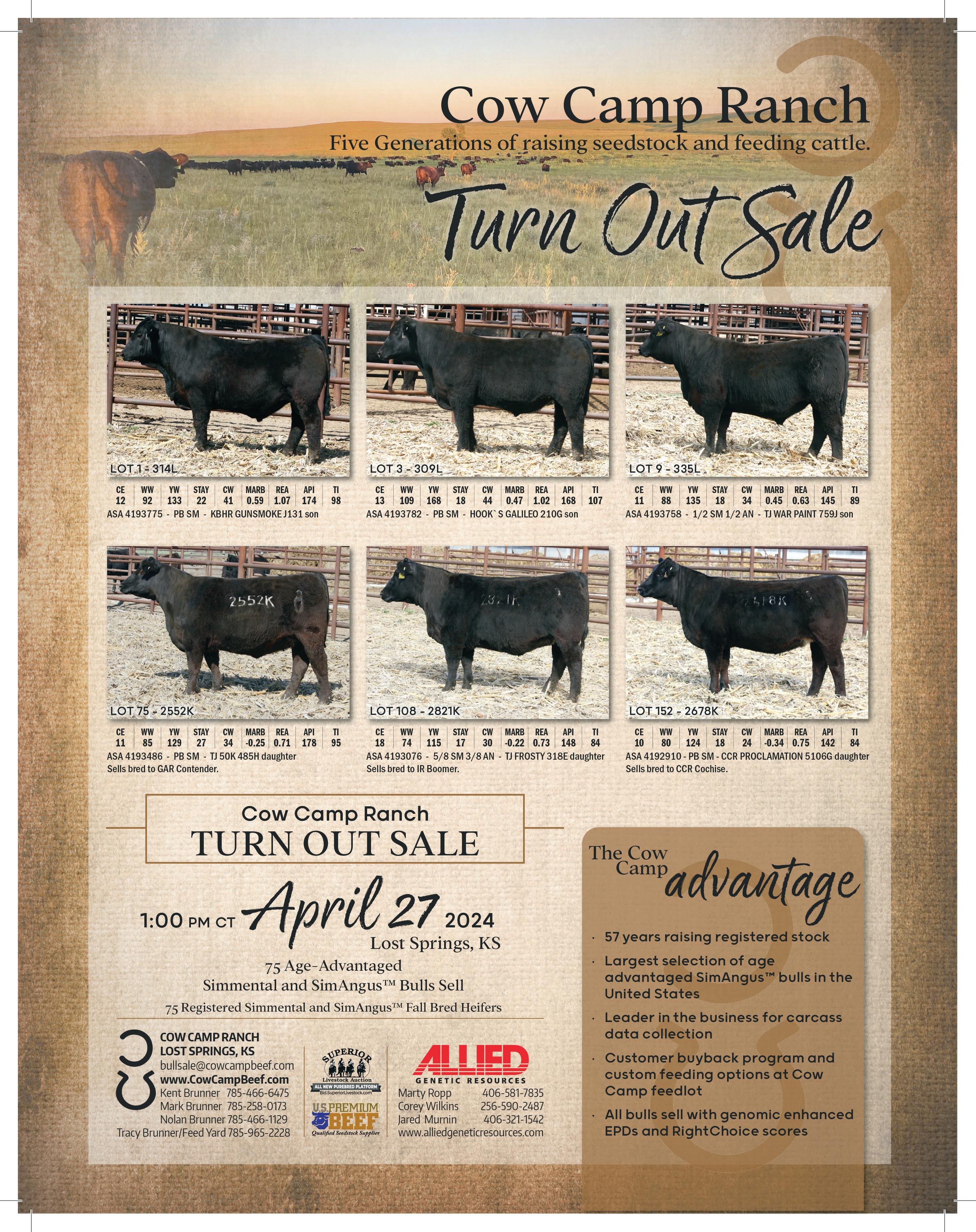

This month was our first gathering at the CMH Community Room at Lime Bank. We had approximately 70 members and guests present. We enjoyed a delicious dinner catered by CMH. The meeting got right down to business as Howard Hardecke gave the 2023 treasurer’s report. Then Matt Henenberg gave a few updates for the upcoming Missouri Beef Days. He explained the schedule of events and highlighted some changes and additions from last year. There is so much fun planned that you don’t want to miss. Keep up with all the happenings on the website at missouribeefdays.com or keep an eye on their Facebook page.
Our meeting sponsor, IEP Metals and Fabrication, gave a presentation on the various products and services they offer. They are a family-owned company located in Fair Play, Mo. They provide system integration with today’s top industrial automation systems through engineering, fabrication, programming and onsite installation. They also provide metal supplies for residential and commercial projects. This includes metal roofing, siding, trim and accessories. IEP Metals and Fabrication stand behind two generations of experience and are committed to their customers. They have a unique ability to effectively listen and design customized
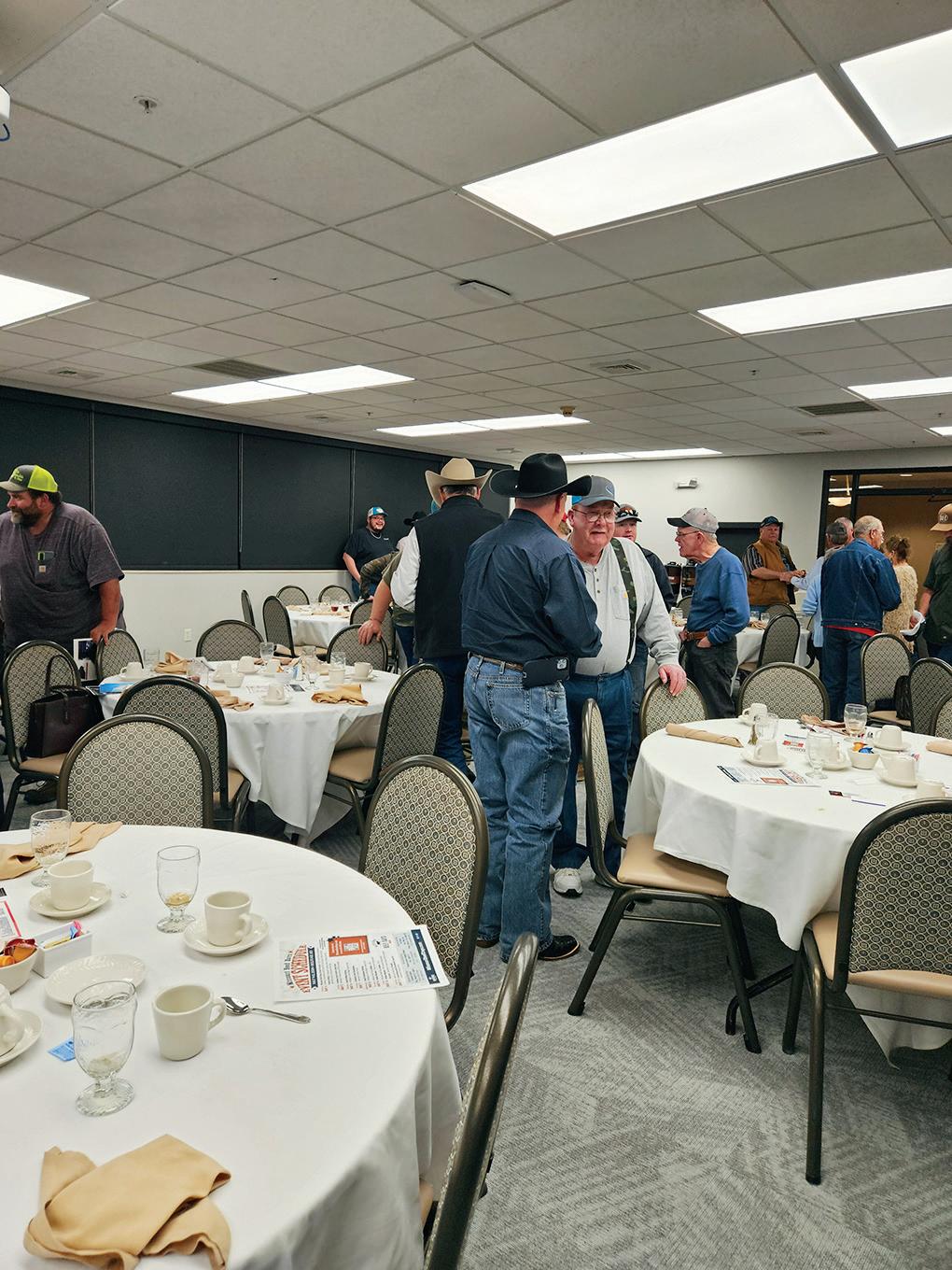
Service age bulls, bred cows, cow/calf pairs, show prospect heifers available. 417-652-3425 417-839-7205 www.oryscircle7.com
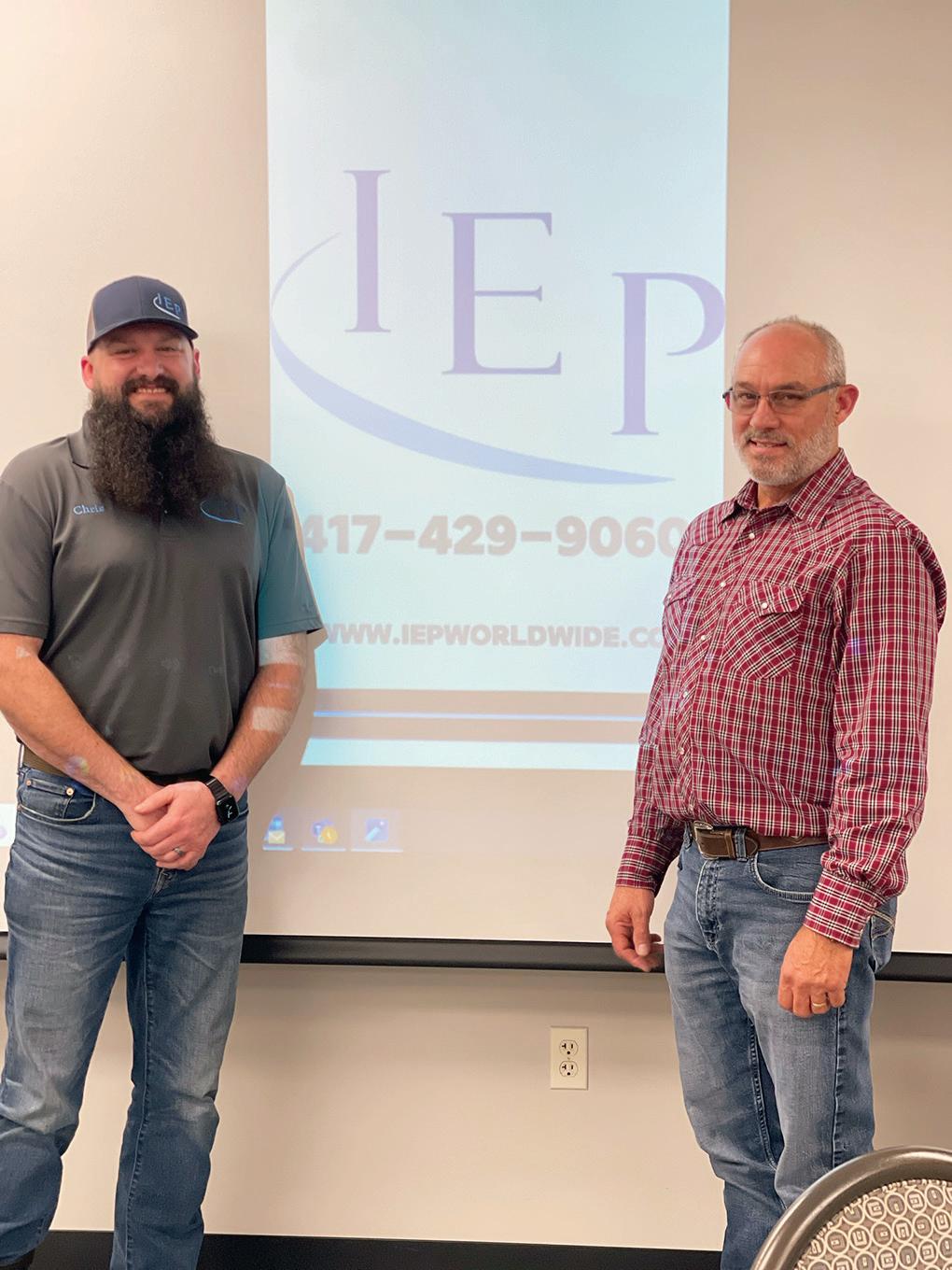
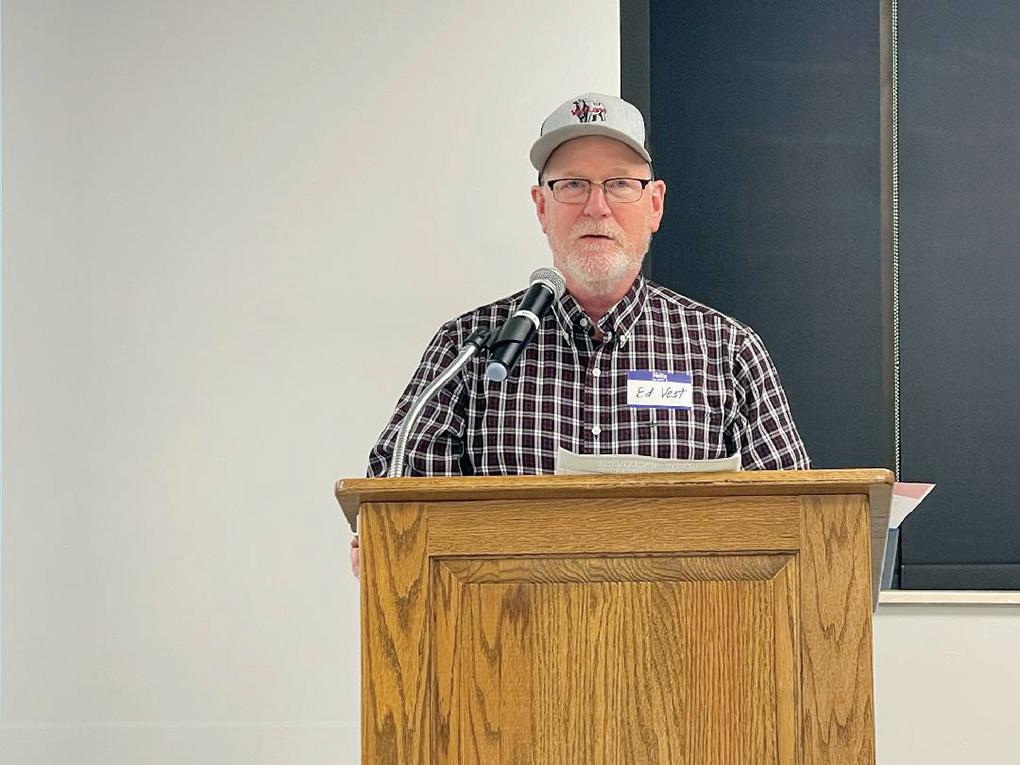
During the meeting we “passed the hat” to collect funds to benefit the Texas Southwest Cattle Ranchers Disaster Relief Fund. As farmers we know what it is like to experience tough times. Our hearts go out to all of those affected by the Texas Wildfires. To be able to show our support is a common thread of our organization. To lend a helping hand to our fellow beef producers, ranchers, and farmers is what it is all about. Our members generously filled the hat with $1,461. The board added $539 to bring our total donation to $2,000.
Our next meeting will be April 11, 2024. We will be gearing up for the Beef Days opportunities to share our love of beef with the community. We have cookings at the Bolivar area schools this year and would love your help. Also, be on the lookout for the cut-out cows that decorate the city leading up to and during the event. We hope to see you soon.
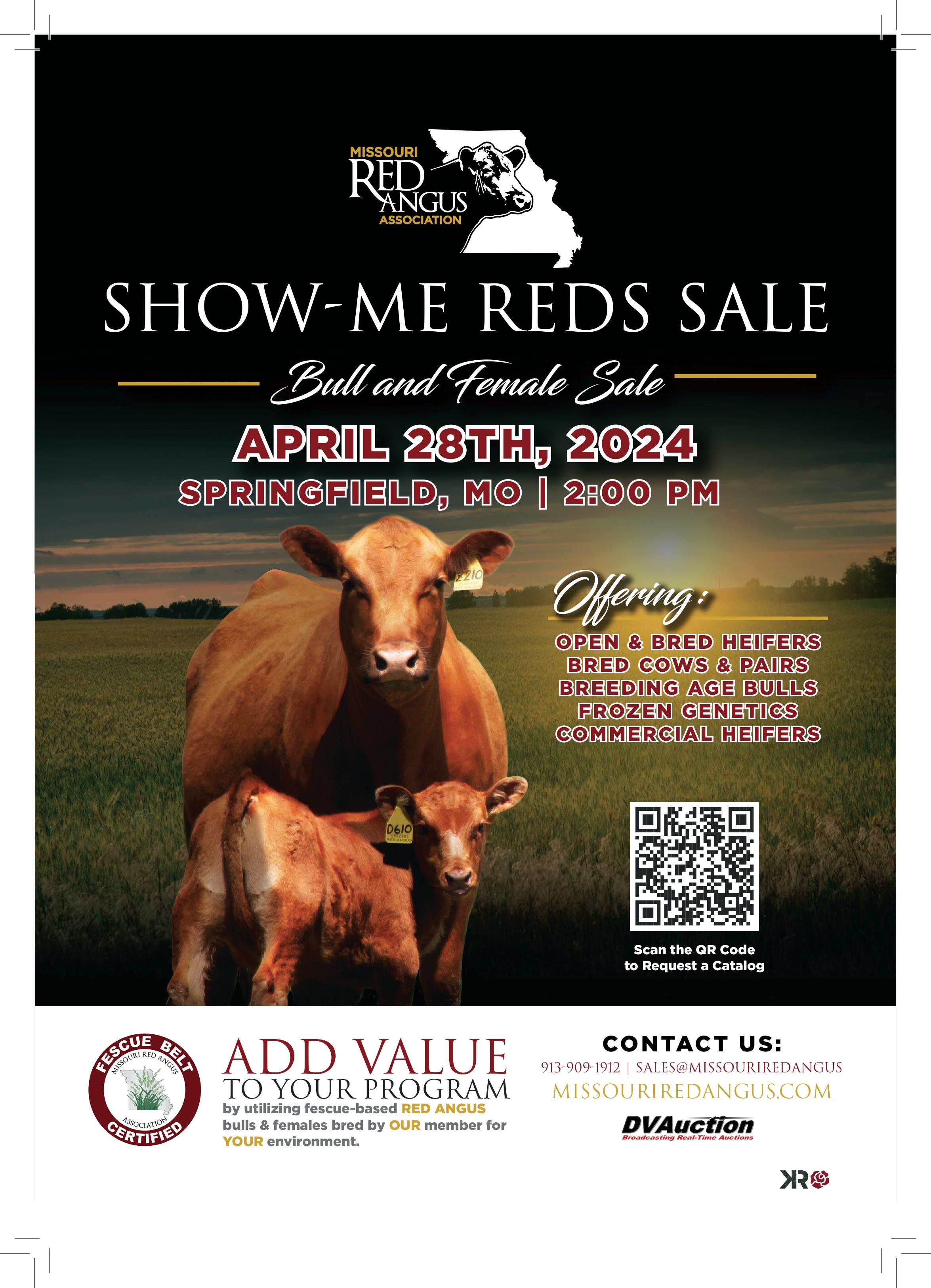

St. Clair County Cattlemen’s Association met on Tuesday, March 12, at Landmark Restaurant in Lowry City with 39 members and guests present.
Shelby Skinner with Preferred Livestock Products discussed products that might fit various cattle nutrition needs. Skinner discussed some of the different tubs options including the Game Changer; Profit Builder; Forage Booster; the Stockman. She explained the differences in each tub and how they be used for different operations. The Game Changer products have the highest standards and expectations for performance. The Profit Builder is used in commercial cow/calf operations with high stress weaning and artificial insemination for shortened breeding seasons and replacement heifer and bull development. The Forage Booster is a high-quality mineral and vitamin that will be like most quality bagged mineral products on the market. The Stockman is your economical basic tub in the marketplace. Skinner stated the questions producers must answer to decide on tub options are, what do you want from your cattle; how do you want them to perform and what do you expect from them in the end. Answering these questions will help determine what tub best fits your needs and cowherd, Skinner said.
Thank you, Shelby Skinner with Preferred Livestock Products for sponsoring and Landmark for cooking a delicious meal for our meeting!
St. Clair County Cattlemen are working to sustain the MoBeef for MoKids Program. Our last round of MoBeef for the schools went on March 1. Any person or business interested in donating please contact Weston Shelby or Lawanna Salmon. We would also like to Thank the following who have donated to the program in 2023 - Community First Bank, Dull & Heany LLC, Gregg Smith Ford, Hawthorne Bank, Jim Falk Motors, Legacy Bank and Trust, Oakstar Bank, Jim Raysik, Inc., Don Payton DDS, Eddie Meredith, Weston and Julie
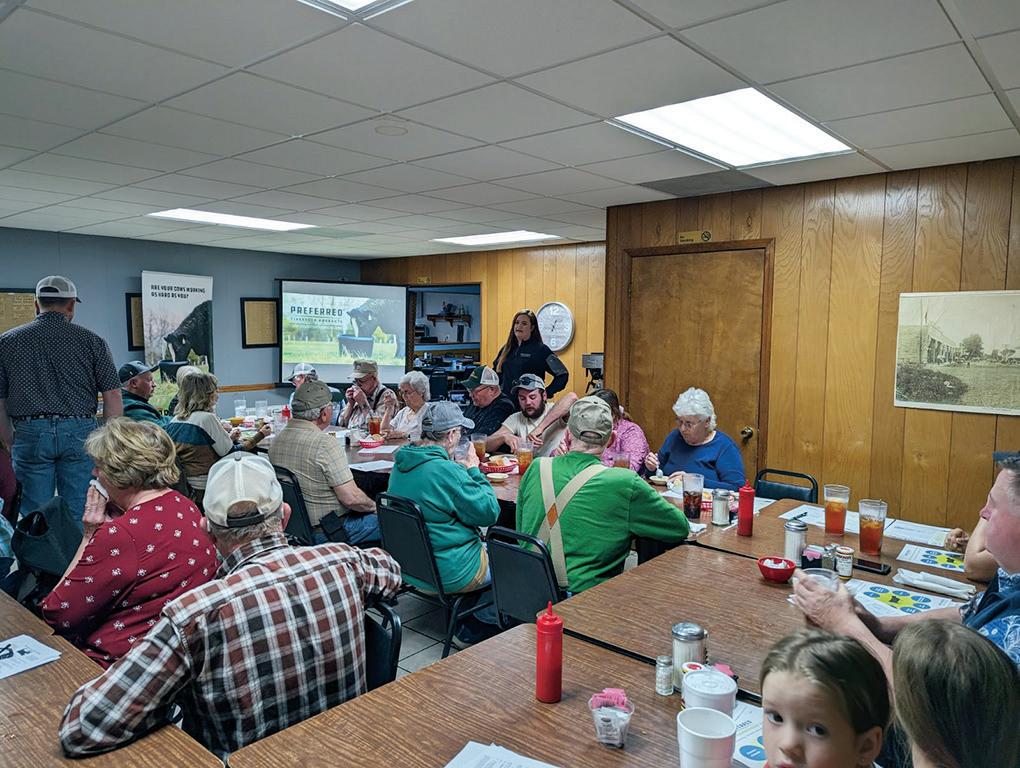
and Lawanna Salmon, Christian Women’s Fellowship, St. Clair County State Bank, Philip and Carol Johnston, Sue Hemenway, Wheeler Livestock Auction, and Stinnett Tire and Service LLC.
St. Clair County Cattlemen’s Association are offering two $2,000 scholarships to eligible graduating high school seniors or second year college students. If you meet the following qualifications, we would love for you to complete the application.
St. Clair County Cattlemen’s Association
Memorial Scholarship In Memory of Paul Tom Firestone, Orval Johnson, David Barger, And Larry Moore Criteria:
1. The applicant must be a resident of St. Clair County.
2. Applicant must be a high school senior or a full-time college student and have a GPA of 2.5/4.0 or better. Applicant must have been a full-time student (high school or college) the previous year.
3. The applicant must major in an agricultural-related field.
4. Scholarships will be presented at the Annual St. Clair County Cattlemen’s Meeting. To redeem scholarship, recipients must provide St. Clair County Cattlemen’s Association with proof of college enrollment.
5. Applicant must submit, with the application, the most recent available high school or college transcript to St. Clair County Cattlemen’s Association for proof of grade point average and enrollment.
6. Applicant must demonstrate leadership potential through extracurricular activities and work experience.
7. Preference may be given to those who have a need for financial assistance but is not necessarily the determining factor. Preference will also be given to students who plan to/are attending Missouri colleges and universities.
8. Applications must be returned to St. Clair County Cattlemen’s Association, Susan Salmon, 5775 NW 651 Rd, Appleton City, MO 64724 and be postmarked by April 1 to be considered.
Email Susan Salmon at rsranch74@hotmail.com to request your application today!
St. Clair County Cattlemen are holding a scholarship fundraiser for a 22 Henry Golden Boy. Tickets are $5 each and the drawing will be held on August 31, 2024
Next Meeting scheduled for April 9, 2024, at 7 p.m. at Farmhouse Restaurant with the Sponsor/Speaker as Appleton City Feed Service.

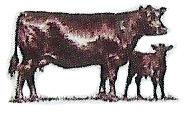
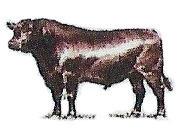
Ken & Brenda Keesaman
816-675-2503 • C: 816-390-4988
Kody Keesaman 816-724-1432
Kolten Keesaman 816-808-2846 3803 SW Rogers Rd. • Osborn, MO 64474
Ken@kkfarmsredangus.com www.kkfarmsredangus.com Visit
on Facebook at KK Farms Red
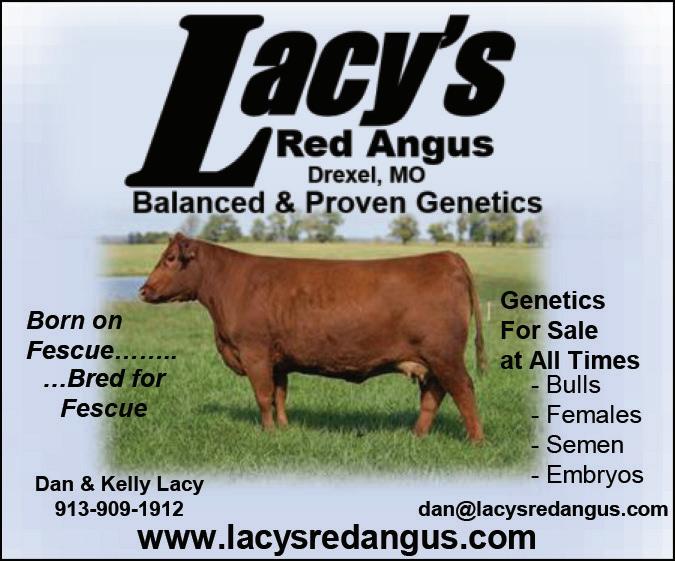
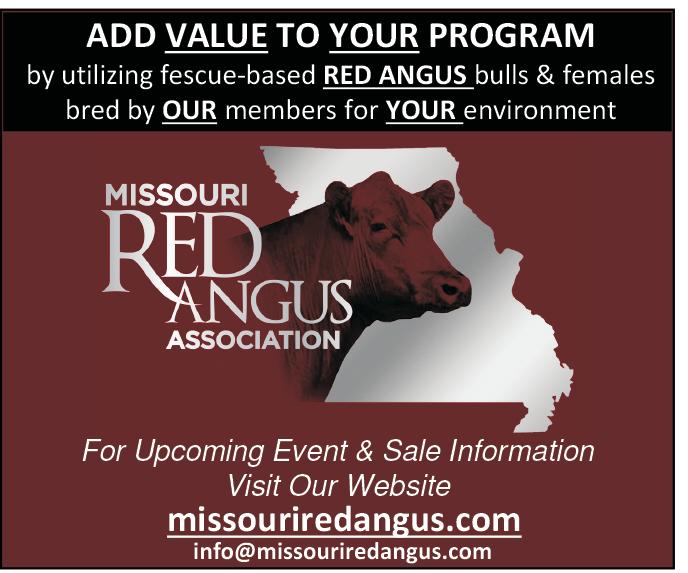
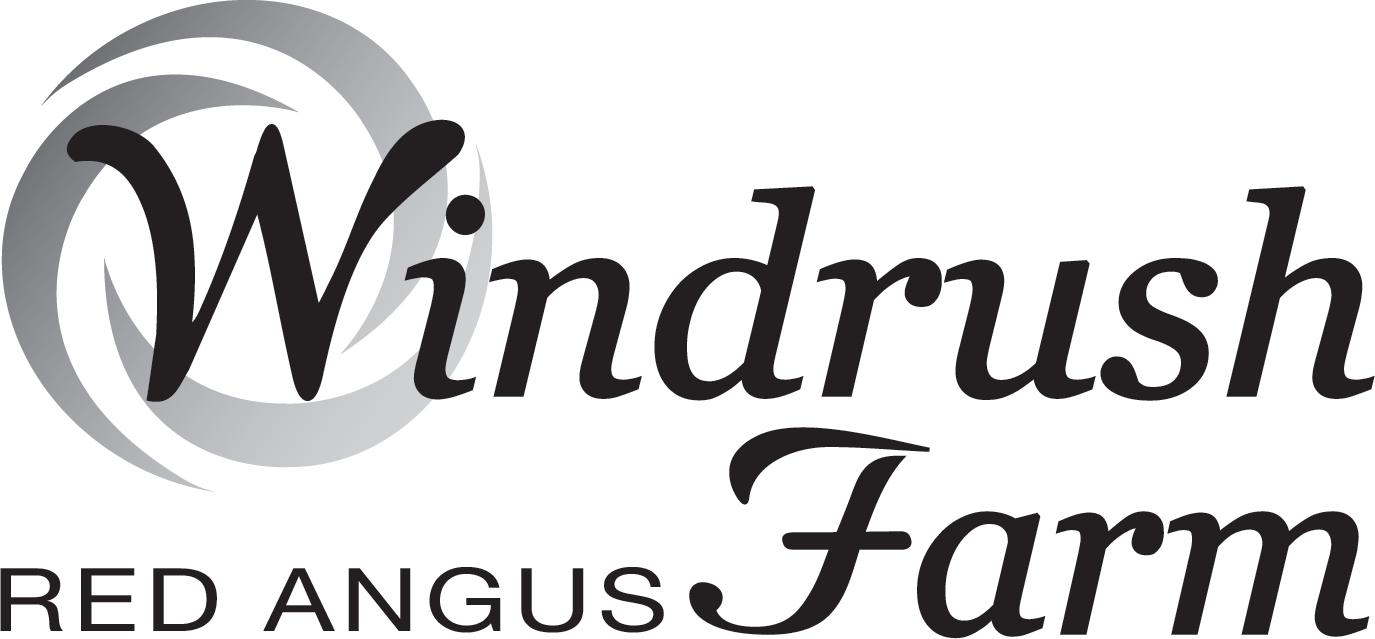
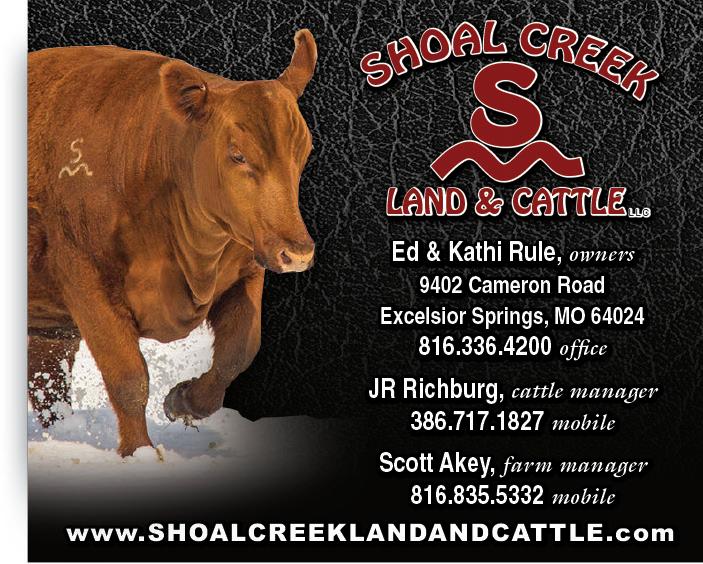
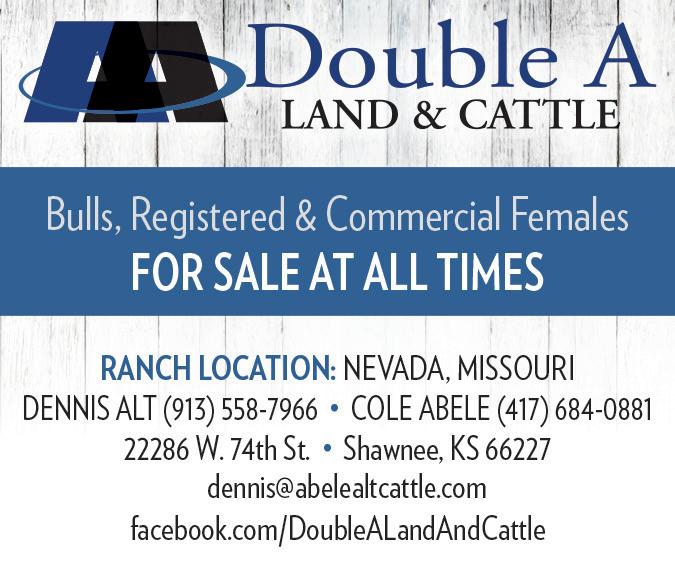
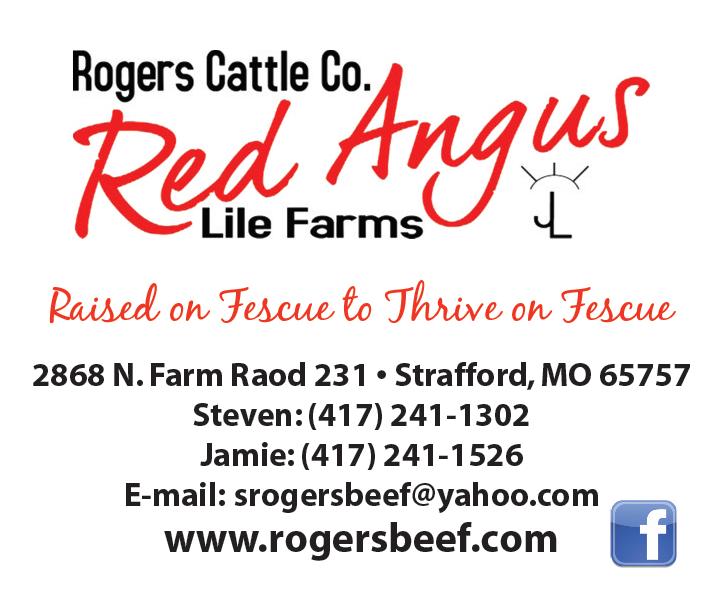
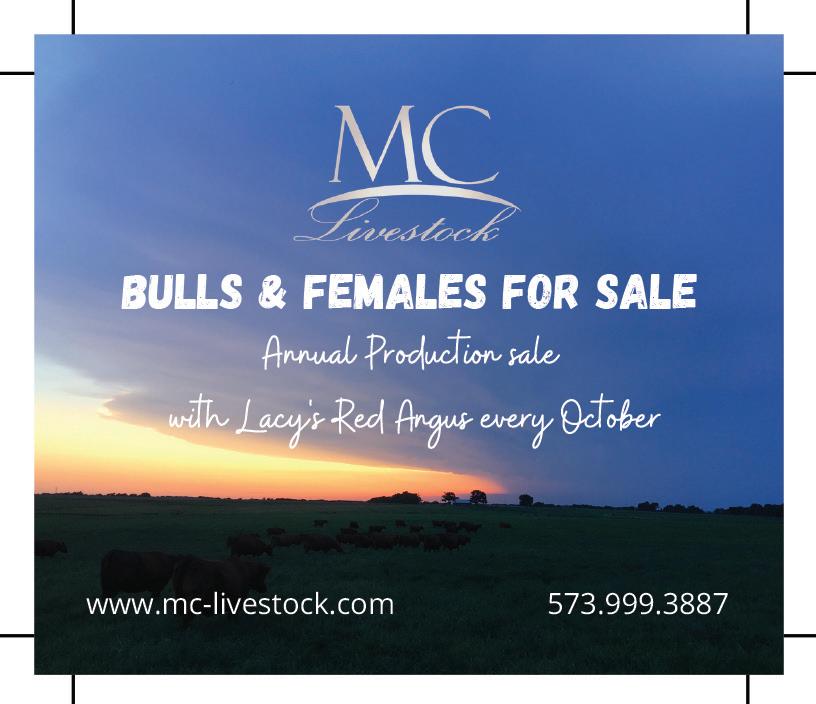

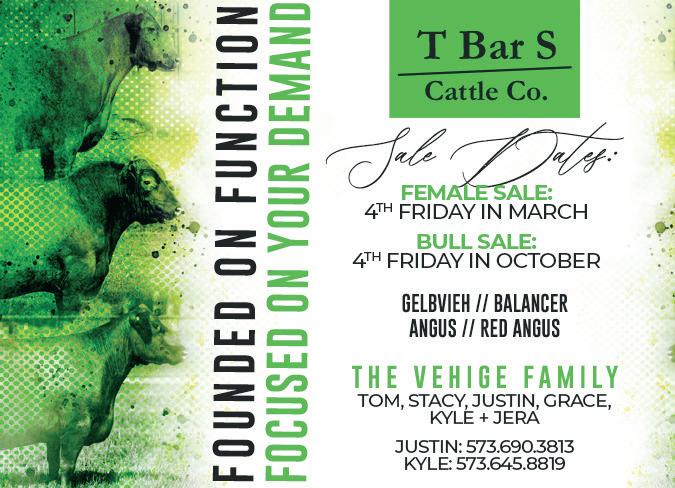
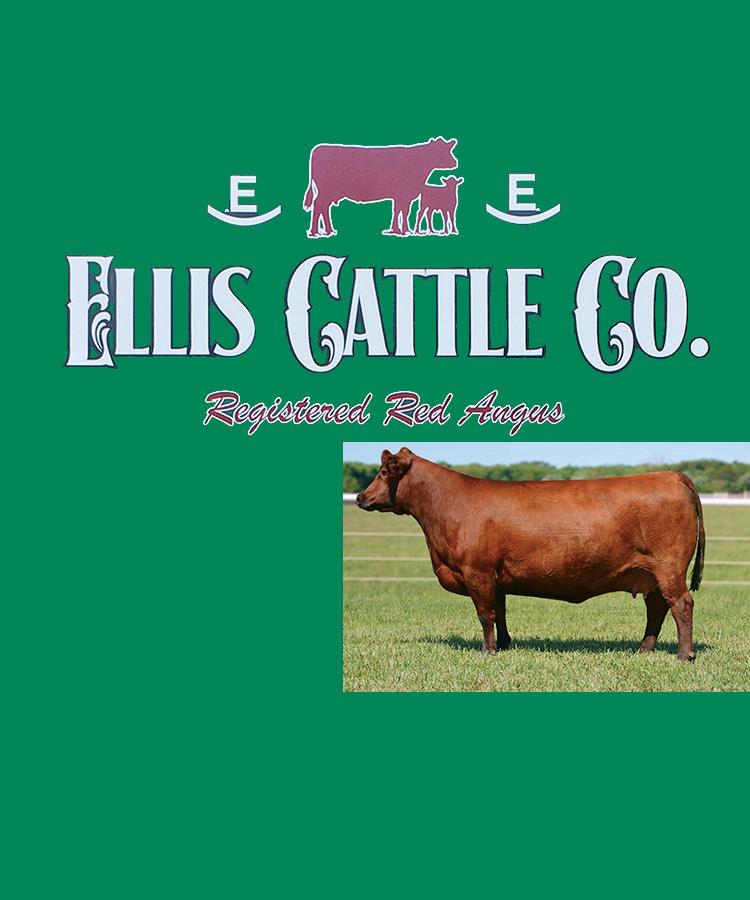

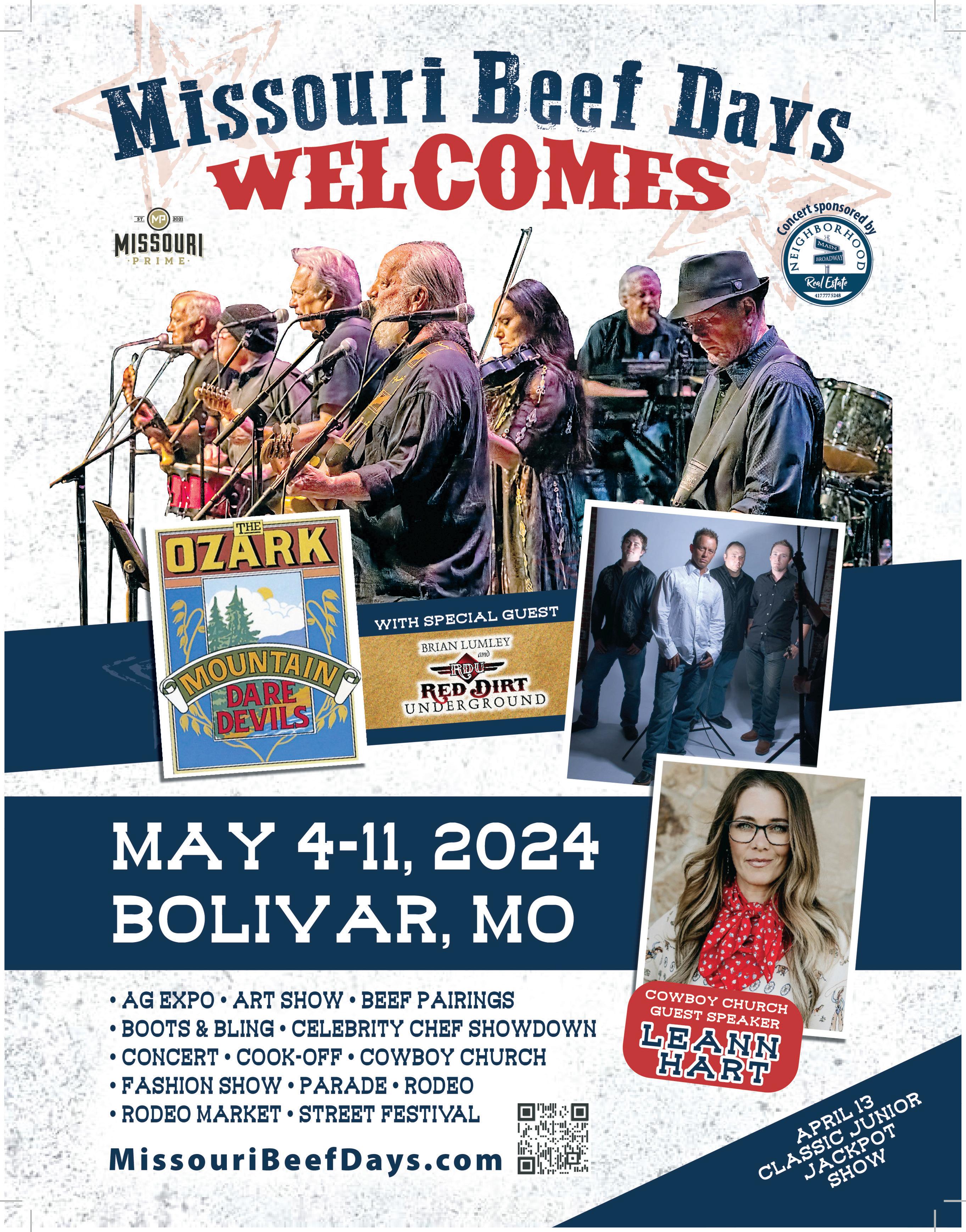
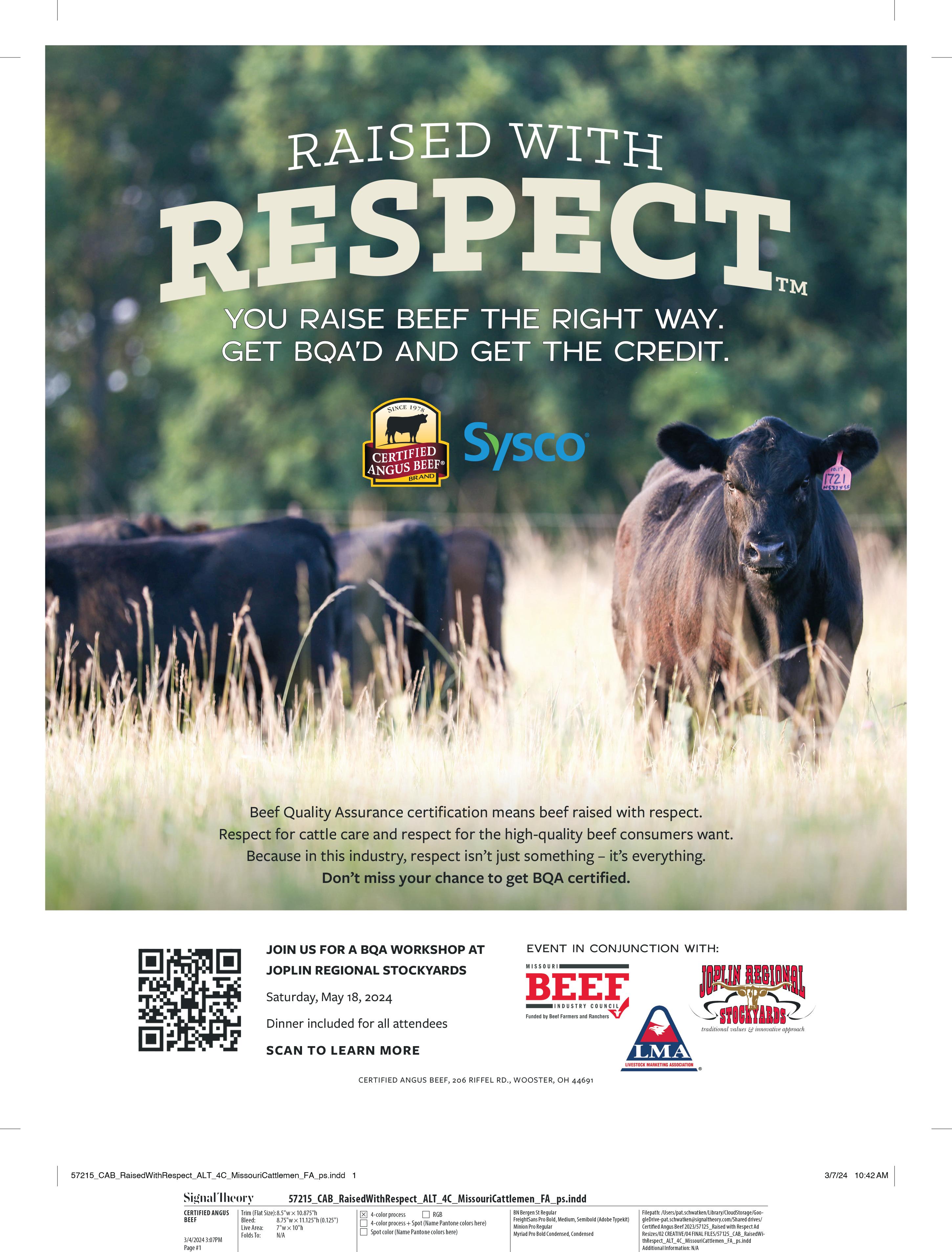


You want a plan. You need tangible steps. You demand credible actions that can benefit your beef business and your family. Frankly, you deserve clarity and plain speech.
This is a Genetic Action Plan to put your commercial cow/calf operation on the genetic footing necessary, as deemed by you and your family, for long term, multigenerational success. The article will discuss one particular approach to the commercial cow/calf business model, how to sustain that model long term while enhancing cowherd uniformity and terminal marketing prowess, the most valuable genetic data point for the model, and the role and appropriate application of purebred genetics.
To be clear, these are my opinions. Hopefully, informed, backed by facts, and well thought out. But still, these are my opinions. Throughout this article you may disagree. You may get angry. Our opinions may be in conflict, and that is perfectly fine. We only improve when good ideas come in constructive conflict with each other. As we are told, “Test everything. Retain what is good.”
Assertion #1: First, know and be intentional about your business model and source genetics that work in your model.
Assertion #2: Your cows are too big. That applies to most reading this. As such, you will struggle to eke out enough additional terminal value in your calves to offset the carrying costs in your cowherd. Prove me wrong. Weigh your cows.
Assertion #3: The packer demands a really heavy steer. We can complain about it. Or we can appreciate that our customer is clear about their expectations. I’d urge the latter. Big steers (think 1500 and above) make them money. Little ones don’t. Rich-meated cattle (high quality grades) make them money. Lower quality grades reduce their marketing flexibility.
Assertion #4: Build terminal calves that are in demand. Or find nontraditional channels to market through. Your local sale barn owner can give you clarity as to what sells well and what doesn’t. Ignore that at your own peril.
Assertion #5: We need to be honest with ourselves about the changes and evolution of breeds. The beef breeds poster hanging in your FFA classroom in 1988 has not applied in nearly three decades. As a result, our thinking can’t lean into 1988 perceptions.
Assertion #6: No breed has a corner on the genetic components of whole enterprise profit.
Assertion #7: There is no place for straightbreeding in commercial cow/calf operations in today’s beef business. Assertion #8. Responsible Crossbreeding and Heterosis are real, vital, and crucial.
Assertion #9. Almost no straightbred commercial herd can simultaneously generate low maintenance daughters and terminal calves that can climb to 1650 lbs. cost effectively and efficiently. Hybrids can.
Genetic Action Plan Step 1.
Get busy building a responsibly crossed cow herd that works in your business model, with your management scheme, and within your environment.
For most of you that should look like a roughly 50/50 cowherd of your British breed of choice and your Continental breed of choice. FYI – USDA MARC highlights that most Continental breeds generate females that now weigh less as mature cows than their British counterparts. Some of the readers may need to judicially incorporate some level of Brahman genetics. That makes sense. However, choose carefully. The reality is there is very little breed agnostic data that gives a comprehensive genetic look at the Brahman and Brahman composite gene pool.
For the masses of you who are already committed to the advantages of a crossbred female it is also responsible to review from time to time. Are there breed types you should be considering to improve some of your weaknesses? Are there lines with a particular breed type that should be getting greater consideration? Constantly monitor, analyze, and adjust where necessary.
Part 2 – Genetic Action Plan Step 2
Step 2 is built on your appreciation of the crossbred cow.
Assertion #1: There are various crossbreeding programs and schemes that can both optimize/maximize heterosis and allow for breed complementarity. Information on these traditional models is widely available.
Assertion #2: For breeding and mating schemes to garner widespread industry adoption they must be simple to implement and simple to benefit from.
Assertion #3: The traditional crossbreeding schemes that allow for the greatest hybrid vigor (heterosis) tend to be overly complicated and, at a practical level, very difficult to implement for many producers. Hence, most avoid those programs and fall into a simpler approach that tends towards a back and forth between two or three breeds.
Assertion #4: Most of you keep your own replacements. One can have an academic conversation about whether you should or shouldn’t. But the reality is that most of you currently make your own replacements and are going to continue doing that regardless of input to the contrary.
Assertion #5. Uniformity of a heifer calf crop is vital. The production of a uniform set of replacement heifers (that also align with the approximate genetic composition of the existing cow herd) allows for clear thinking when it comes to the genetic awareness of the herd and for appropriate and thoughtful bull buying and/or A.I. decisions.
Assertion #6. Uniformity of your feeder calves is vital. There are two quick ways to make your feeder calves worth more. 1) Sell large load lots and 2) make those loads extremely uniform. Leverage is hard to find in our business. Most will never find it. Being able to do these two things makes leverage more possible.
Assertion #7. Many crossbreeding schemes add variation to a heifer crop. Example. A producer starts with a well-built Baldy herd that is roughly 50% Angus and 50% Hereford. The producer needs simple. So, he goes and buys an Angus bull. His cow herd now consists predominantly of Baldy cows, but he is going to infuse a group of heifers that are 75% Angus and 25% Hereford. He does this for a few years. Now he has a herd that is roughly an even mix of 50/50 cows and 75/25 cows.
Now it is time to replace the bull. What does he do? You know. He buys a Hereford. He is a high-merit sire and lasts for a handful of years. By the time that Hereford is retired we essentially took a uniform cow herd of 50/50 and turned it into four different subpopulations that are roughly 50/50, 75/25, 25/75, 27/63. By the time we get through the next Angus bull we have reduced the once uniform cow herd to numerous subgroups from one population that is nearly a straightbred Angus group, one that is highly Hereford in composition and multiple other groups that have different levels of Angus and Hereford. Oh, by the way, none of those groups now are 50/50 and we likely have multiple colors and maybe even some horns. Note, this gets drastically more complicated and varied if we add a third breed.
So how does that producer buy a single bull that is a serious genetic complement to all the subgroups within his newly designed cowherd? The answer is he can’t. Assertion #8. Many crossbreeding schemes add variation to your feeder calves. Our previous example also impacts our marketing prowess at the local sale barn or on video auction. We had a reputation in the beginning of bringing in large uniform lots. In a very short period of time, we recognize that our calves are getting sorted multiple ways on color pattern, frame size,
Continued on page 54
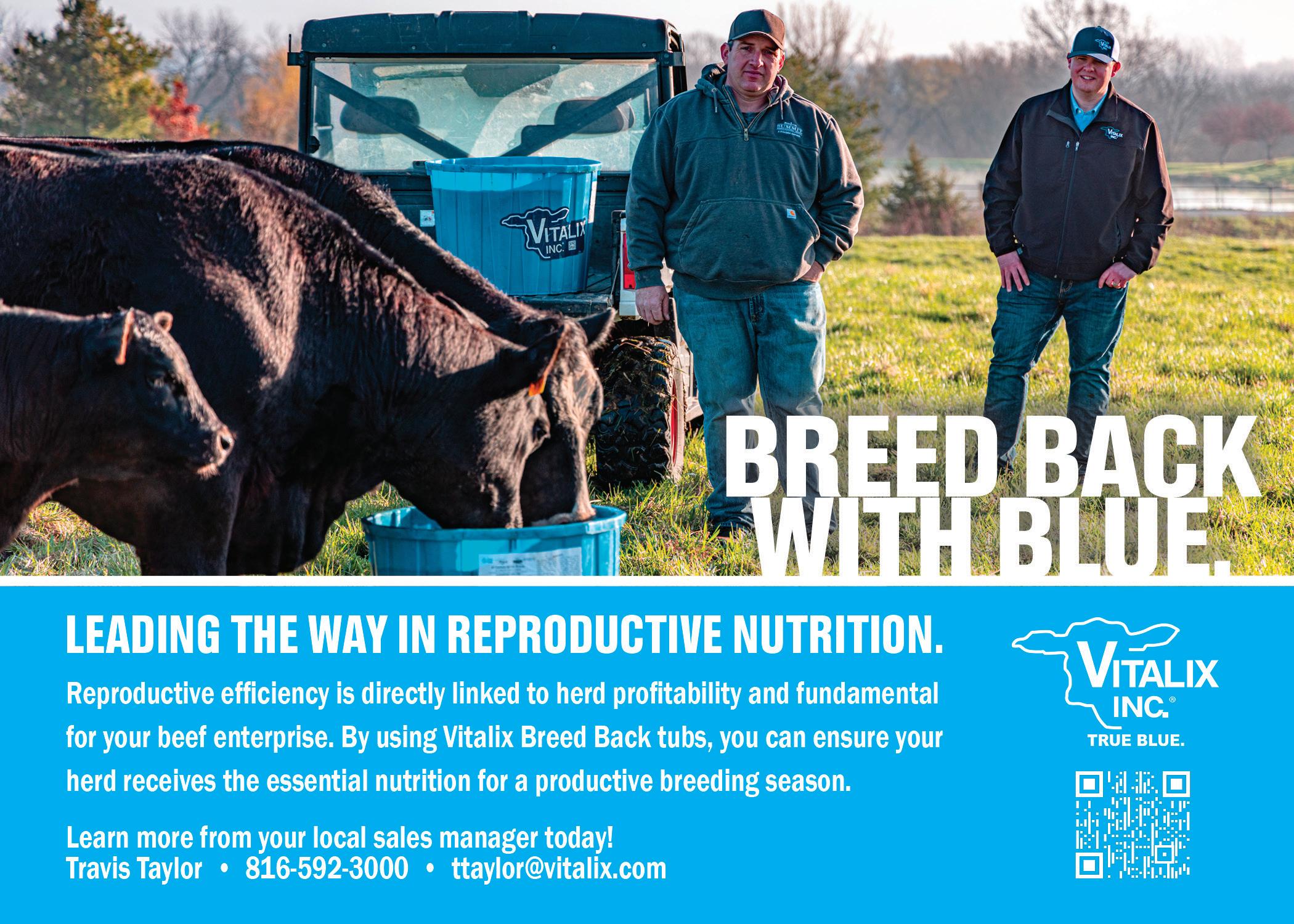
muscle, maybe even horn status. By using a poor model of crossbreeding we actually set ourselves back. In an effort to do the right thing we ended up in the wrong place.
Assertion #9. We can fix this. We can eliminate unnecessary variation of both groups, maintain a meaningful level of heterosis, and give ourselves the ability to balance the need for a moderate, low maintenance, uniform cow herd and high-octane terminal calves that can add serious value and marketing flexibility to the buyer.
Assertion #10. The fix has to be simple and easy. And it is.
Genetic Action Plan Step 2. Source Hybrid (aka composite) bulls that are roughly 50% British and 50% Continental.
Let’s reset the early example. Based on Part 1, I contend that most should be building a 50/50 cow herd from both a British source and a Continental source. To avoid bias we will just use the biggest population in each of those categories. So, we reset with a 50/50 SimAngus herd that is 50% Angus and 50% Simmental. Now, if instead of immediately reverting to an Angus bull and then following him with a purebred Simmental, then Angus, and Simmental, and so on, what if we sourced a hybrid SimAngus bull that was roughly 50/50? We can find a single sire (or a uniform bull battery if that better aligns with your operation) that actually compliments our cowherd but maintains the uniformity we have established. And while we can’t maximize heterosis in this model, maybe we use it better. We still maintain serious doses of maternal heterosis (for cow longevity), direct heterosis (to add pounds to our calves), AND we add something that isn’t even available in our earlier example – paternal heterosis (for bull longevity). All of our calves can be homozygous black and homozygous polled. We’ve enhanced our genetic prowess and our herd uniformity.
And note, you aren’t married to a particular breed type. You are married to the deliverable. Relative to the examples provided, you want a herd that is homozygous black and homozygous polled and has serious cow power built in with highly marketable calves. Our example ends in SimAngus, but that doesn’t mean there isn’t a Balancer or LimFlex or other composite that works into the equation at some point. As long as he aligns with the genetic prowess demanded and the uniformity that is required. Or maybe you are seeking to make red, homozygous polled cattle. The premise totally works. And is still adaptable with time.
The point is, hybrid bulls can deliver a serious genetic punch, in many ways far superior to straightbred bulls. And they add EASY and UNIFORMITY at the
same time to allow you to maintain your reliance on responsible crossbreeding.
Step 3 looks at what is the most important genetic measurable in our Genetic Action Plan.
Assertion #1. Your eyeballs are good. But they aren’t good enough. When measuring the success of our cowherd we need serious metrics and data points. At times, your eyes can provide valuable data points. Often, they can’t. Let’s use all the tools available to us. This is simply too important to get wrong.
Assertion #2. Genetics are extremely important in your business. However, they aren’t the only thing. Your management decisions and your environment play a tremendous role. Great genetics can’t overcome bad or misapplied management. Great management can’t overcome built-in genetic problems. This article focuses on simple genetic or breeding scheme applications without discounting the recognition of those other areas.
Assertion #3. Use data. Use data. Use data. Not biased or skewed numbers but those that are honestly interpreted and give you information that impacts the economic outcome of your business. It is dangerous to just seek to maximize certain traits without recognition of the antagonistic impacts on other traits and the greater economic implications.
Assertion #4. When available, the best genetic data sources are multi-breed EPDs and credibly built indexes. Why multi breed EPDs? Because you need the industry to work on your behalf. You don’t have time to figure out how to compare the weaning weight EPD of a bull of one breed to the weaning weight EPD of a bull from another breed. It is silly that the industry seems to refuse to work on your behalf. You use multiple breeds. You need EPDs that are directly comparable across the breeds. Period. Mature voices within the beef business should recognize this. Some have. Search the premise of International Genetic Solutions (IGS). If your seedstock provider(s) can’t access IGS multibreed EPDs ask them why not.
Even more valuable in your commercial operation than EPDs is the importance of a well-crafted index. You will see a variety of indexes. If you are a totally terminal operation, meaning you buy your females and all offspring are terminal, then seek the use of a fully terminal index like the American Angus Association’s $Beef index or the American Simmental Association’s $TI index. Nearly every association has something similar. However, the overwhelming majority of readers are making their own replacements. As a result, leaning into a terminal index would be a total misapplication of the tool. They aren’t built for your business model. You’ve heard the rumblings of what the misuse of a
Continued on page 56
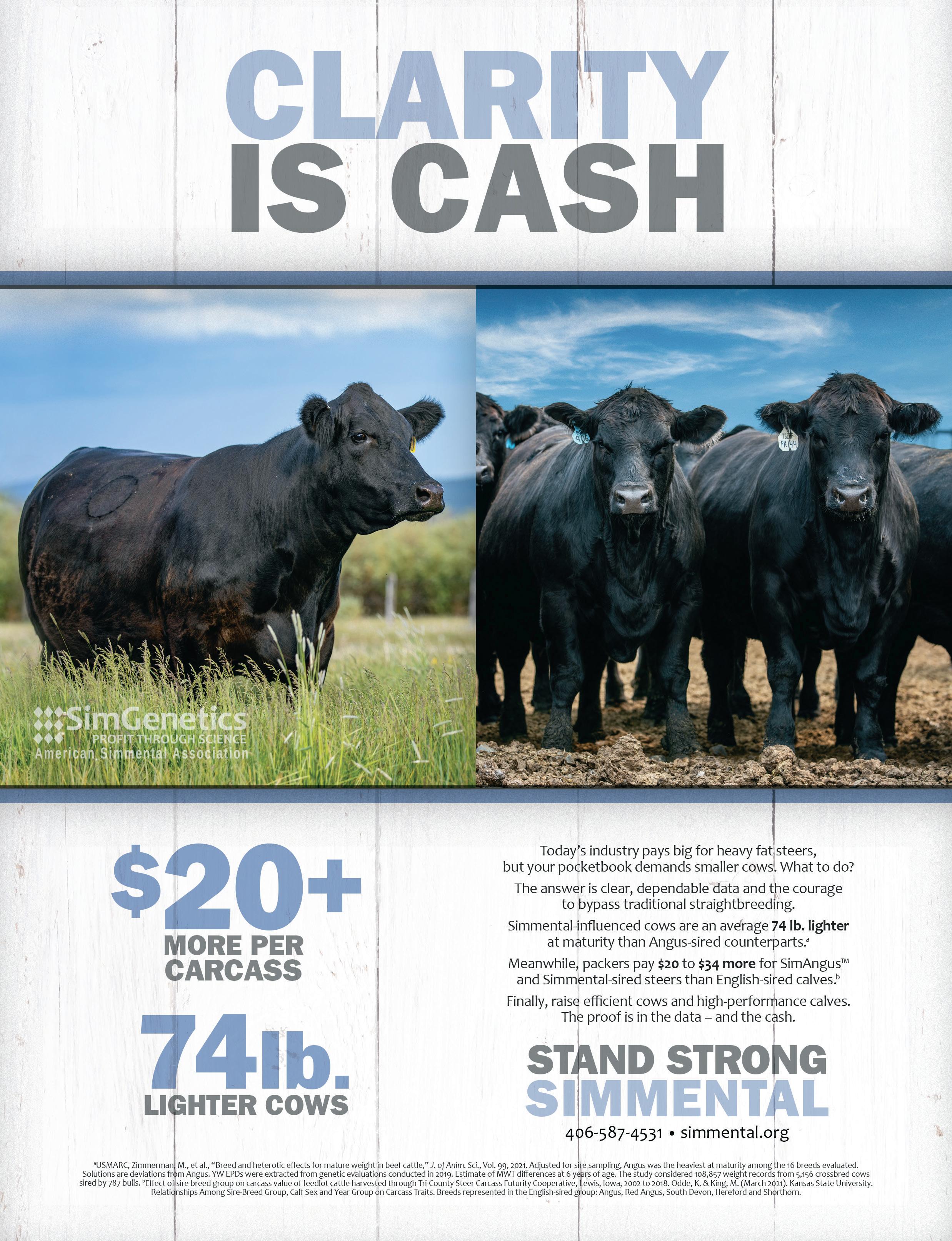

prominent terminal tool has done to the females within that breed type. To be clear, the tool did nothing wrong. It is a terminal metric. The reality is that the population didn’t have any other index available at the time. Should it have been used in the manner it was? No. But the lack of appropriate tools often leads to the use of inappropriate tools. The misuse of the terminal index to make replacement females was a failure. That was not the fault of the index.
For most, since you keep daughters, you need to use a Whole Life Cycle index (WLC). An appropriately designed and scientifically credible WLC takes into account all of the Economically Relevant Traits associated with the beef business at large. Examples would be fertility, survivability, cow longevity, cost effective growth, marbling, yield grade, etc. For a WLC to have legitimacy and merit it needs to incorporate actual cow longevity records – and lots of them. Without this, the whole effort is just an exercise in guessing and focus grouping. Nearly all breed associations have or are working on a WLC. It is important to study the underlying differences in these

weight – hence the maternal metric becomes a growth metric (eerily similar to a terminal index). A WLC appropriately weighs the importance of maternal and terminal traits to focus on whole enterprise profit. From this author’s perspective a maternal index is not the healthiest approach. Remember, the goal is profit, not just maximizing or minimizing a given metric. Single trait selection for any one trait is dangerous. The only measure worthy of single trait selection is profit. Period. Hence, the use of the appropriate index.
Assertion #5. At the outset of this article, I said I would be candid and frank. And so, I will. My preferred WLC for a variety of reasons is the All Purpose Index ($API). Multiple breeds within the IGS system use $API as their WLC.
Assertion #6. Use of WLC should not be your only genetic selection tool. But it should likely be the preeminent tool within your selection process. Then identify those specific areas in your program that need work or improvement and put additional selection pressure on those EPDs. For most of you this will come exclusively through your bull buying and/or A.I. decision making. For a handful of you this might come through EPDs, even on your commercial cowherd. And yes, we live in a time where you can have multi-breed EPDs and indexes on your commercial cows. Happens frequently. If you are interested, reach out and we can discuss if that is right for you and next steps.
Genetic Action Plan Step 3. For those of you keeping your own replacement females a credible WLC should be the preeminent metric used when sourcing bulls.
Part 4 – Genetic Action Plan Step 4
Step 4 considers the importance and utility of purebred and/or straightbred bull genetics in this model.
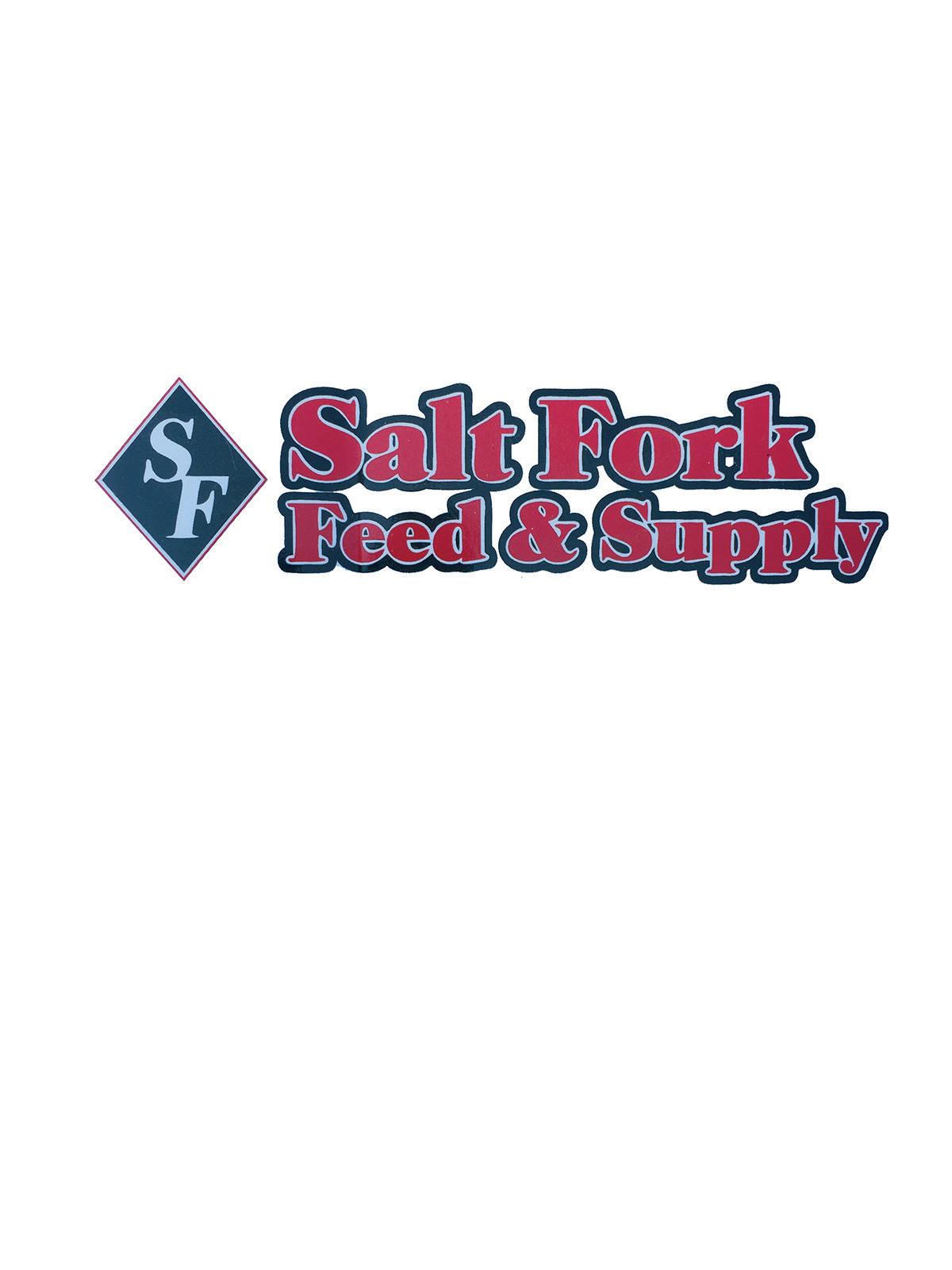
Assertion #1. High genetic merit purebred and straightbred cattle (referred to as “purebreds” for the balance of this article) are vital to the success of the Genetic Action Plan I propose. Again, as mentioned previously in this article, no singular breed has a corner on the market regarding genetic merit for Economically Relevant Traits (ERT). As such, no breed has a corner on the market of whole enterprise profitability. Any assertion to the contrary simply ignores facts.
Assertion #2. Many commercial cow/calf operations still find themselves excessively influenced by a single breed type. So functionally, those outfits act as purebreds themselves. There is good in this, primarily in the area of uniformity. Of course, the drawbacks have been addressed throughout this article. They are 1) ignoring the need and value of breed complementarity and 2) that hybrid vigor makes profitability more likely. Those drawbacks are a serious impediment to
Continued on page 58
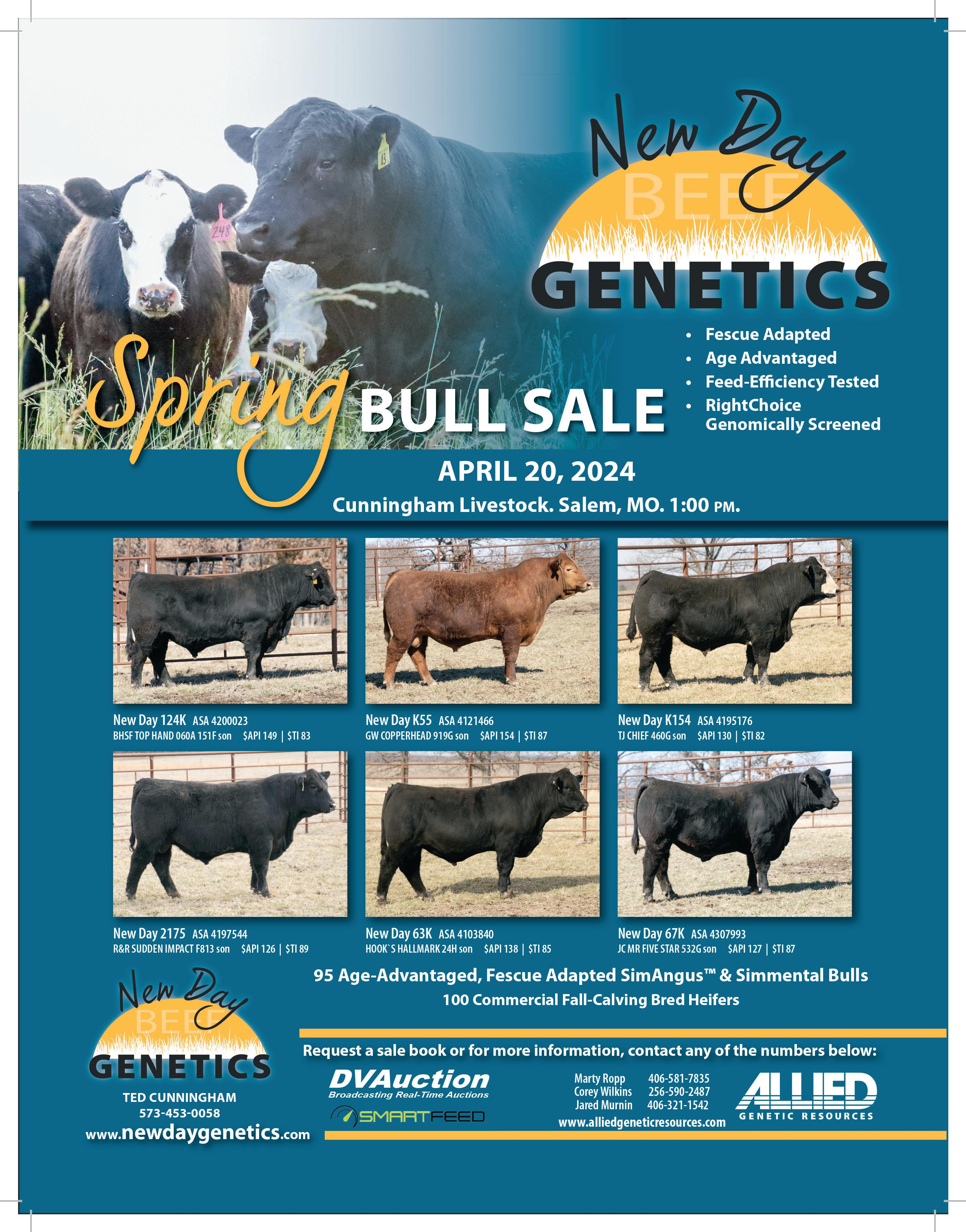

operational sustainability and “sustainability” in the sense it is used in society at large.
Assertion #3. The quickest and most impactful manner to move that “purebred” cow/calf operation to a more resilient and balanced genetic profile is by introducing a purebred that adds the strengths of a complementary breed. Again, if the cowherd is excessively of a British type, then that would mean using a purebred sire(s) of Continental origin. And vice versa of course. This results in the building the roughly 50/50 daughters that are needed and referenced as the base of the long-term hybrid model discussed in parts 1 and 2 of this article. Of course, this can also be accomplished or augmented through A.I. or purchases of appropriately crossed replacements.
Assertion #4. Once the herd is largely comprised of females of the desired 50/50 breed composition, then the transition to hybrid bulls becomes the emphasis. Again, reference part 2 of this article.
Assertion #5. Purebreds are vital in seedstock operations. For your seedstock provider(s) to continue to meet your hybrid bull needs it is necessary that there be focus on the production of elite purebred lines. Those lines allow you to have the confidence that new and fresh genetics are being incorporated into the hybrids in a responsible fashion that emphasizes industry relevant genetic progress for ERT and minimizes the potential impact of excessive inbreeding.

Genetic Action Plan Step 4. Recognize the need for high merit purebred seedstock. Those genetics are fundamentally crucial to the beef business. To a commercial cow/calf operator who sees utility in the Genetic Action Plan I’ve described they may need to use purebreds to “prime the pump” of their personal operation to get to the desired approximate 50/50 cow base. Then going forward, they directly benefit from their seedstock provider’s responsible use of purebred genetics in building hybrid bulls.
As a reminder, my suggestions for big picture steps in the application of genetics and mating decisions are:
Step 1) Get busy building a responsibly designed crossbred cow herd. If you are already on that path, take the time to evaluate where your herd is and if other breeds or families within breeds are warranted. The responsibly crossed cow is your risk management strategy, especially going forward. I contend that she is key to ensuring operational success and aiding your family to keep the next generation on that piece of dirt that you call home.
Step 2) Use hybrid bulls in your commercial cow-calf program. They work. They provide you with genetic value, ease of breeding scheme, complementarity of your cowherd, uniformity of your calf crop, paternal heterosis, and often they can be sourced at a lower price point than their straightbred counterparts.
Step 3) Incorporate a Whole Life Cycle index as a serious data point in your program. Should it be your only data? Clearly not. Can it be misapplied? Yes, a WLC is for those keeping their own replacements and looking to generate in demand terminal calves. Operations doing something other than the combination of those two things should use a different index or metric.
Step 4) Recognize the importance and appropriate application of purebred genetics for both personal success at the commercial cow/calf level and for the industry’s overall profitability proposition. In the plan I outline, direct utilization of purebred genetics lies most heavily at the seedstock level to provide the precision-built hybrids to fuel commercial success and sustainability for the long haul.
If you’d like to reach out to me, feel free to shoot me an email at ckemp@simmgene.com. I’d be happy to engage in a conversation, even if you and I don’t see this exactly the same. Most importantly, use data to empower your human relationships. The success of your cattle program is too important for your family to leave merely to chance.
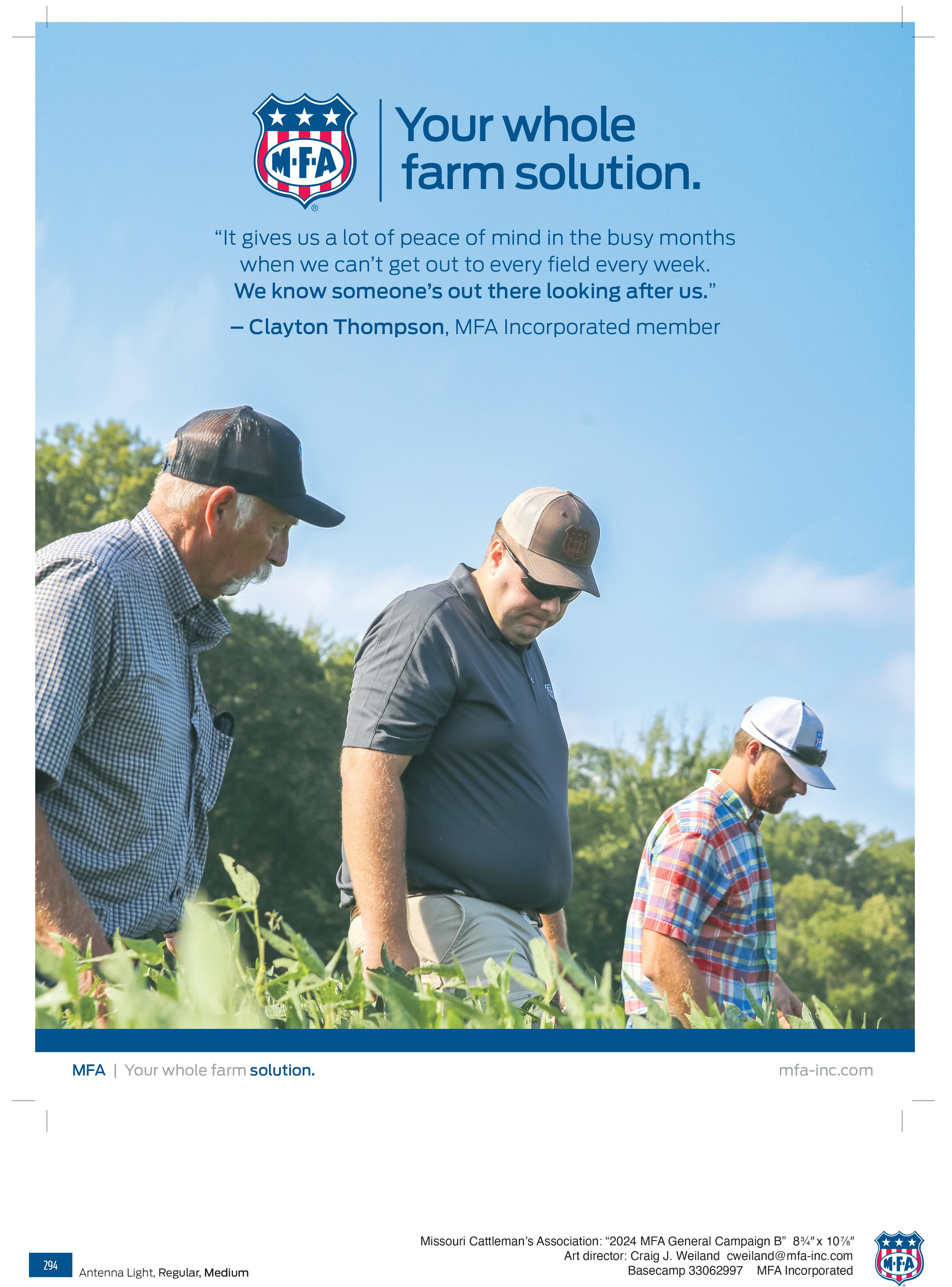


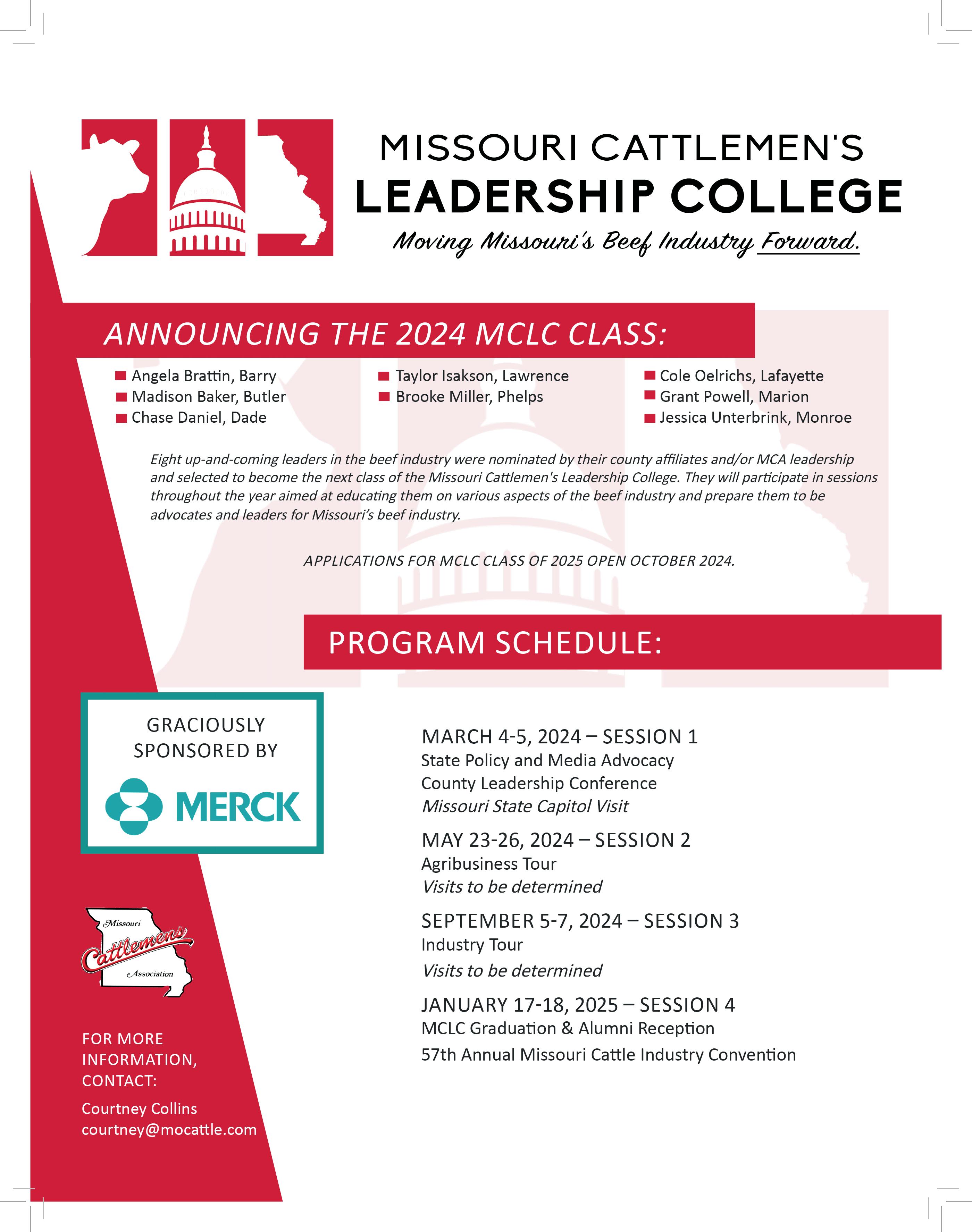


New exhibition rules issued by the Missouri Department of Agriculture late last year for showing cattle and swine at county fairs and exhibitions go into effect this year. University of Missouri Extension specialists say the changes encourage healthy animals.
“Because we teach Show Me Quality Assurance, it puts our words into action,” said Marcia Shannon, MU Extension state swine specialist. “Animal identification, biosecurity, herd health plans and VCPR are all part of SMQA, which helps raise safe, wholesome food, prevent animal disease transmission and promotes being a good steward of our animals.”
An MDA spokesperson said 2024 will serve as an educational year for exhibitors and exhibition leadership to become accustomed to the new rules.
Under the new rules, all exhibitors of cattle and swine must have certified veterinary inspections from an accredited veterinarian. The new rules bring cattle and swine in line with MDA rules for sheep and goats for traceback in the event of an animal disease.
“Every exhibitor must have a valid client/vet relationship,” said David Hoffman, MU Extension livestock specialist in Cass County.
The animals must also have an official form of identification. USDA guides the criteria and options for official identification ear tags.
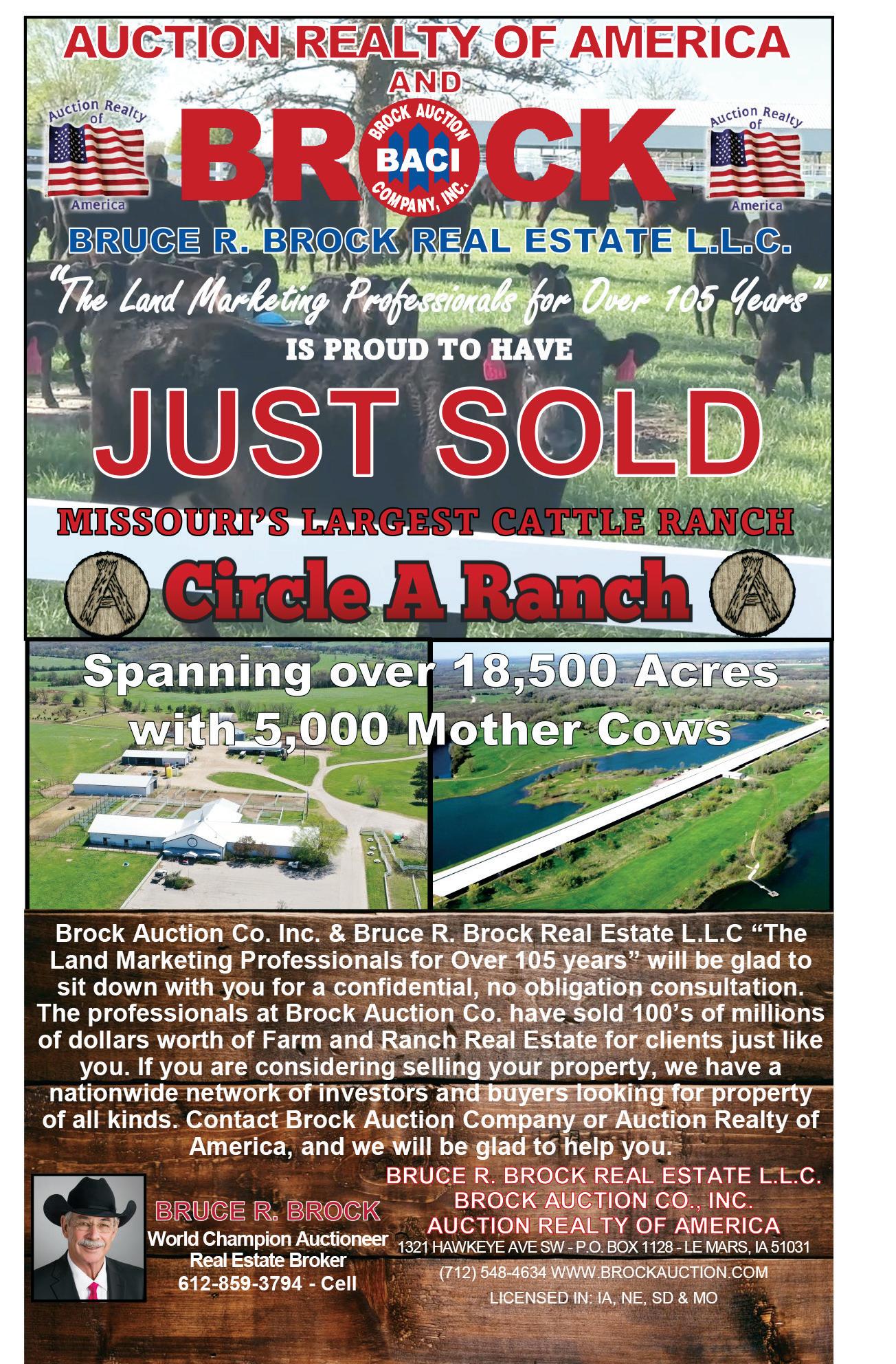
Animal ID options include:
• An official National Uniform Eartagging System tag. Begins with the official state number 43 for Missouri. Allocated by USDA to accredited veterinarians.
• An official Animal Identification Number tag. Consists of 15 digits, beginning with 840 for the United States.
Visual or radio frequency identification (RFID). Available from the manufacturer.
• A registration tattoo and registration papers from the appropriate breed association.
• For unregistered swine, an ear notch accompanied with farm records.
“It’s about having healthy animals arrive and healthy animals go home,” said Missouri’s state veterinarian, Steve Strubberg. Separate CVIs will be needed for each species.
Cass County, which hosts steer weigh-ins for youth programming, is making sure animals meet the ID requirements, Hoffman said. “Counties that have weighins are typically done before March 15, which could be an opportunity to ensure ID requirements are met.”
“Extension has shared information about the new exhibition rules with 4-H and FFA advisers,” said Tim Safranski, MU Extension animal health and production education director.
See MDA’sExhibition Rule Change Resources at https:// agriculture.mo.gov/animals/rules.php.


Source: University of Missouri Extension
Local livestock producers who demonstrate outstanding achievements in the livestock industry are asked to apply for an award recognizing their accomplishments. The Missouri Livestock Symposium is currently accepting applications for the Missouri Livestock Achievement Award.
Eligible applicants can be producers of livestock, agribusiness personnel, agency personnel, or agriculture educators in the state of Missouri. Other parties who
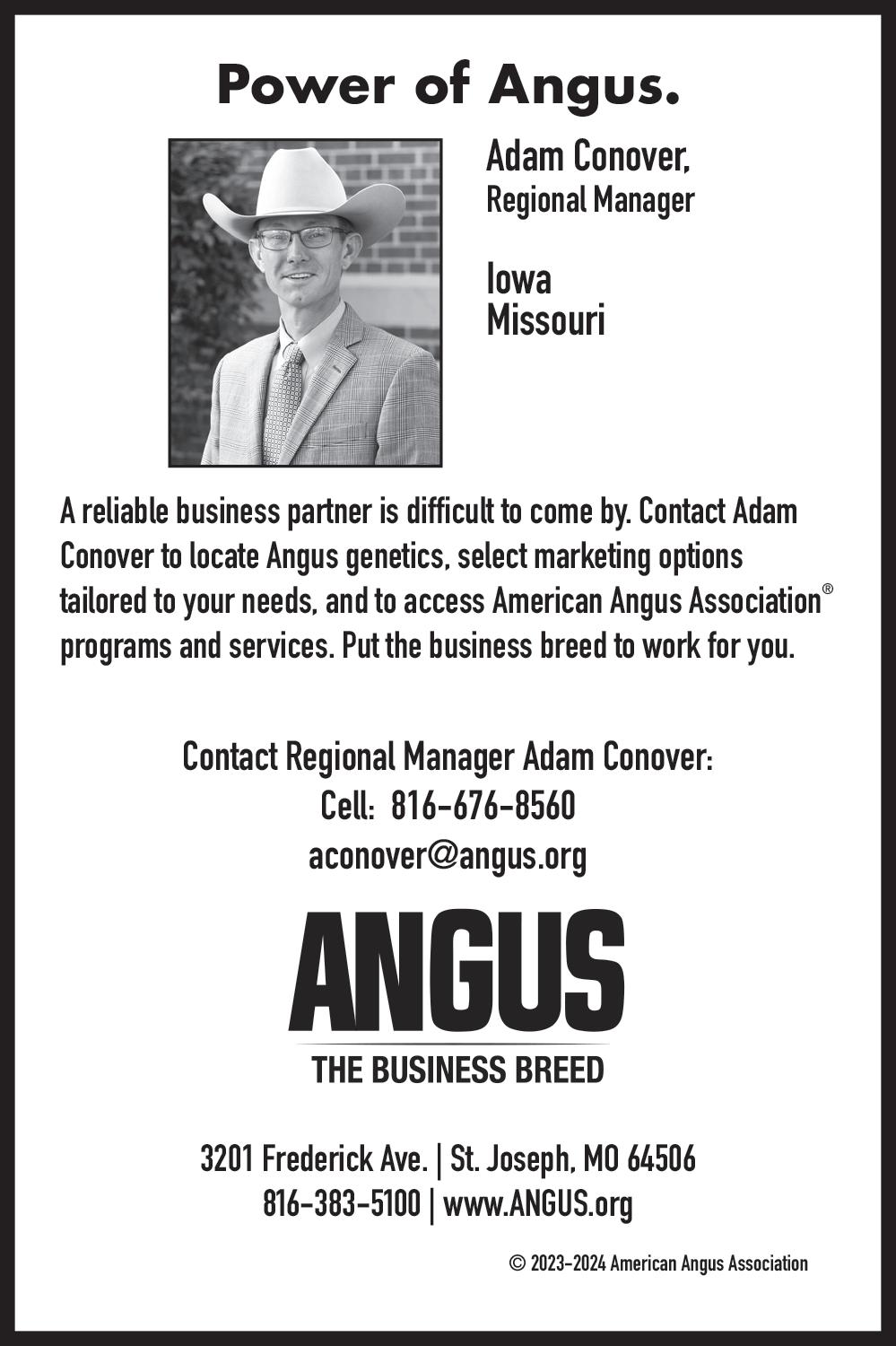
have been long-time supporters of the Missouri livestock industry will also be considered.
According to the committee chairman, Garry Mathes, this award recognizes livestock leaders from across the state.
Vice-chairman, Zac Erwin states “We know there are individuals, business and agency personnel, and educators that have made tremendous contributions to the livestock industry in this state and beyond, and we want to recognize them for their career achievements.”
The selected applicant will become a member of the Missouri Livestock Symposium Hall of Fame and will be inducted during the Friday evening program of the Missouri Livestock Symposium on December 6, 2024.
The award nomination form can be found at https:// missourilivestock.com/achievement-award, by emailing missourilivestock@gmail.com and requesting the form, or by contacting the Adair County MU Extension office at 660-665-9866. Nominations are due September 1, 2024.
The 25th annual Missouri Livestock Symposium is December 6 & 7, 2024 at the William Mathew Middle School. Go to missourilivestock.com or our Facebook page @MissouriLivestock for more details.

Scott Cape, Owner of Jim’s Motors in Cuba, Missouri. All I have ever done is sell and trade trailers. Give me a call for your next trailer 800-897-9840 www.Jimsmotors.com Commodity Trades Welcome


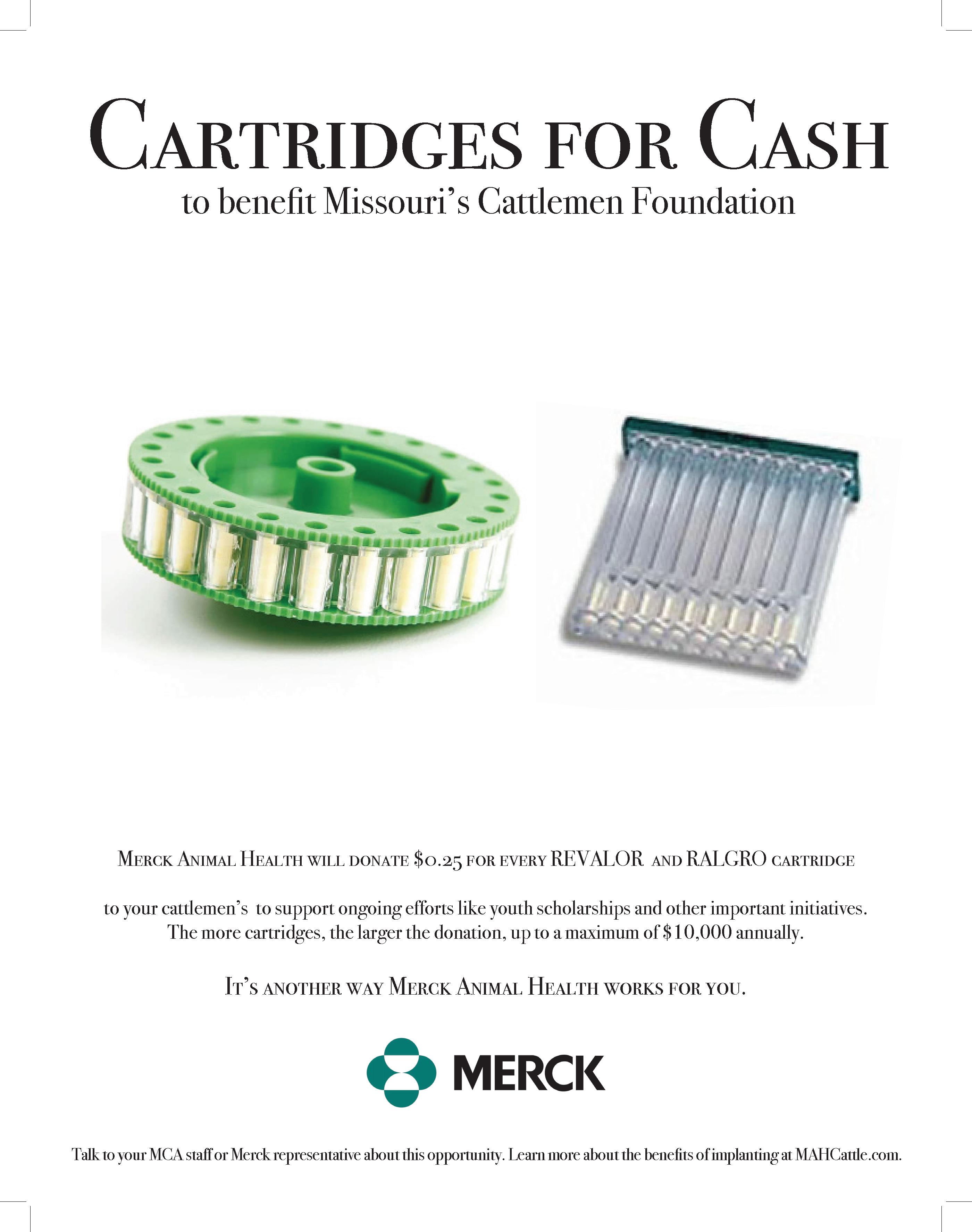

GREEN RIDGE, Mo. – Missouri cattle producer John Chamberlin didn’t want to sell his cows when drought lingered and hay supplies and forages dwindled last year.
With more than 600 head of Angus cows, Chamberlin looked to the internet for ideas. A University of Missouri Extension video on the benefits of grazing standing milo intrigued him.
He called the video’s creator, agronomist Rusty Lee in Montgomery County, to learn more. With the help of Pettis County livestock specialist Gene Schmitz, they set up one-on-one Zoom training for Chamberlin at the MU Extension Center in Pettis County.
In spite of the drought, Chamberlin grew 115 acres of milo that made 80 to 90 bushels per acre. Lee and Schmitz then visited Chamberlin’s Henry County farm to see his operation, assess the grain yield and make recommendations on carrying capacity and daily allocation area size.
Lee, a longtime proponent of grazing of standing milo, wanted to help Chamberlin implement the alternative

feeding plan that has worked for nearly a decade on Lee’s own farm and others in east-central Missouri.
Chamberlin was ready to take a leap of faith. “I have no feed,” he told them. “If this milo thing doesn’t work, I’m going to have to sell cows.”
His gamble paid off.
Milo’s drought resistance and low cost make it a good option, especially when hay is scarce and expensive. It also solves the challenge of making hay in May, the month typically with the most rainfall. No longer do you have to worry about curing hay when there are clouds in the sky. “You just sit there and watch your milo grow,” says Lee.
Milo does best for grain production when planted May to early June. Planting can follow winter wheat, but Lee recommends allowing the full growing season. Using poly wire electric fencing, the producer moves cows daily to a fresh paddock. Lee describes it as “taking the cows to feed rather than taking the feed to the cows.”
Producers also see another benefit. The herd’s urine and manure retain soil nutrients taken by the plants, so the nutrients are not exported off the farm as bushels of grain.
Lee gives some math lessons in milo. An average milo yield of 120 bushels per acre is 6,720 pounds of grain. Taking into consideration the observed feeding losses of 25% as the cattle graze, that leaves 5,040 pounds per acre into the mouths of cows. Allocating 12 pounds of grain per cow per day yields a carrying capacity of 420 cow days per acre.
Waiting two weeks after the fall killing frost before grazing avoids prussic acid concerns. Typically, a Nov. 1 start allows grazing all winter until the planted acres are consumed. While it is possible to graze milo until spring green-up of pastures, March winds combined with deteriorating stalk strength make it a good idea to conclude milo grazing by Valentine’s Day.
Chamberlin says cows adjust to moving to a new paddock each morning. They are ready and waiting for their owner to move the poly wire at daybreak. Cows with a “healthy respect” for electric fence do best in this setup, says Lee.
Chamberlin says the process is remarkably short – 20 minutes. That’s far less time than he would spend putting hay into rings or rolling it out on the ground.
Infrastructure needs such as water and fencing for rotational grazing remain, and fields may require some spring discing after cattle trample them. Milo shows little disease pressure in most of the state, although southwestern Missouri has seen some aphids.
Composite forage tests of all plant parts consumed show total digestible nutrient values of 73%-75% and crude protein of 7%. That is adequate energy, but requires protein supplementation, says Lee. Various commodity feeds like soybean meal or high-quality hay can provide this.
Chamberlin said he moved cows off milo to shelter and fed them hay during extreme cold spells this winter.
At the end of the season, Chamberlin found that he got 375 cow days per acre on the 115 acres of milo he planted. Lee estimated yield between 80 and 90 bushels per acre.
“Milo grazing is economical compared to buying hay, especially this year,” says Chamberlin. “It’s always going to be a part of my program.” His only regret is that he didn’t plant more milo this year. In spring, he plans to broadcast a mix of cover crop seeds before planting milo again.
“It was a home run for me,” he says. Chamberlin says milo grazing saved him from buying 1,400 bales of hay this winter. Hay sold on the low end this year at $65 for a big bale, which would have cost $91,000. On the higher end, at $125 per bale, that’s a savings of $175,000 for his herd. He also saved time and labor.
That’s why milo grazing is a practice you can bank on, says Lee. “He’s really putting money in his pocket.”
Lee gives these tips for planting milo for grazing:
• Wait until soil temperatures reach 60 degrees or more to plant.
• Don’t plant too thick. Your goal is to grow grain, not forage.
• Use a pre-emergent herbicide for weed control. Once weeds emerge in milo, they are difficult to control.
• Have a fertility plan in place. A split application of 120-150 pounds of nitrogen does well. Test soil for phosphorus and potassium needs.
• Don’t force cows to graze to the dirt. Ideally, cows eat to about 18 inches of stalk residue within two hours.
• Lee’s experience shows that milo for grazing performs best when planted in 30-inch rows.
• Choose milo varieties for closed heads and good stalk strength or lodging scores.
See Lee’s video at https://youtu.be/8Unian-UnOU.
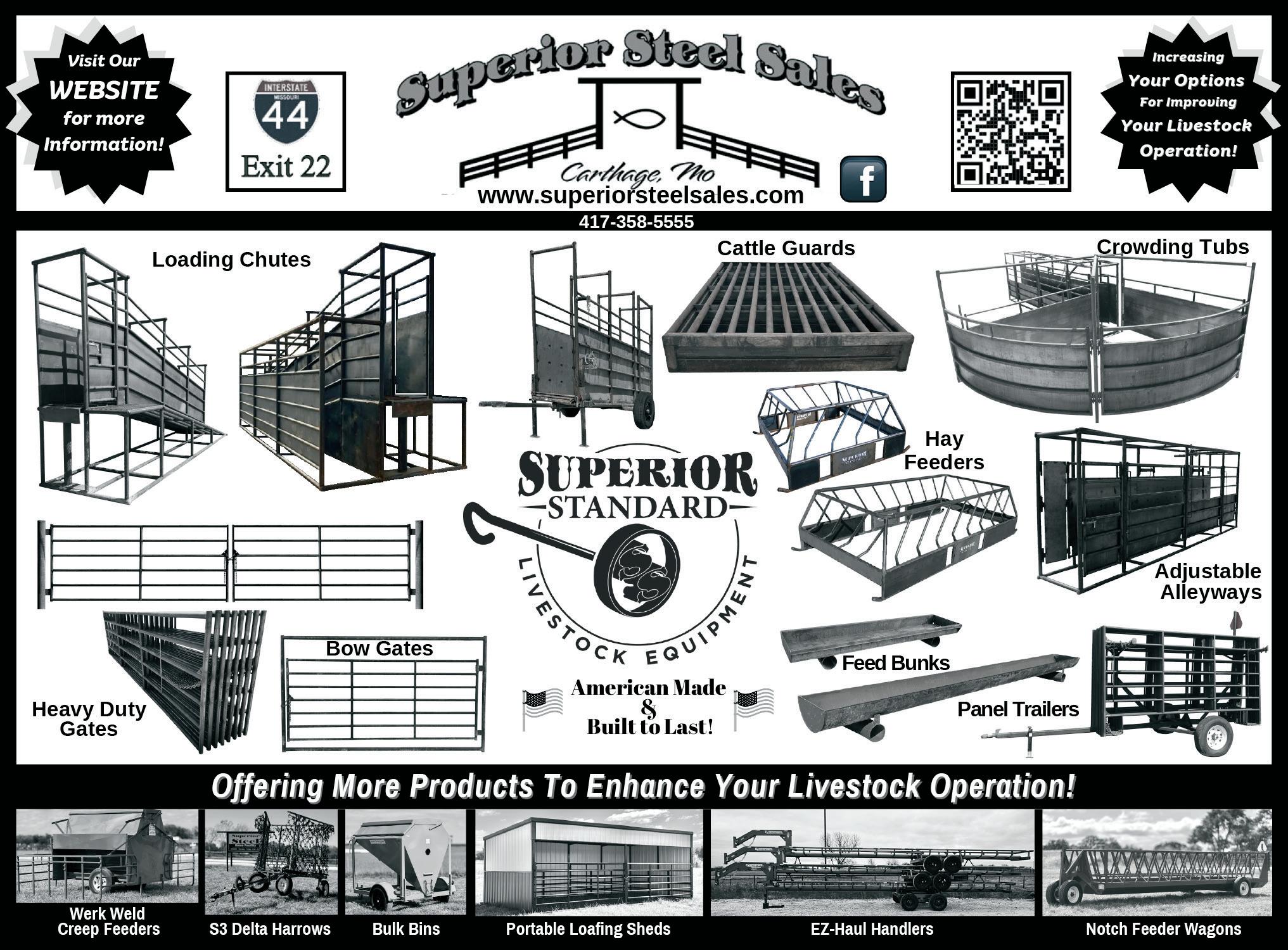
Janet Sue (Wheeler) Locke was born April 2, 1949, in Humansville, Missouri, the second child of James Allen Wheeler and Lois Nadean (Jones) Wheeler. She passed away at Mercy Hospital in Springfield on Thursday, January 18, 2024, at the age of 74 years.
An innate love of family was cultivated in Janet from an early age. She truly treasured her childhood memories of growing up, playing with her Wheeler and Jones cousins. A natural-born leader, it was her mission to stay connected with their families even in adulthood. She loved sports of all kinds and knew the rules of every game she watched. She enjoyed nothing more than taking part in the lives of her grandchildren. She rarely missed an event and spoiled each one in her own special way. Janet made a new friend everywhere she went and thrived on reconnecting with long-ago friends, former schoolmates and students.
Growing up in Bolivar, Janet worked as a “soda jerk” at Jester’s on the town square. She was a 1967 graduate of Bolivar High School. Janet attended Southwest Baptist College before marrying James F. (Jim) Locke of Halfway on August 24, 1968, at Brighton Baptist Church. The two were privileged to share 55 years of marriage together.
After Jim’s discharge from the U.S. Air Force, the couple settled in Halfway to raise their family on a dairy farm. Growing up in town, Janet came to embrace the farm life and shared in the responsibilities that came with it. Janet sang with Sweet Adelines in the 1970s and seized every opportunity to be involved her children’s activities. After they were grown, Janet returned to college. She earned her undergraduate degree in education from Southwest Baptist University, and a master’s and specialist’s degree from Missouri State University.
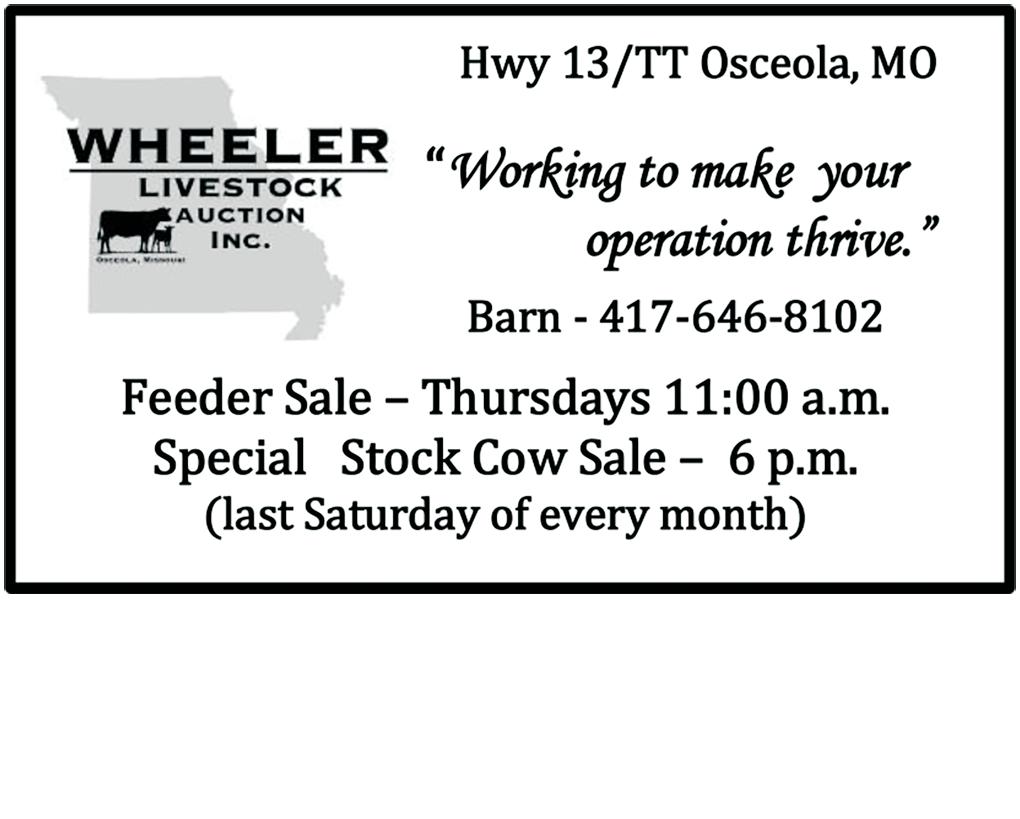
In 2005, Janet and Jim moved to Bois D’Arc after selling their farm so they could be closer to work. Janet had a passion for youth and excelled in her career as an educator. She taught middle school science in the Humansville, Buffalo and Willard school districts before retiring in 2012.
Janet was a member of Bolivar First Baptist Church and had regularly attended Sac River Cowboy Church since moving to Bois D’Arc.
Janet loved nothing more than spending time with family and friends. She was always up for a gathering and coveted any opportunity to fellowship with others. She regularly attended outings with the Willard Middle School Retirees and especially enjoyed getting together with the Lunch Bunch, a treasured group of ladies sharing friendship for more than 55 years.
Janet was preceded in death by her parents and an infant brother, Ronald James Wheeler. She is survived by her husband, Jim, of the home; daughter, Joann, and husband, Jim Pipkin, Republic; son, Jason Locke and Junie, Stockton; grandchildren James William Cameron Locke and wife, Hannah, Stockton; John Connor Locke, Lebanon; Jera Vehige and husband, Kyle, Billings; Jay Clayton Locke and wife, Amy, Stockton; Jayden Cooper Locke, Bolivar; Sophia Yokley; and Jace Pipkin; and two great-grandchildren, James Locke and Cora Locke, and a baby girl due in May. Also surviving are her brother John Wheeler and wife, Joanna, Bolivar; and sister Brenda Potts and husband Randy, Bowie, Texas; sisters-in-law Jane McKinney, El Dorado Springs; Terri Locke, Halfway; and Debra Coppage and husband Carl, Bolivar; as well as nieces, nephews and cousins.
Visitation was held on Tuesday, January 23, 2024, from 12 to 1 p.m. with services to following at 1 p.m. at Butler Funeral Home in Bolivar. Burial was at Reed Cemetery south of Halfway.
Memorial contributions can be made to the Sac River Cowboy Church, P.O. Box 127, Willard, MO 65781, or to the Breast Cancer Foundation of the Ozarks, 620 W. Republic Road, Ste. 107, Springfield, MO 65807.
Time is the most precious gift we are given, and Janet freely gave hers to all who crossed her path. May we all give, love and serve others just as Janet did.
James “Jim” Dale Bellis, of Aurora, MO, passed away on Saturday, March 2, 2024, at the age of 67 after a decade-long battle with cancer. He was lovingly cared for and surrounded by his wife and children at Mercy Hospital in Springfield, Missouri, until his final breath.
Jim was born in Aurora, Missouri, on March 20, 1956, to Dale and Dorothy Bellis. He was the oldest of three children, followed by his brother, Bob, and sister, Julie. They were brought up on the family farm raising cattle and from an early age agriculture became one of the passions of Jim’s life. He was active in FFA, serving as a chapter president, area president, and Missouri FFA Secretary. He was mentored by his agriculture teacher, Mr. Jim Golding, who introduced Jim to Hereford cattle industry. Golding even helped him pick out his first group of Herefords which started his herd, and empowered Jim to go to college to become an agriculture teacher. Jim would go on to become a mentor to many aspiring agriculture students.
Jim attended Mizzou, where he studied to be an agriculture teacher. He worked at Wheaton and Aurora High Schools as an agricultural teacher and FFA advisor. Then, served as the district supervisor of agriculture education with the Department of Elementary and Secondary Education. After retiring from the state, he was hired as the assistant to the Dean of the College of Agriculture at Missouri State University. He took deep pride in helping transform the MSU Department of Agriculture into the College of Agriculture and in his work to recruit and mentor students in agriculture.
From purchasing his first Hereford heifer as an SAE project to being one of the pioneers of utilizing EPD’s in the genetic selection of his Hereford herd, his farming accomplishments include receiving the Missouri Hereford Breeder of the Year award, serving on the American Hereford Association Board of Directors, and being inducted into the Missouri Hereford Association’s Hall of Fame.
Jim was deeply devoted to his church, Orange Cumberland Presbyterian, where he attended church all his life. As a young child, he committed his life to the Lord. He was baptized in Honey Creek, going on to serve the church by playing the piano and as an elder, serving multiple times as a delegate from Missouri Presbytery to the Cumberland Presbyterian General Assembly. Jim met his wife Carla at Camp Cumberland during Convocation when he was in college and she was a junior in high school. They were married August 12, 1978 and had three children - Jamie, Joanna, and Jonathan - who were raised on the farm and in Christian faith. Jim was a proud grandpa to Harper James, Ivee Mae, Nora Ellis, and Carson Dale.
Among the many gifts Jim passed on to his family is his love for music which he would share every chance he got. He played the trumpet in the marching band in both high school and college. He and Carla played the piano together each Sunday at their church. He especially loved to listen to and sing southern gospel music and one of his greatest joys was singing with his family and finding the perfect harmonies. Silly songs that he once sang to his own children have now been passed on to his grandchildren, ensuring that Jim’s legacy will continue to be sung by those who follow him.
He is preceded in death by his parents, Dale and Dorothy Bellis. He is survived by his wife of 45 years, Carla Bellis; his children Jamie Johansen and son-inlaw Kevin, Joanna Wilkinson and son-in-law Neal, and Jonathan Bellis; four grandchildren, Harper and Ivee Johansen, and Nora and Carson Wilkinson; his brother Bob Bellis and sister-in-law, Sharon; his sister Julie Keatts and brother-in-law, Tony; and several nieces, nephews and cousins.
Mr. Bellis will continue to be here by the owl because the owl is a time honored emblem of knowledge and wisdom. His advice will be remembered from time to time as the need arises because it was always based on true knowledge and ripened with wisdom.

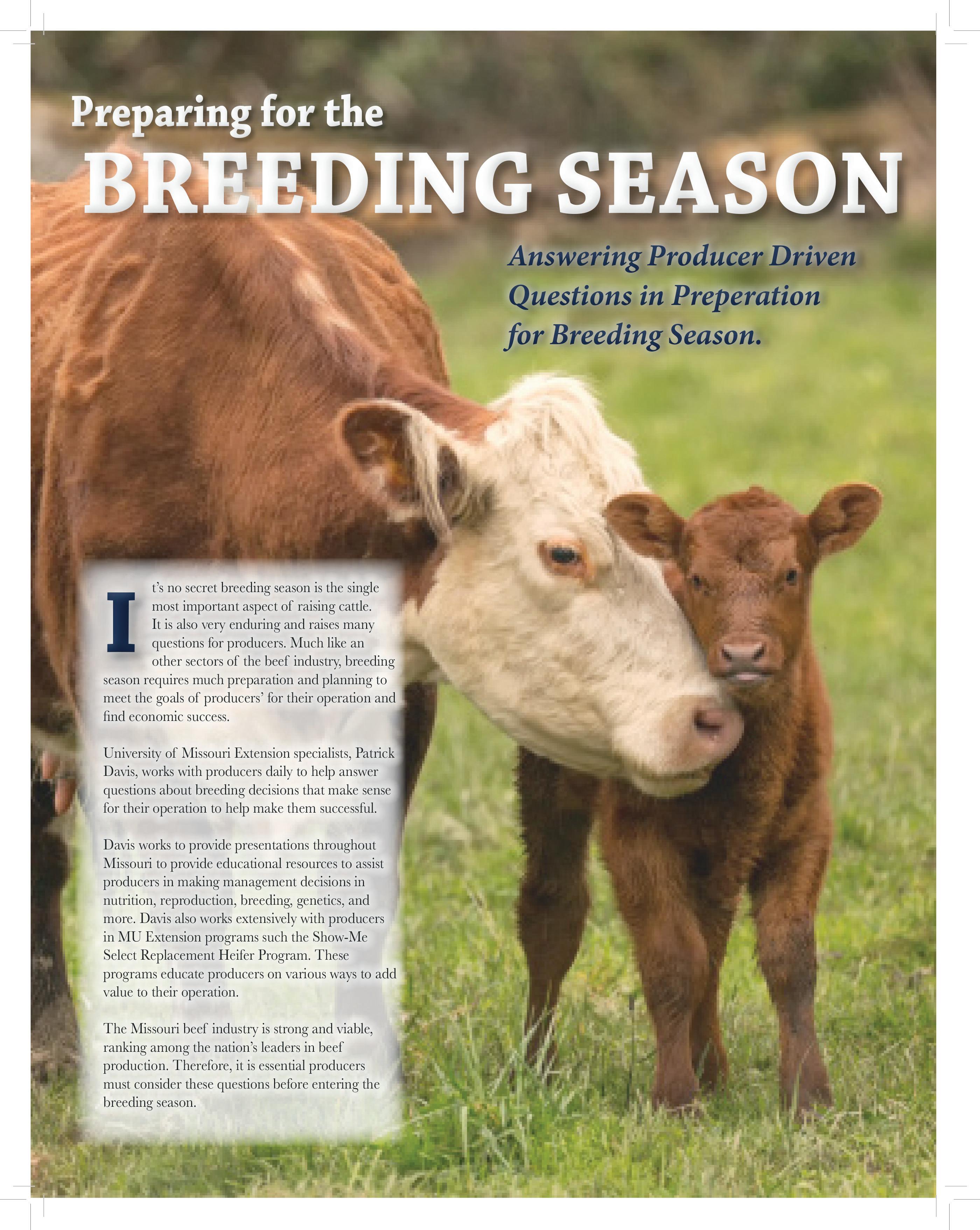
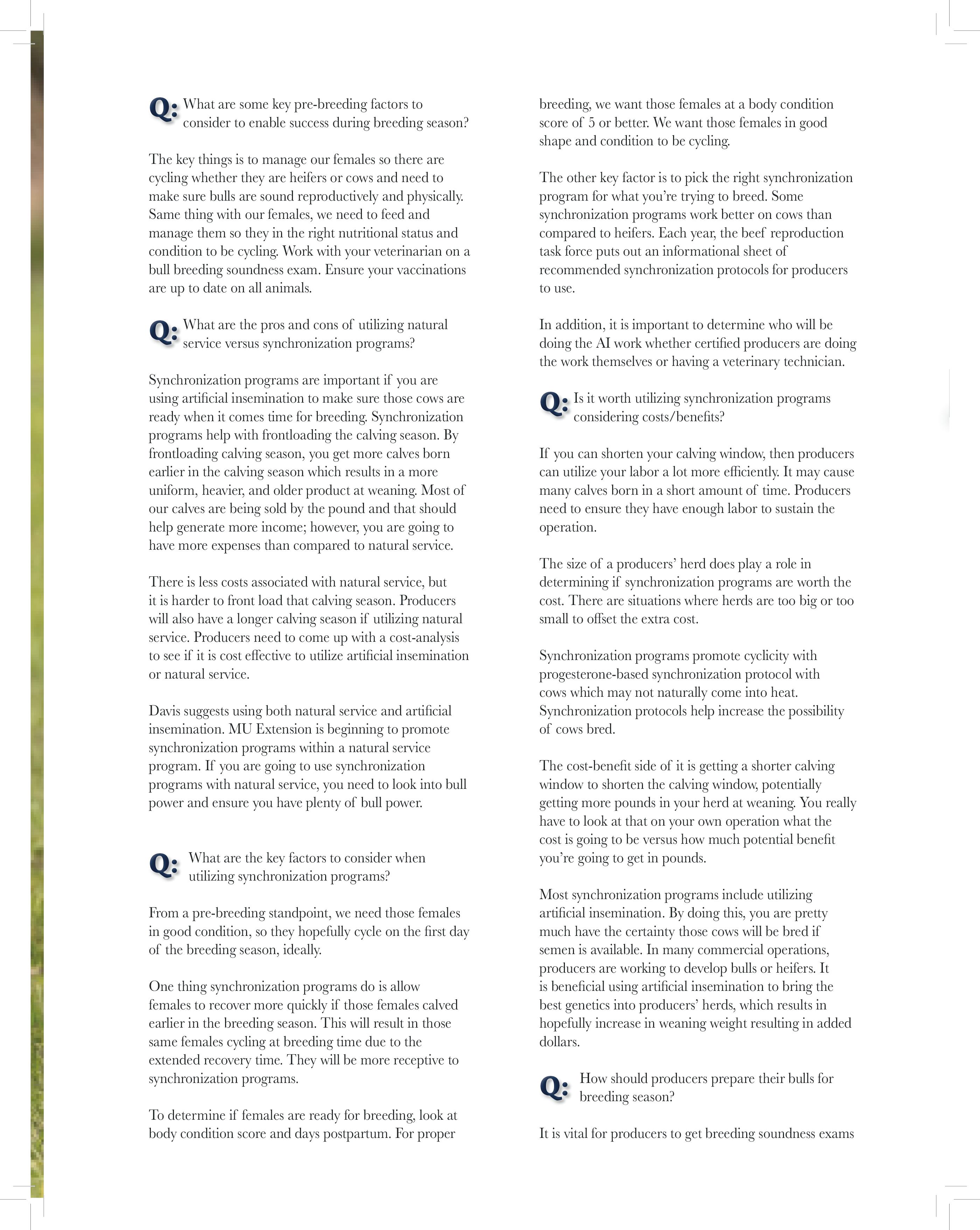


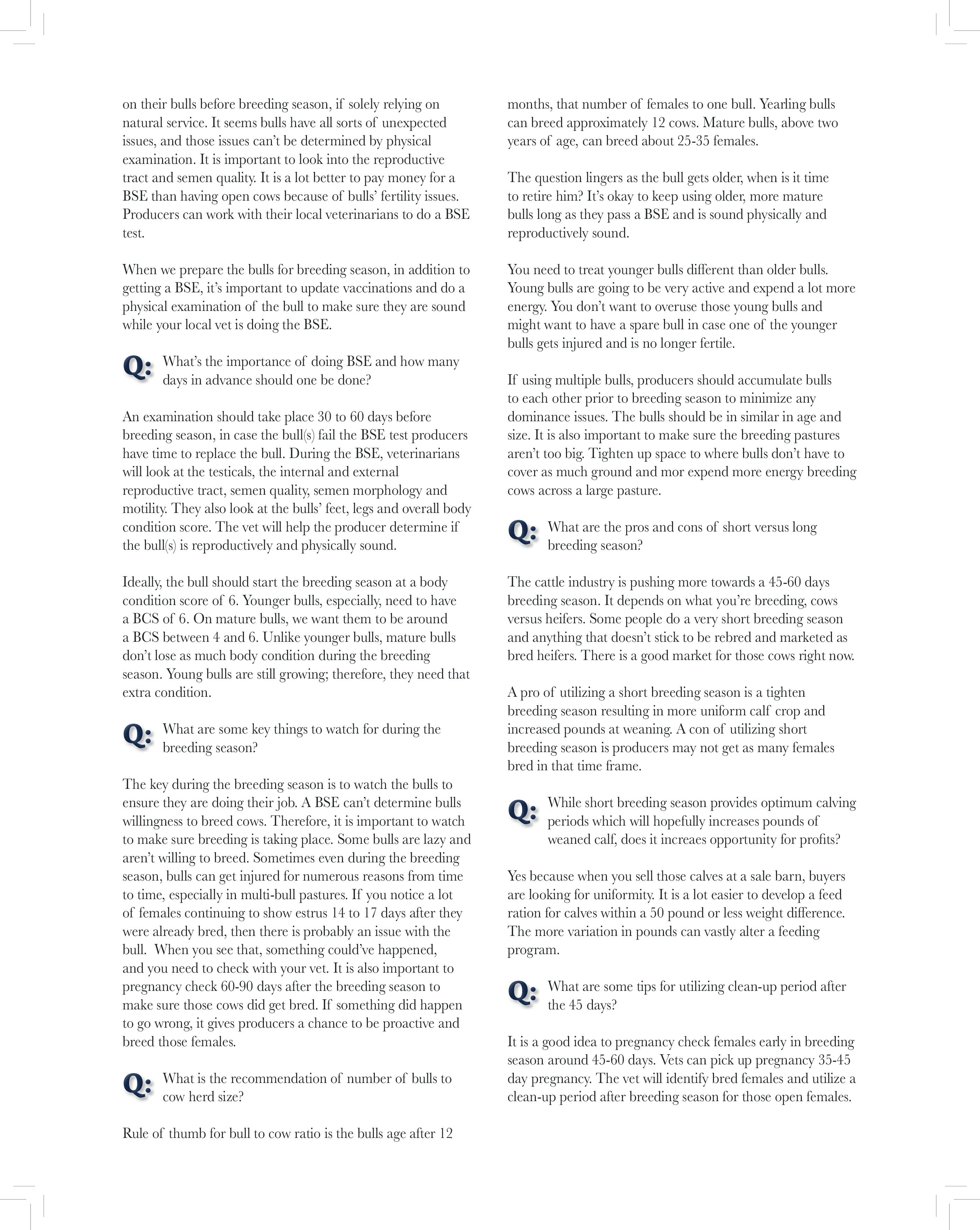

Source: Missouri Extension News
COLUMBIA, MO – University of Missouri Extension weed scientist Kevin Bradley lists two weeds to watch in 2024.
Knotroot foxtail, like yellow foxtail, has a short, hair-like ligule and a typical foxtail-like seedhead. Unlike yellow foxtail, however, this species has short, knotty rhizomes. The invasive perennial is also known as bristle grass.
Knotroot foxtail is spreading in Missouri pastures. It is difficult to control because its roots can still send out shoots even after herbicides are applied.
“Although it is known that this species has been present in Missouri for some time, historically, I have not encountered it before in Missouri pastures or ever received any calls about it from growers or consultants,” says Bradley.
“In the past two seasons, we have identified knotroot foxtail populations that were sent to us from Bates, Cape Girardeau and Moniteau counties. However, according to the ‘Flora of Missouri,’ its distribution is across the state in approximately two-thirds of Missouri counties,” he says.
Herbicidal options are limited, says Bradley. He shares options at https://ipm.missouri.edu/croppest/2023/8/ knotrootFoxtail-KvB.
“It’s not going to go away,” he says.
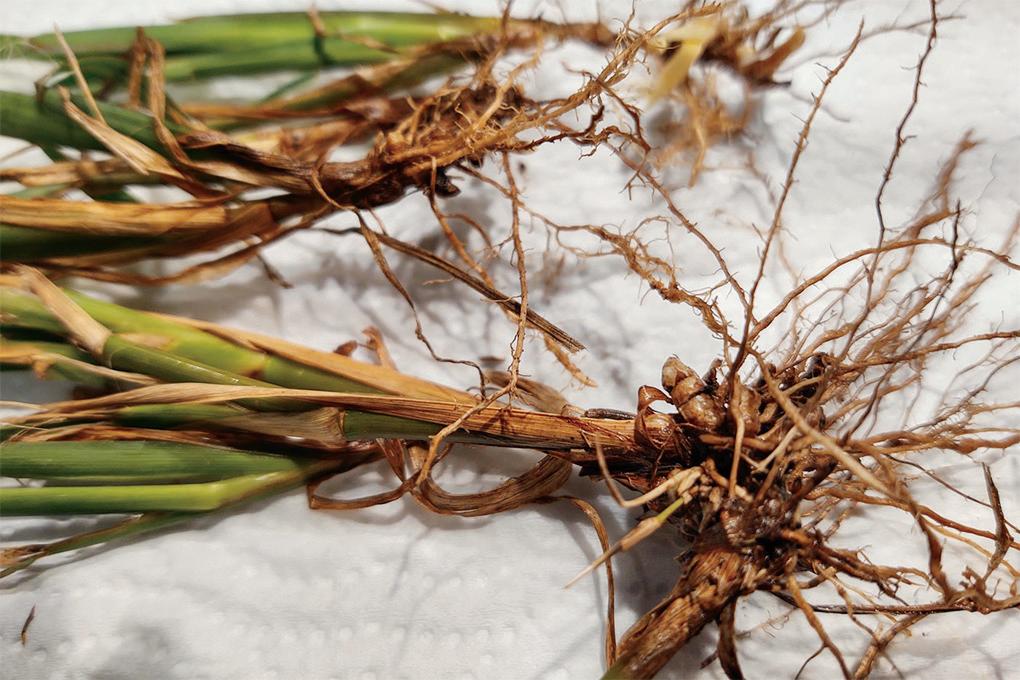
It offers low forage quality for livestock. Its small seeds can lodge between the teeth and gums of horses and cause mouth sores.
Bradley urges forage growers to scout fields and spot treat this weed. As always, good management of pastures and hayfields includes soil testing and fertility.
For more information on other foxtail grasses in Missouri, go to https://ipm.missouri.edu/ cropPest/2014/5/Weed-of-the-Month-the-Foxtails.
Another weed to watch is fountain grass, which can choke out other grasses in livestock pastures. Cattle don’t
Continued on page 75
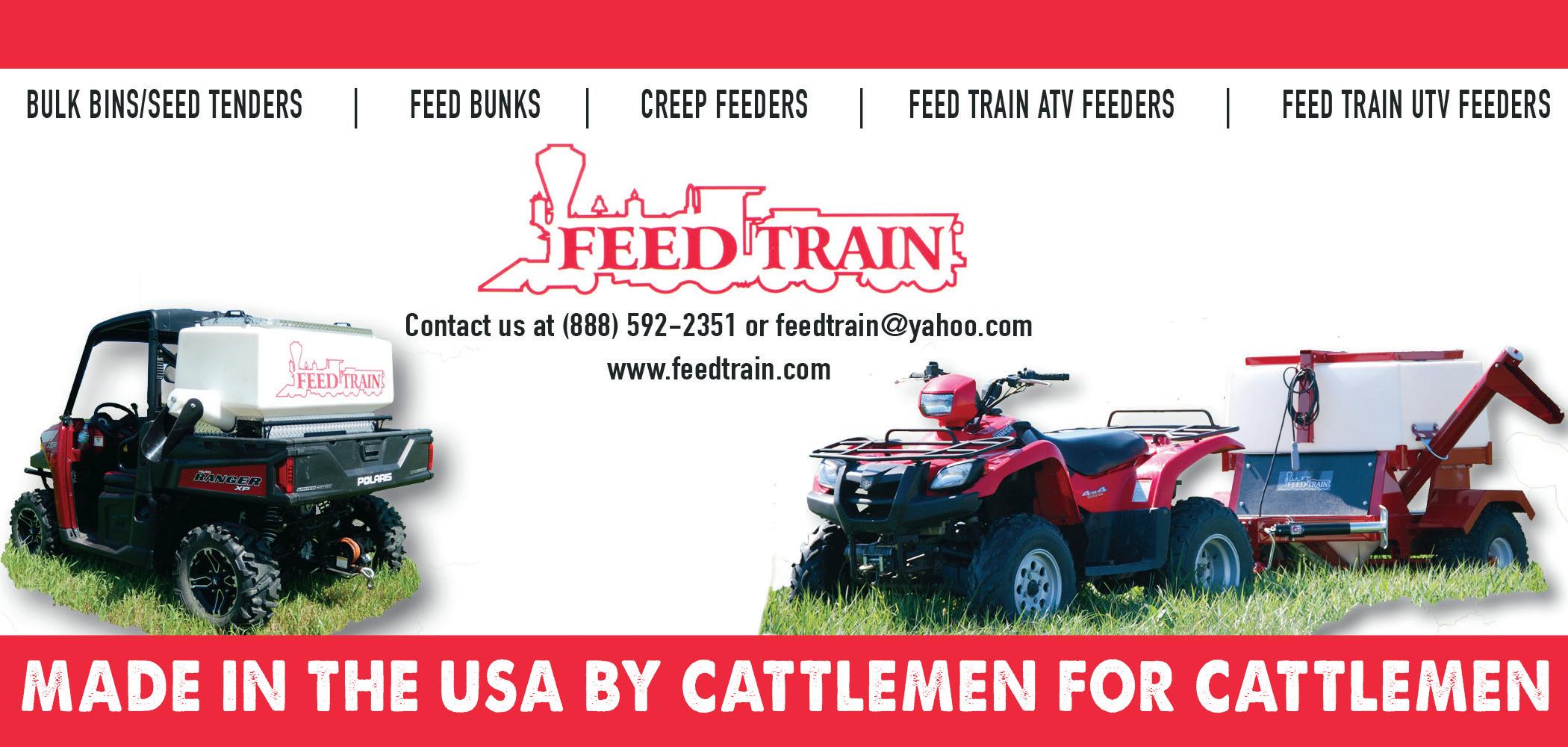
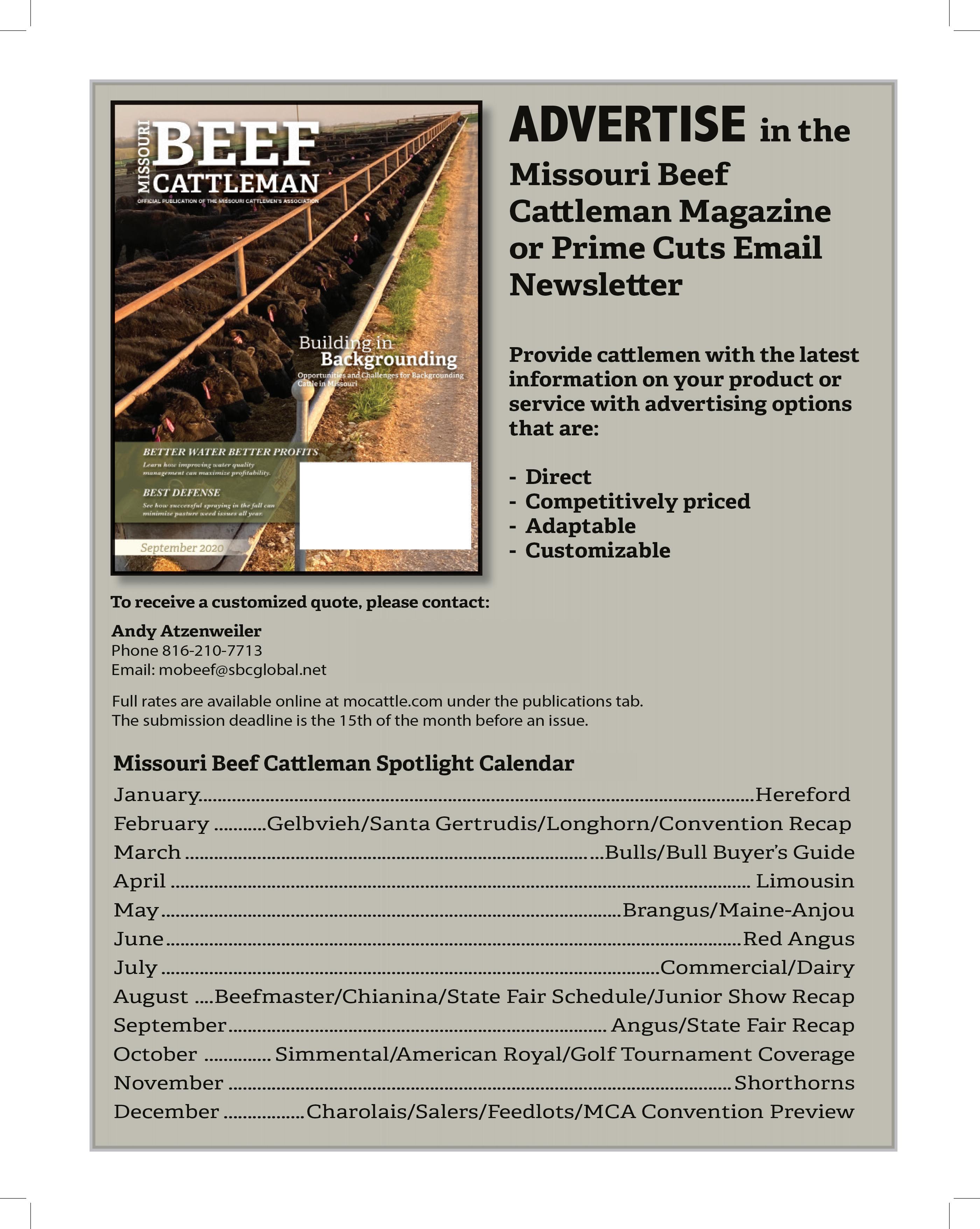

like its waxy, spiny stems, says Bradley.
Fountain grass grows as an invasive species in Arizona, Nevada, California and Hawaii. Hawaii regulates it as a noxious weed.
Producers in Lafayette County reported its presence in 2021, and it was reported in Cape Girardeau County in 2018. It is known to be present in at least 10 Missouri counties, all but one above Interstate 70.
The perennial was once used as an ornamental in urban landscapes. It prefers warm climates but tolerates mild winters.
Fountain grass adapts easily to different environments and can spread quickly due to its extensive root system. It also can reduce wildlife habitat.
Once established, fountain grass is difficult to control. USDA recommends pulling fountain grass plants by hand. Bag debris and dispose – do not burn. Mowing does not work. USDA offers control suggestions in “Field Guide for Managing Fountain Grass in the Southwest” at www.fs.usda.gov/Internet/FSE_DOCUMENTS/ stelprdb5410113.pdf.
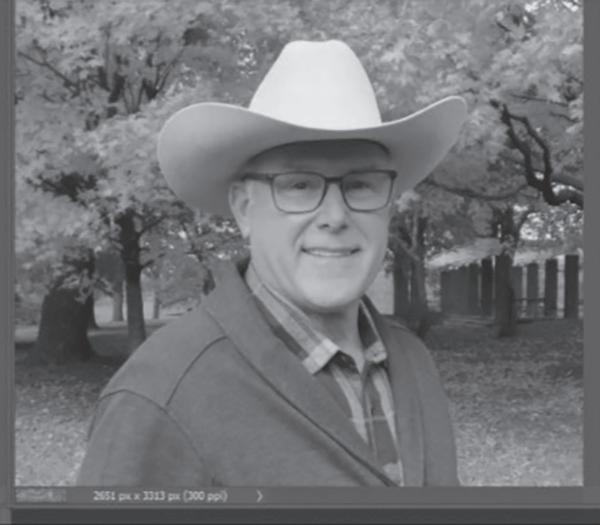
Contact: Mike Williams Higginsville, MO 816-797-5450 mwauctions@ctcis.net
For Upcoming Sale Info:

1 mile west on Hwy 32 • Buffalo, MO 65622 Barn: 417-345-8122
Sale Every Saturday 12:00 Noon
• Selling 1200 to 1700 head Farm Fresh Cattle weekly
• Special Stock Cow and Bull Sale 3rd Tuesday night of each month at 6:30 p.m.
• Pre-Vac Feeder Calf Sales 2nd Saturday of every month in conjunction with Regular Sale (Pfizer Pre-Vac, BLM BPre-Vac, Bayer Program, Mo Quality Assurance. LMA-Vac and MFA Health Track)
Order Buying Service Available
Owners… Lyle Caselman Leon Caselman 417-345-7876 H 417-345-4514 H 417-533-2944 cell 417-588-6185 cell
STOCKTON, Mo. – University of Missouri Extension will host a Management Intensive Grazing School in cooperation with several agencies May 7-9 in St. Clair County.
“Efficient forage management and utilization is important to the profitability of a livestock operation,” said Patrick Davis, MU Extension livestock field specialist. “The best way to promote efficient forage management and utilization in a livestock operation is by incorporating management-intensive grazing practices.”
MU Extension, the USDA Natural Resources Conservation Service (NRCS) and the Missouri Forage and Grasslands Council are cooperating to provide the Management Intensive Grazing School to livestock producers May 7-9 at the Forest Park Building, 206 E. Fifth St., Appleton City. Classes run 9 a.m. to about 4:30 p.m. all three days.
“This school is applicable to and will provide education in livestock and forage management for all grazing species, though cattle will be emphasized,” said Davis.
Educational topics include:
• The “art and science” of grazing
• Soils, soil management and fertility
• Plant growth, forage quality and persistence
• Fencing and water systems
• Matching livestock and forage resources
• Meeting nutritional needs of livestock from pasture
• Layout and design of grazing systems
• Economics of management-intensive grazing
• Outdoor field exercises and tour of producers’ farms
Continued on page 78
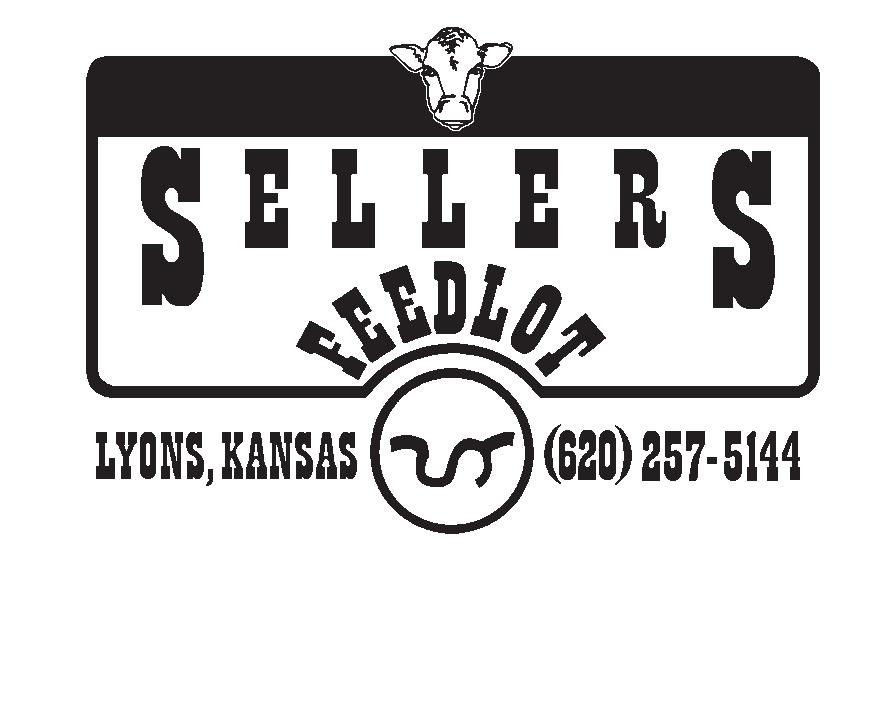


The program is required to receive Missouri Soil and Water Conservation District cost-share funding and may help in receiving NRCS cost-share funding for grazing system development.
Cost is $200 per person and $100 per additional person from the same farm not needing materials. Fee includes materials, lunches and refreshments during the event.
Registration and payment by May 2 are required to attend the Management Intensive Grazing School. Register at https://shorturl.at/afwQX.
For questions, contact the MU Extension Center in St. Clair County at 417-646-2419 or Davis at davismp@ missouri.edu.

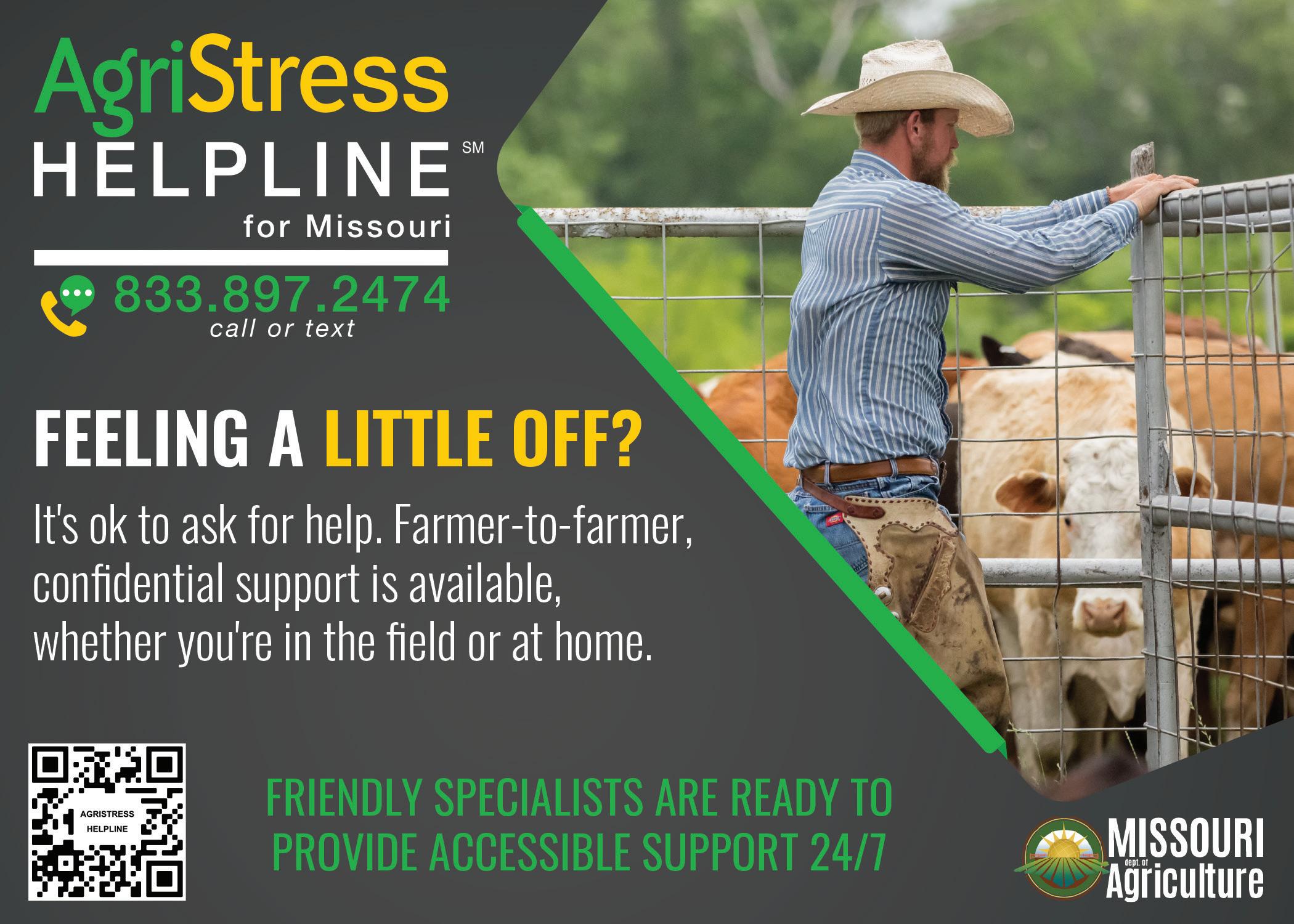
We all have experienced DMV woes. For those of us with several farm vehicles and trailers, those woes are multiplied. Fellow cattleman and Senator Lincoln Hough is trying to mitigate those issues with SB 847.
The bill is Senator Hough’s attempt to streamline the licensure process allowing farmers and ranchers to select when vehicle registrations are due. This change would allow farmers to make one trek to the DMV to license all vehicles at once instead of multiple trips to license vehicles individually.
You’ve often heard us say that nothing is easy in Jefferson City. Senator Hough’s idea is no exception. Despite his proposal breaking the commonsense barrier, floor debate took a drastic turn when Senator Bill Eigel took the microphone.
Within mere minutes, the purpose of the language morphed into something unrecognizable, and MCA and its members were degraded. MCA was everything from the swamp to a special interest group that doesn’t look out for its members to being part of a murderer’s row of special interests.
While Cooper and I aren’t unfamiliar to name calling and aren’t offended easily, we do take offense to this. We all have rolls to play within the political process. If an elected official wants to vent about MCA, he or she absolutely should do so and take out that frustration on Deering, Cooper, or me. Not you. Not the community that raised me. Not my friends. Not my family.
We also respond better to real conversations, not dog whistles designed to inflame the Twitter universe. We fully understand that perception is reality, even if that perception makes no sense. The problem is that misrepresenting facts always causes collateral damage. It hurts people.
In this unbrave new world where elected officials are prioritizing soundbites and personality politics over facts and doing public good, it is important to set the record straight. It is important to know what we are supporting and what we aren’t, regardless of what others may say.
MCA is supporting Senator Lincoln Hough’s SB 847 to save you time and create efficiencies within your farming operation, should you voluntarily choose to do so. Despite Senator Eigel’s manipulation of the language, it does not create a new database, require farmers to register farm machinery, or require more paperwork or time at the DMV.
Cooper and I are proud of this organization and its members. Our representation of each one of you is personal to us. We don’t take lightly inappropriate name calling used solely for political gain.
We have the privilege of knowing many of you personally and know you don’t represent swamp creatures and aren’t people who should be maligned on the Senate floor. We appreciate the work you do even when it’s unbelievably cold, rainy, and hot to feed others who chose to misrepresent you and your intentions.
Cooper continues to remind me that no good deed goes unpunished. He continues to be correct, as much as it pains me to admit it. Regardless, we thank Senator Hough for pushing a commonsense bill that makes a difference in real people’s lives. Lincoln, we will jump in your swamp anytime!
Enjoy the weather (hopefully), Nancy and Cooper
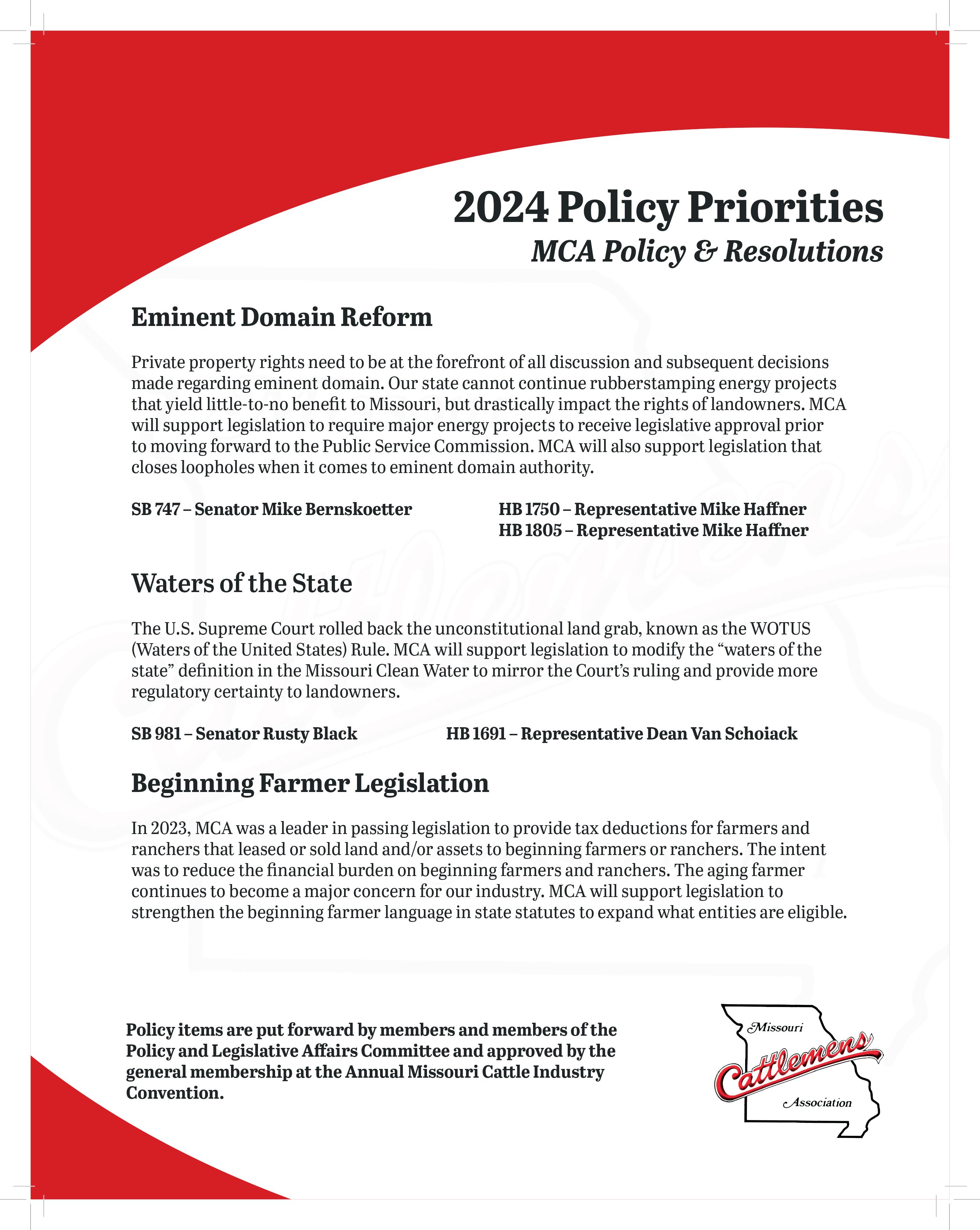



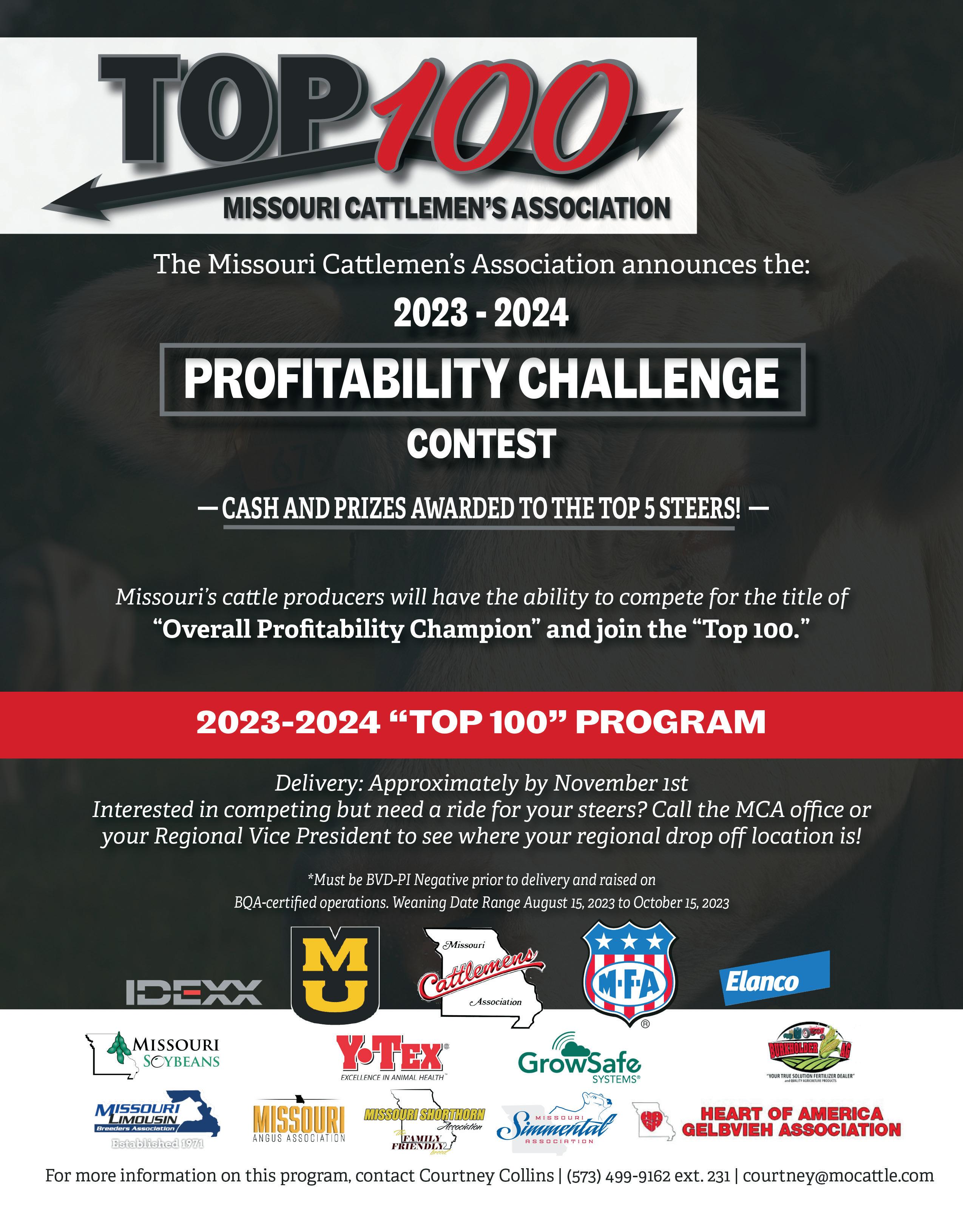
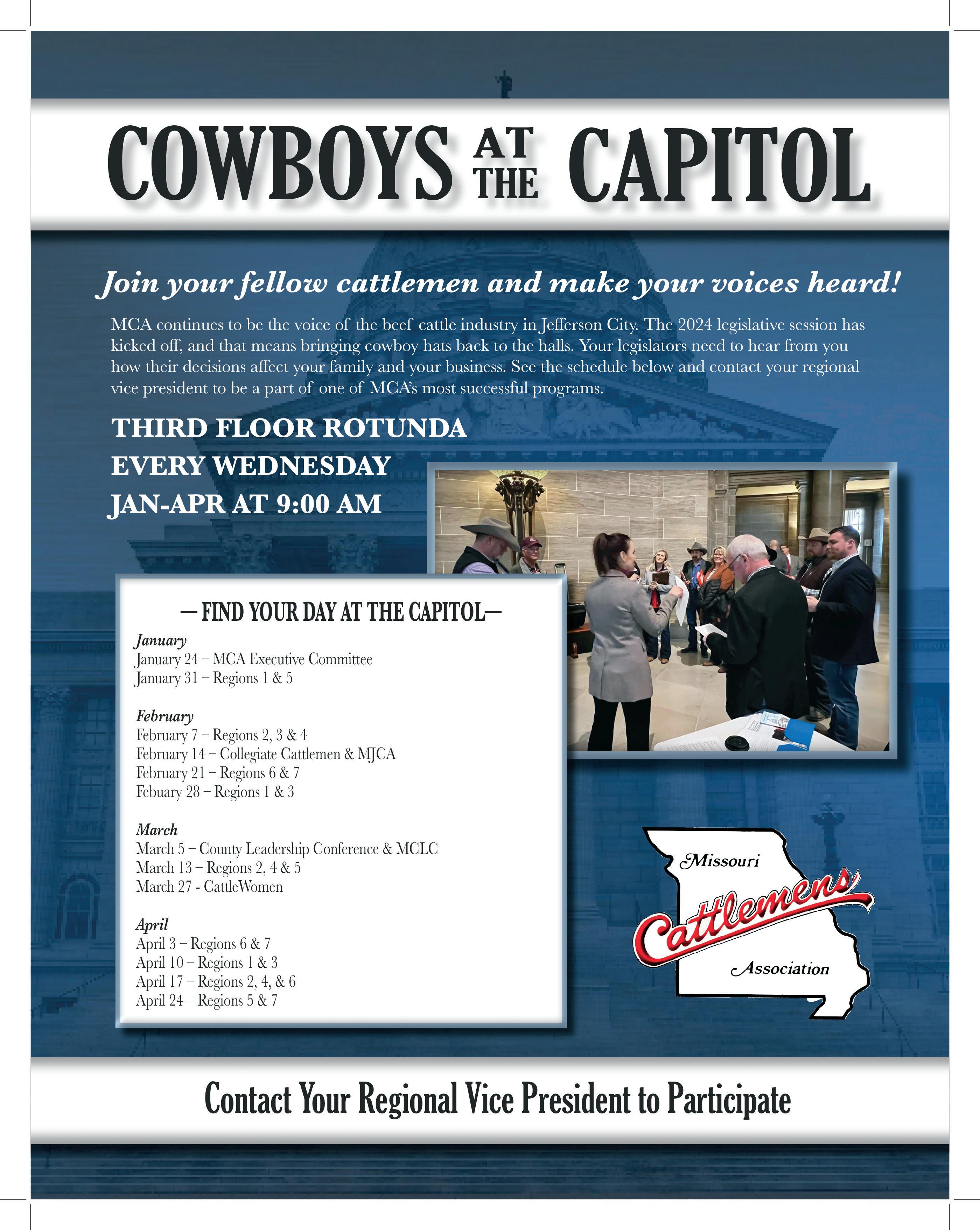


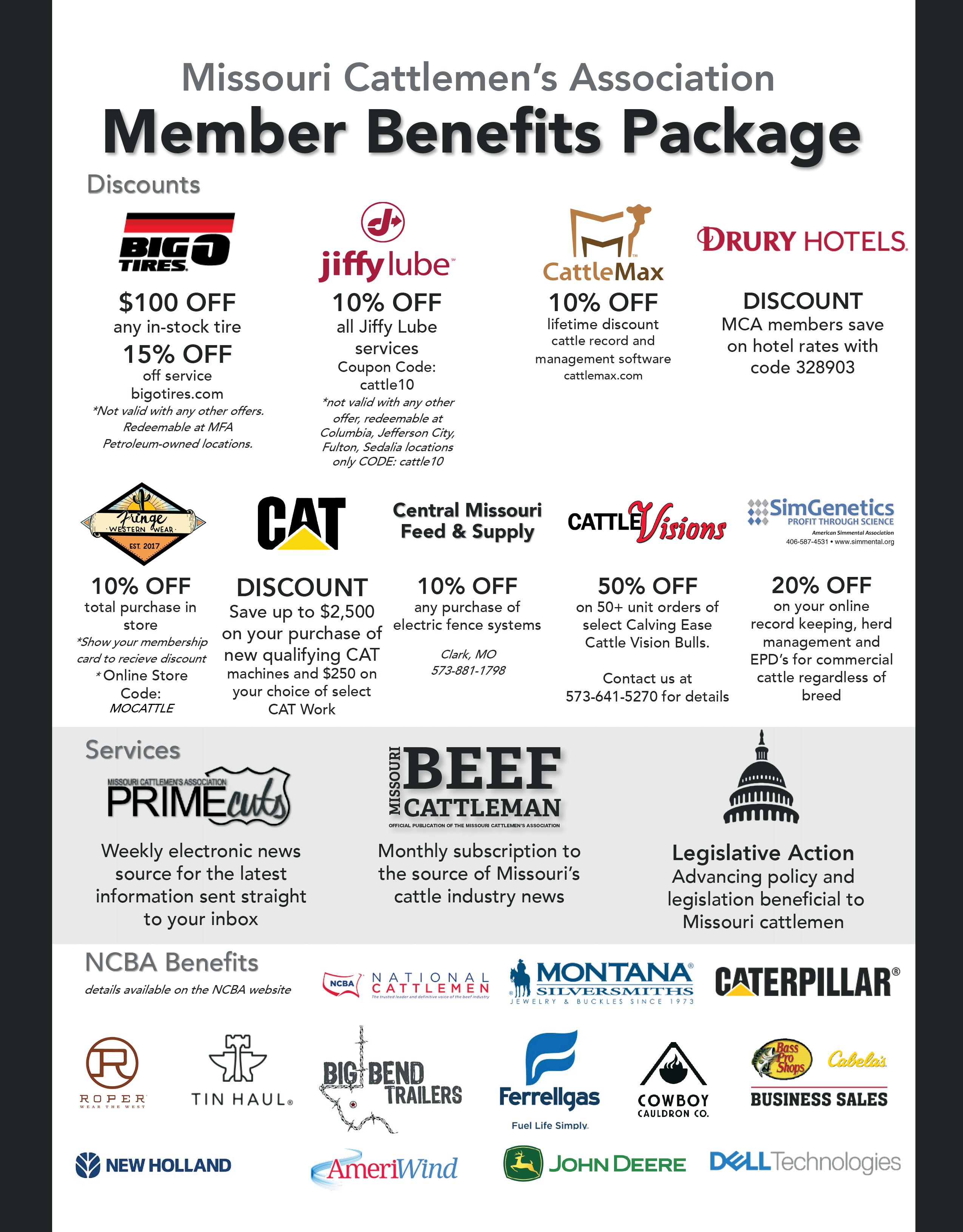
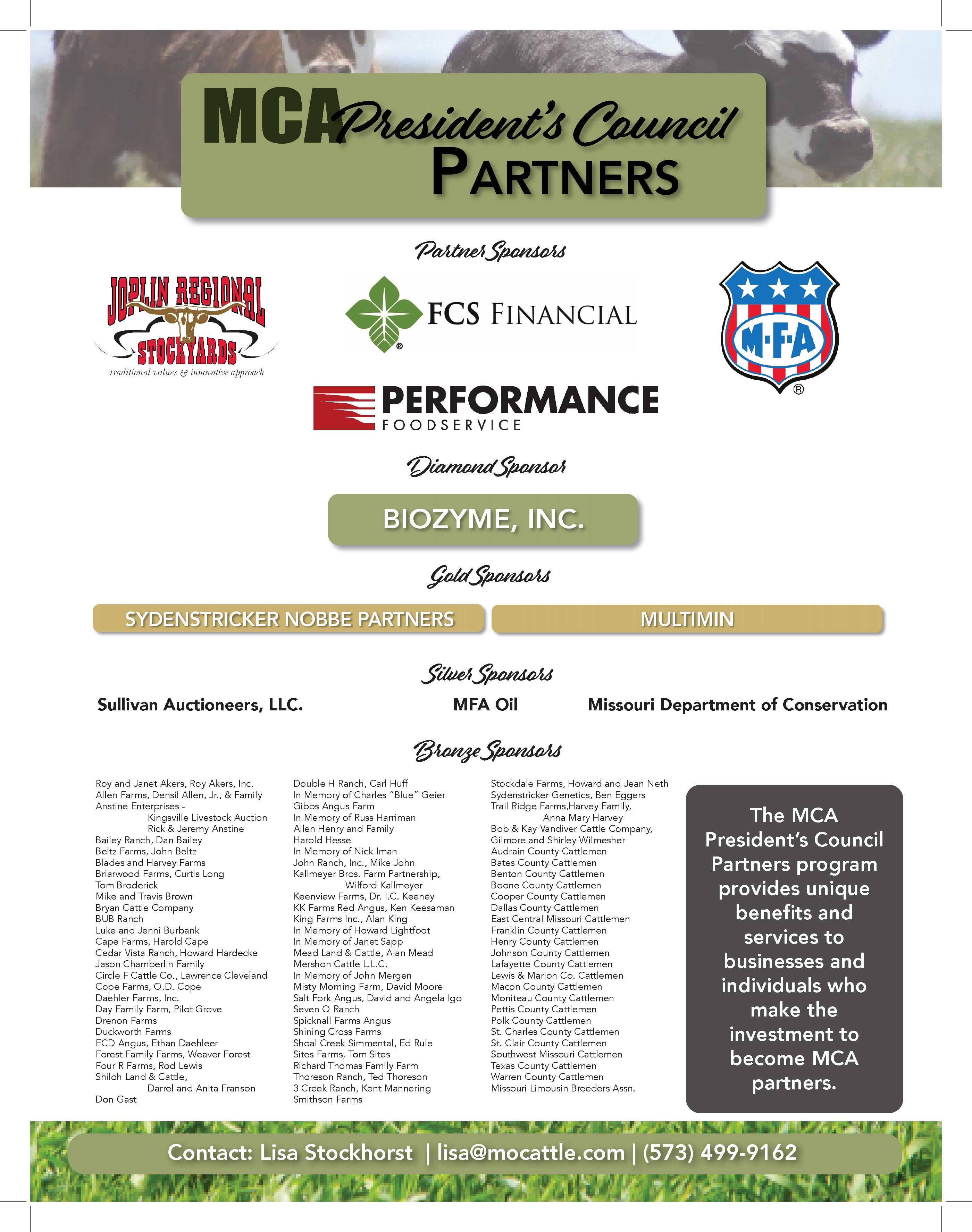


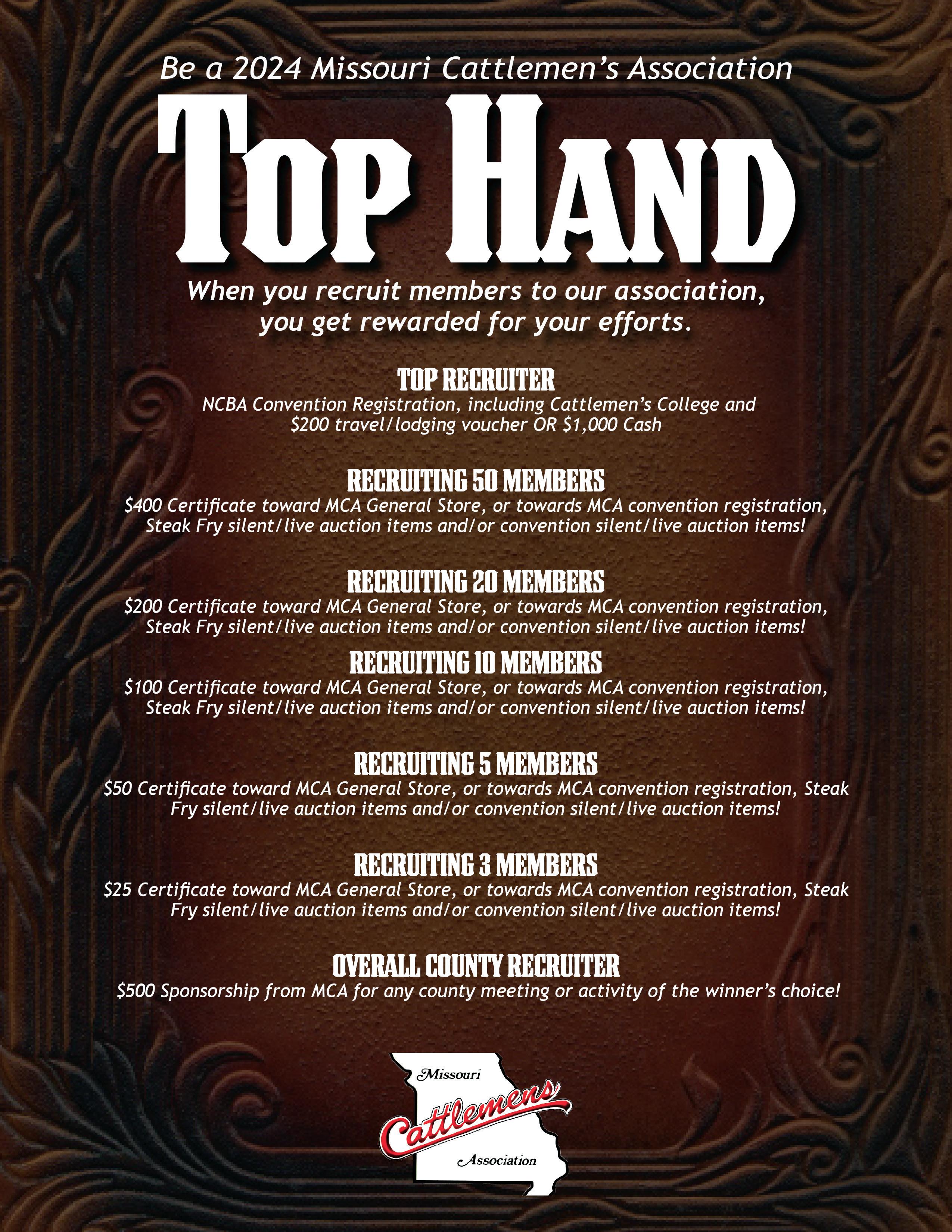

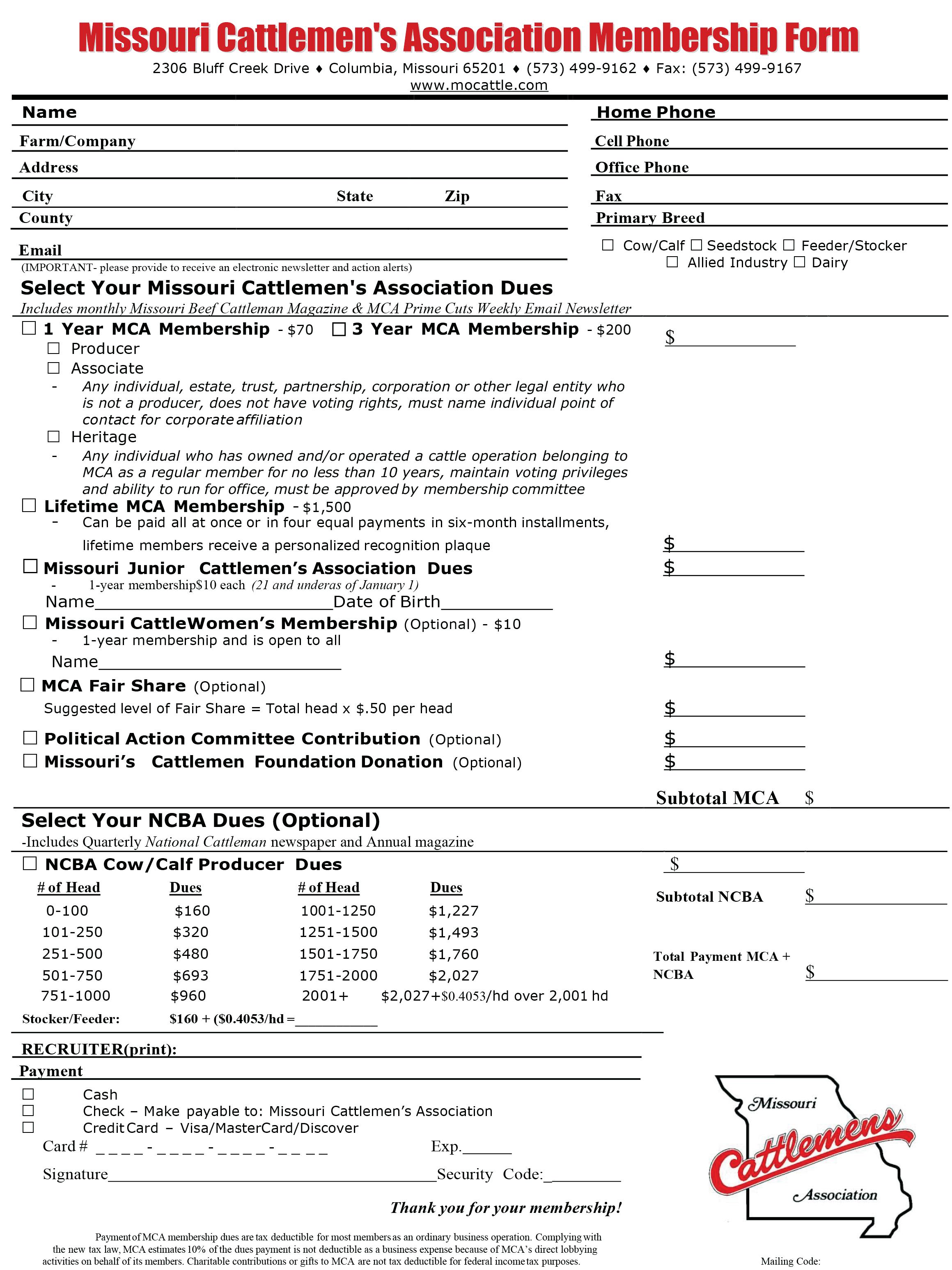
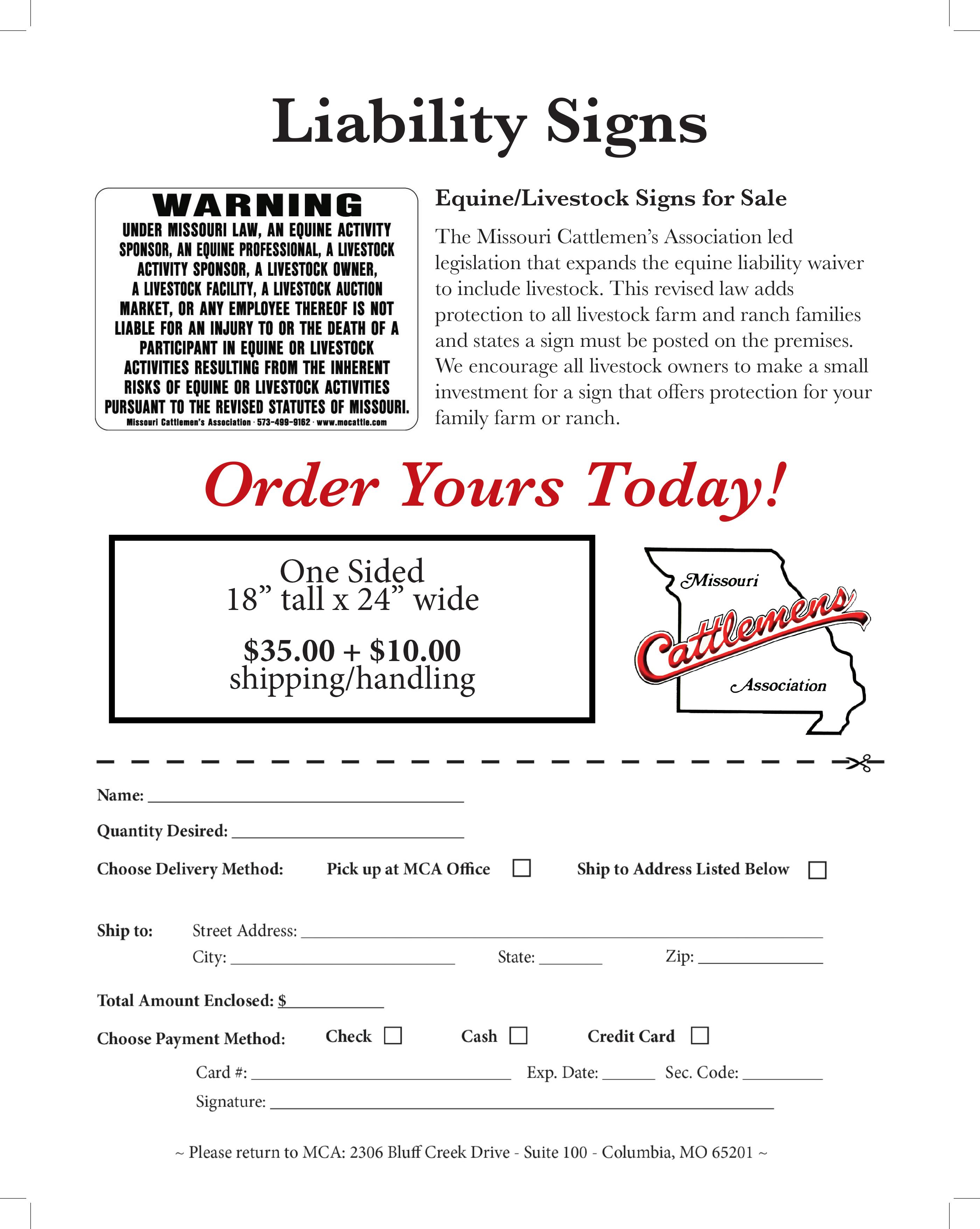

Jamison Herefords Annual Bull Sale
02.23.2024 • Quinter, KS
90 bulls
Post Rock Cattle Co. Cowman’s Kind
Gelbvieh & Balancer Sale
02.24.2024 • Barnard, KS
120 bulls
71 females
Wild
$4,791.00
Express
$4,414.00
Mead Farms Spring Performance Tested Bull Sale
03.02.2024 • Versailles, MO
18 Fall Yearling Bulls ................................Avg. $7,333.00
Total Sale Gross: $132,000
Buck Ridge Cattle Co
03.04.2024 • Seymour, MO.
Hinkle’s Prime Cut Angus
Cows
$3,640.00
Wright Charolais Seventeenth Annual Bull Sale
03.09.2024 • Kearney, MO
79 Fall Yearling Bulls
131 Lots
Total Sale Gross: $1,079,025
Henke Angus Sale
03.14.2024 • Salisbury, MO US 65 Older Bulls
Marshall & Fenner Angus
Valley Oaks Bull Sale
03.16.2024 • Warsaw, MO 49
Benoit Angus 35th Annual Bull Sale
03.21.2024 • Esbon, KS
153 Bulls Avg. $7,902.00
Barrett Cattle & Mill Brae Ranch Annual Bull Sale
03.22.2024 • Maple Hill, KS
115 Angus bulls Avg. $7,008.00
Worthington Angus Spring Production Sale
03.23.2024 • Dadeville, MO
67 Registered Bulls ...................................Avg. $8,753.00
3 Open Heifers .........................................Avg. $2,200.00 17 Bred Heifers ........................................Avg. $3,923.00
22 Bred Cows ...........................................Avg. $3,636.00
18 Spring Pairs Avg. $5,697.00
60 Total Registered Females Avg. $4,264.00
127 Reported Sale Total Avg. $6,632.00
Sandhill Farms Hereford Spring Production Sale
03.23.2024 • Haviland, KS
130 yearling bulls Avg. $8,978.00
30 pairs Avg. $9,308.00
110 Hereford, Black Baldy & Red Baldy Open Heifers Avg. $2,392.00
April 1
Brockmere Sale, New Cambria, MO
April 4 Hunter Angus Show Heifer Sale, Fair Grove, MO
April 5 Meyer Cattle Co. Sale Bowling Green, MO
Apri 5 Cirlce A Closed Cow Sale @ Kingsville Livestock Auction, Kingsville, MO
April 6 Four State Angus Association Sale Springfield, MO
April 6 Gardiner Angus Ranch Spring Production Sale, Ashland, KS
April 6 Peterson Farms Bull Sale, Mountain Grove, MO
April 6 Andras Red Angus Bull Sale, Manchester, IL
April 6 Double A Land & Cattle Co. Herd Dispersal Sale, Nevada, MO
April 6 Shoal Creek Annual Production Sale, Excelsior Springs, MO
April 9 Sydenstricker Genetics Influence Sale, New Cambria, MO
April 9
April 11
Schrader Auctions Ranchland Auction, Ava, MO
HeartBrand Cattle Spring Kick Off Sales Event, online
April 13 Lucas Cattle Co. Sale, Cross Timbers, MO
April 13
Power Performance Pedigree Sale, Mtn. Grove, MO
April 13 Fink Beef Genetics Sale, Randolph, KS
April 13
Ozark & Heart of America Beefmaster Breeders Sale, Springfield, MO
April 15 Jim D. Bellis Family Polled Hereford Production Sale, Aurora, MO
April 18-19 NextGen Cattle Co. Flint Hills Spring Classic Sale, Paxico, KS
April 19
Cirlce A Closed Cow Sale @ Kingsville Livestock Auction, Kingsville, MO
April 20 New Day Genetics Sale, Salem, MO
April 20-22 JDH Wagyu Complete and Total Dispersal Online Sale Event
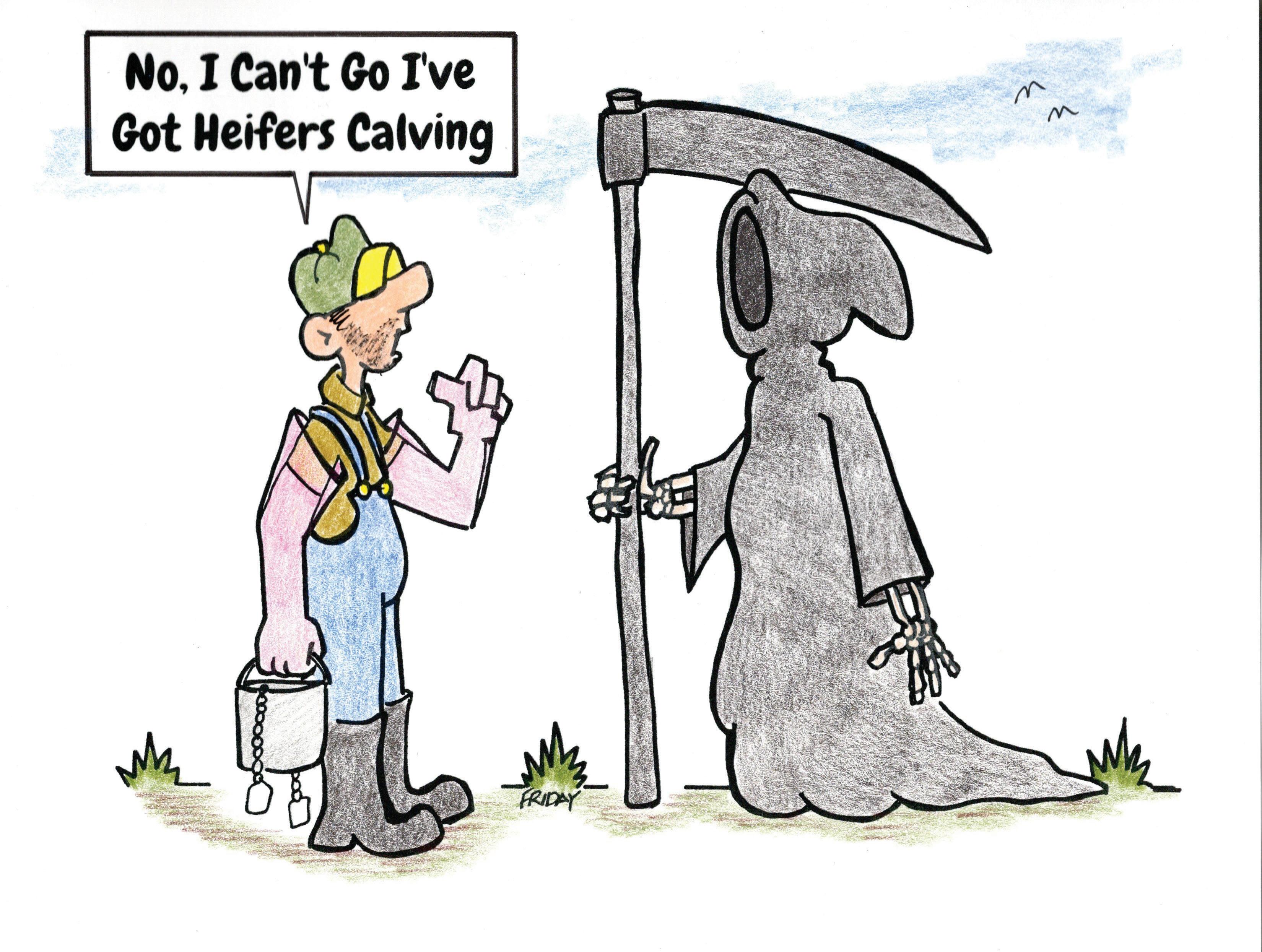
April 27 Heart of the Ozarks Angus Association Sale, West Plains, MO
April 27 Cow Camp Ranch Turn Out Sale, Lost Springs, KS
April 27 19th Annual Great American Pie
Limousin Sale, Lebanon, MO
April 28 Missouri Red Angus Association Sale, Springfield, MO
May 3 Seedstock Plus On-Line Female Sale
May 3 SEMO Show-Me-Select Replacement Heifer Sale, Fruitland, MO
May 4-11 Missouri Beef Days, Bolivar, MO
May 6 Gardiner Angus Ranch Meating Demand Sale, Ashland, KS
May 10 Wild Indian Acres Mature Cow Herd Dispersal Sale, Cuba, MO
May 10 Show-Me-Select Replacement Heifer Sale, Farmington, MO
May 11 Mead Farms Female and Bull Production Sale, Versailles, MO
May 17 SWMO Show-Me-Select Replacement Heifer Sale @ JRS, Carthage, MO
May 18 BQA Workshop @ JRS, Carthage, MO
May 18 Show-Me-Select Replacement Heifer Sale, Kingsville, MO
May 18 Show-Me-Select Replacement Heifer Sale, Vienna, MO
June 1 Show-Me-Select Replacement Heifer Sale, Palmyra MO
June 6-9 Missouri Cattlemen’s Youth Expo, Sedalia, MO
June 8 MJCA Replacement Heifer Sale, Sedalia, MO
June 20 Value-Added Sale @ JRS, Carthage, MO
Oct. 26 Lacy’s Red Angus Sale, Drexel, MO
The MBC Classified column appears monthly. Classified advertising is only 50¢ per word. Send your check with your ad to Missouri Beef Cattleman, P.O. Box 480977, Kansas City, MO 64148. Deadline 15th of month before an issue.
“REESE” DISC MOWERS, CADDY V-RAKES, “REESE” TUBE-LINE BALE WRAPPER, AITCHISON DRILLS, SELF-UNLOADING HAY TRAILERS, HEAVY DUTY BALE AND MINERAL FEEDERS, FEED BUNKS, BALE SPIKES, CONTINUOUS FENCING, COMPLETE CORRAL SYSTEMS, INSTALLATION AVAILABLE: Tigerco Distributing Co. 660-645-2212, 800-432-4020 or www.tigercoinc.com.
BLACK SIMMENTAL BULLS SINCE 1993: Calving Ease, Attractive, Athletic, Sound Footed and Docile. We Deliver. Mike Williams, Higginsville, 816-797-5450
SYCAMORE CREEK SIMANGUS BULLS & BRED HEIFERS FOR SALE. Great EPDs. Wayne and Anita Vanderwert -15 minutes from Columbia. 573-808-3000 or
